CHCECE020 Establish and Implement Plans for Developing Cooperative Behaviour
VerifiedAdded on 2023/06/15
|51
|16198
|233
AI Summary
This assessment evaluates the skills and knowledge required for CHCECE020 Establish and Implement Plans for Developing Cooperative Behaviour. It covers the unit scope, underpinning knowledge, critical aspects, and employability skills. The assessment includes questions related to establishing guidelines for children's behaviour, contributing factors to example scenarios, and more.
Contribute Materials
Your contribution can guide someone’s learning journey. Share your
documents today.
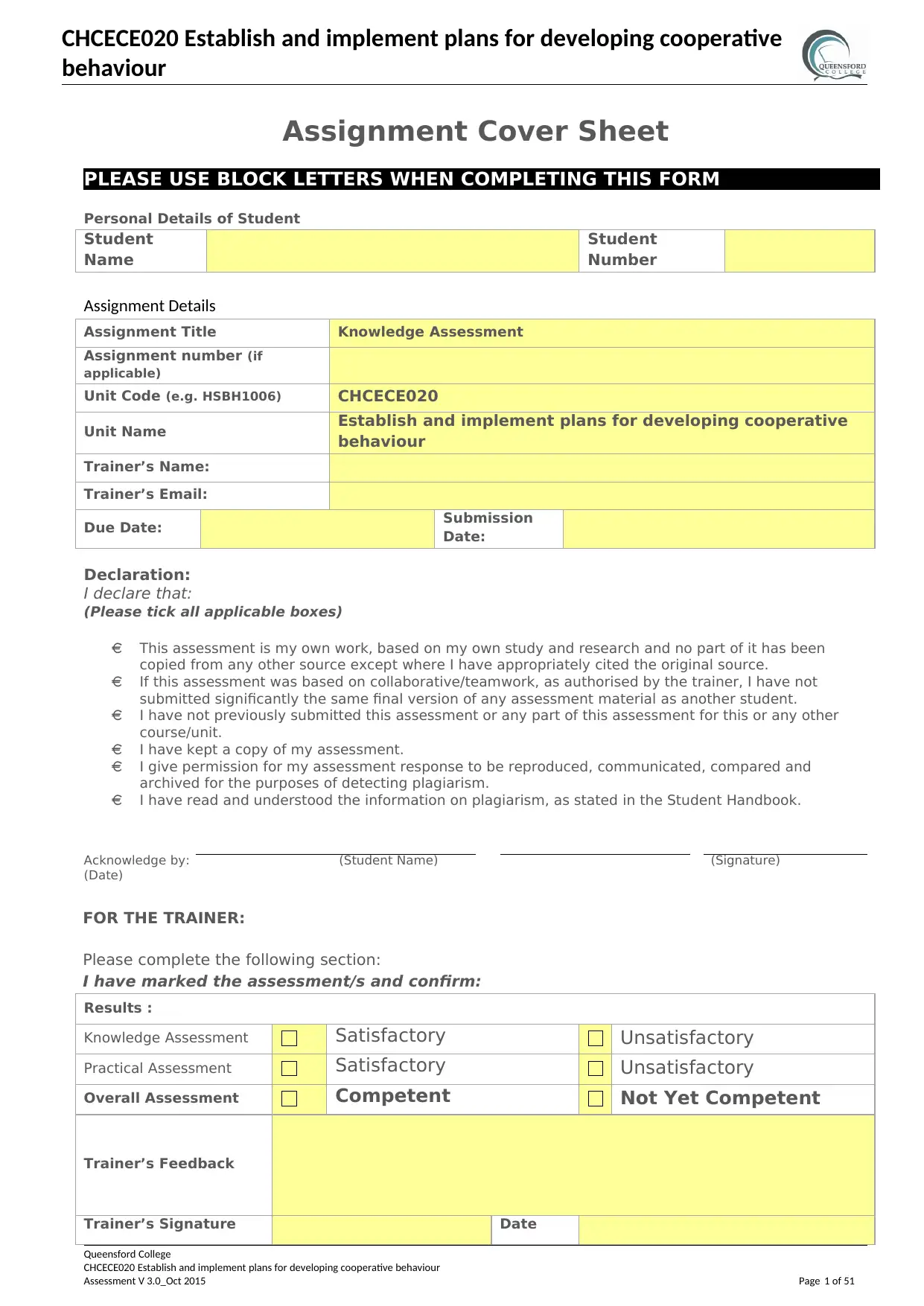
CHCECE020 Establish and implement plans for developing cooperative
behaviour
Assignment Cover Sheet
PLEASE USE BLOCK LETTERS WHEN COMPLETING THIS FORM
Personal Details of Student
Student
Name
Student
Number
Assignment Details
Assignment Title Knowledge Assessment
Assignment number (if
applicable)
Unit Code (e.g. HSBH1006) CHCECE020
Unit Name Establish and implement plans for developing cooperative
behaviour
Trainer’s Name:
Trainer’s Email:
Due Date: Submission
Date:
Declaration:
I declare that:
(Please tick all applicable boxes)
This assessment is my own work, based on my own study and research and no part of it has been
copied from any other source except where I have appropriately cited the original source.
If this assessment was based on collaborative/teamwork, as authorised by the trainer, I have not
submitted significantly the same final version of any assessment material as another student.
I have not previously submitted this assessment or any part of this assessment for this or any other
course/unit.
I have kept a copy of my assessment.
I give permission for my assessment response to be reproduced, communicated, compared and
archived for the purposes of detecting plagiarism.
I have read and understood the information on plagiarism, as stated in the Student Handbook.
Acknowledge by: (Student Name) (Signature)
(Date)
FOR THE TRAINER:
Please complete the following section:
I have marked the assessment/s and confirm:
Results :
Knowledge Assessment Satisfactory Unsatisfactory
Practical Assessment Satisfactory Unsatisfactory
Overall Assessment Competent Not Yet Competent
Trainer’s Feedback
Trainer’s Signature Date
Queensford College
CHCECE020 Establish and implement plans for developing cooperative behaviour
Assessment V 3.0_Oct 2015 Page 1 of 51
behaviour
Assignment Cover Sheet
PLEASE USE BLOCK LETTERS WHEN COMPLETING THIS FORM
Personal Details of Student
Student
Name
Student
Number
Assignment Details
Assignment Title Knowledge Assessment
Assignment number (if
applicable)
Unit Code (e.g. HSBH1006) CHCECE020
Unit Name Establish and implement plans for developing cooperative
behaviour
Trainer’s Name:
Trainer’s Email:
Due Date: Submission
Date:
Declaration:
I declare that:
(Please tick all applicable boxes)
This assessment is my own work, based on my own study and research and no part of it has been
copied from any other source except where I have appropriately cited the original source.
If this assessment was based on collaborative/teamwork, as authorised by the trainer, I have not
submitted significantly the same final version of any assessment material as another student.
I have not previously submitted this assessment or any part of this assessment for this or any other
course/unit.
I have kept a copy of my assessment.
I give permission for my assessment response to be reproduced, communicated, compared and
archived for the purposes of detecting plagiarism.
I have read and understood the information on plagiarism, as stated in the Student Handbook.
Acknowledge by: (Student Name) (Signature)
(Date)
FOR THE TRAINER:
Please complete the following section:
I have marked the assessment/s and confirm:
Results :
Knowledge Assessment Satisfactory Unsatisfactory
Practical Assessment Satisfactory Unsatisfactory
Overall Assessment Competent Not Yet Competent
Trainer’s Feedback
Trainer’s Signature Date
Queensford College
CHCECE020 Establish and implement plans for developing cooperative behaviour
Assessment V 3.0_Oct 2015 Page 1 of 51
Secure Best Marks with AI Grader
Need help grading? Try our AI Grader for instant feedback on your assignments.
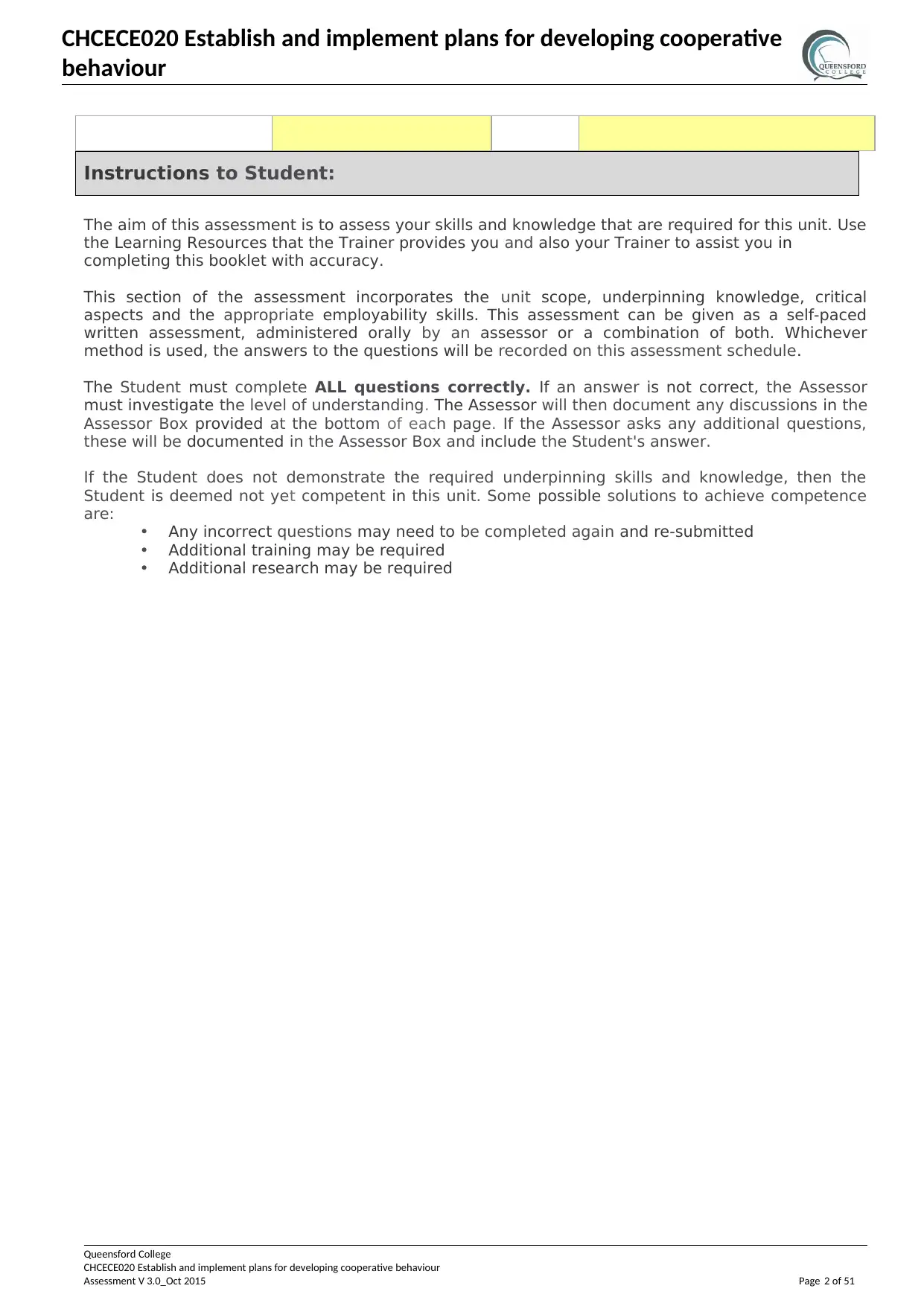
CHCECE020 Establish and implement plans for developing cooperative
behaviour
Instructions to Student:
The aim of this assessment is to assess your skills and knowledge that are required for this unit. Use
the Learning Resources that the Trainer provides you and also your Trainer to assist you in
completing this booklet with accuracy.
This section of the assessment incorporates the unit scope, underpinning knowledge, critical
aspects and the appropriate employability skills. This assessment can be given as a self-paced
written assessment, administered orally by an assessor or a combination of both. Whichever
method is used, the answers to the questions will be recorded on this assessment schedule.
The Student must complete ALL questions correctly. If an answer is not correct, the Assessor
must investigate the level of understanding. The Assessor will then document any discussions in the
Assessor Box provided at the bottom of each page. If the Assessor asks any additional questions,
these will be documented in the Assessor Box and include the Student's answer.
If the Student does not demonstrate the required underpinning skills and knowledge, then the
Student is deemed not yet competent in this unit. Some possible solutions to achieve competence
are:
• Any incorrect questions may need to be completed again and re-submitted
• Additional training may be required
• Additional research may be required
Queensford College
CHCECE020 Establish and implement plans for developing cooperative behaviour
Assessment V 3.0_Oct 2015 Page 2 of 51
behaviour
Instructions to Student:
The aim of this assessment is to assess your skills and knowledge that are required for this unit. Use
the Learning Resources that the Trainer provides you and also your Trainer to assist you in
completing this booklet with accuracy.
This section of the assessment incorporates the unit scope, underpinning knowledge, critical
aspects and the appropriate employability skills. This assessment can be given as a self-paced
written assessment, administered orally by an assessor or a combination of both. Whichever
method is used, the answers to the questions will be recorded on this assessment schedule.
The Student must complete ALL questions correctly. If an answer is not correct, the Assessor
must investigate the level of understanding. The Assessor will then document any discussions in the
Assessor Box provided at the bottom of each page. If the Assessor asks any additional questions,
these will be documented in the Assessor Box and include the Student's answer.
If the Student does not demonstrate the required underpinning skills and knowledge, then the
Student is deemed not yet competent in this unit. Some possible solutions to achieve competence
are:
• Any incorrect questions may need to be completed again and re-submitted
• Additional training may be required
• Additional research may be required
Queensford College
CHCECE020 Establish and implement plans for developing cooperative behaviour
Assessment V 3.0_Oct 2015 Page 2 of 51
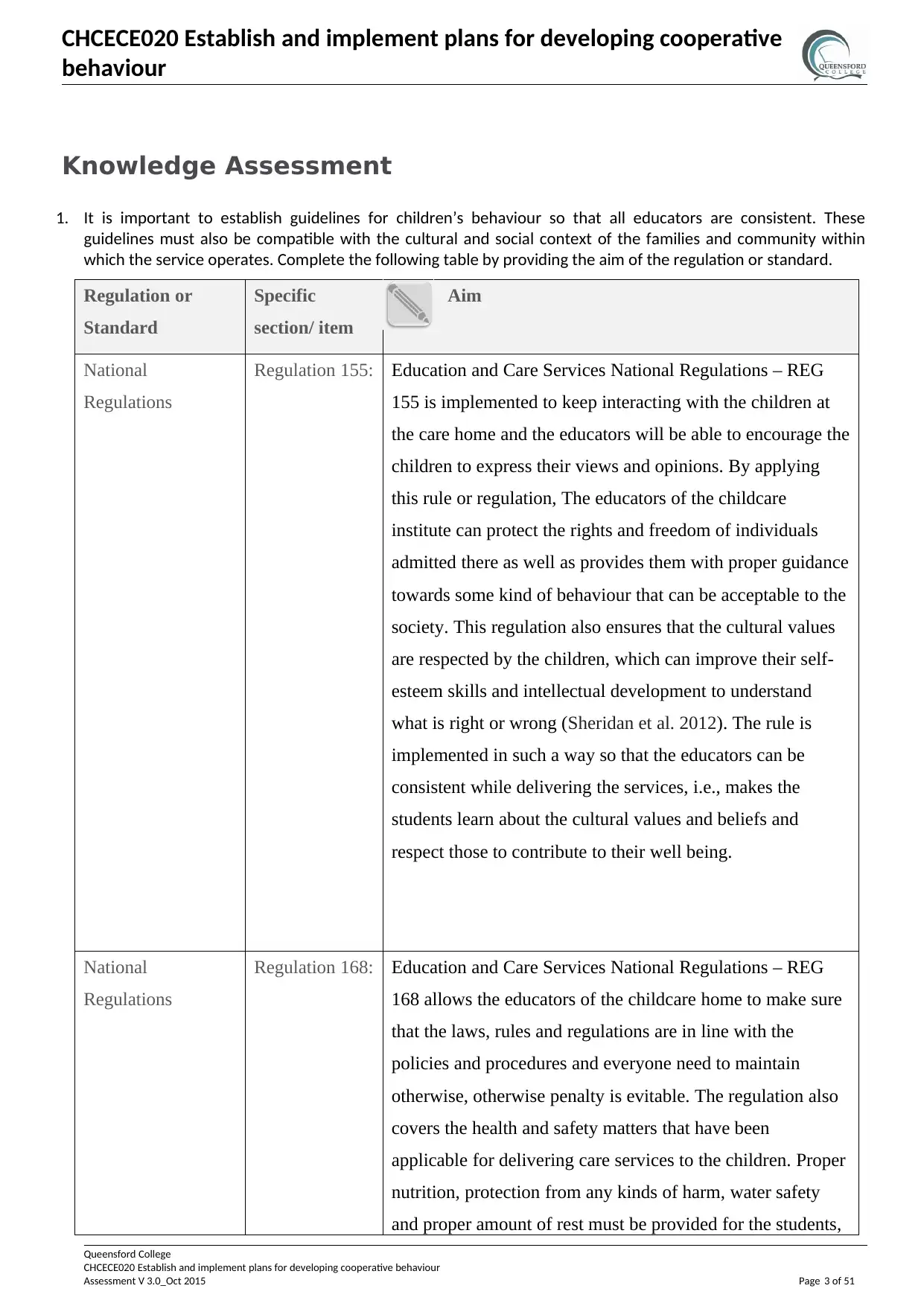
CHCECE020 Establish and implement plans for developing cooperative
behaviour
Knowledge Assessment
1. It is important to establish guidelines for children’s behaviour so that all educators are consistent. These
guidelines must also be compatible with the cultural and social context of the families and community within
which the service operates. Complete the following table by providing the aim of the regulation or standard.
Regulation or
Standard
Specific
section/ item
Aim
National
Regulations
Regulation 155: Education and Care Services National Regulations – REG
155 is implemented to keep interacting with the children at
the care home and the educators will be able to encourage the
children to express their views and opinions. By applying
this rule or regulation, The educators of the childcare
institute can protect the rights and freedom of individuals
admitted there as well as provides them with proper guidance
towards some kind of behaviour that can be acceptable to the
society. This regulation also ensures that the cultural values
are respected by the children, which can improve their self-
esteem skills and intellectual development to understand
what is right or wrong (Sheridan et al. 2012). The rule is
implemented in such a way so that the educators can be
consistent while delivering the services, i.e., makes the
students learn about the cultural values and beliefs and
respect those to contribute to their well being.
National
Regulations
Regulation 168: Education and Care Services National Regulations – REG
168 allows the educators of the childcare home to make sure
that the laws, rules and regulations are in line with the
policies and procedures and everyone need to maintain
otherwise, otherwise penalty is evitable. The regulation also
covers the health and safety matters that have been
applicable for delivering care services to the children. Proper
nutrition, protection from any kinds of harm, water safety
and proper amount of rest must be provided for the students,
Queensford College
CHCECE020 Establish and implement plans for developing cooperative behaviour
Assessment V 3.0_Oct 2015 Page 3 of 51
behaviour
Knowledge Assessment
1. It is important to establish guidelines for children’s behaviour so that all educators are consistent. These
guidelines must also be compatible with the cultural and social context of the families and community within
which the service operates. Complete the following table by providing the aim of the regulation or standard.
Regulation or
Standard
Specific
section/ item
Aim
National
Regulations
Regulation 155: Education and Care Services National Regulations – REG
155 is implemented to keep interacting with the children at
the care home and the educators will be able to encourage the
children to express their views and opinions. By applying
this rule or regulation, The educators of the childcare
institute can protect the rights and freedom of individuals
admitted there as well as provides them with proper guidance
towards some kind of behaviour that can be acceptable to the
society. This regulation also ensures that the cultural values
are respected by the children, which can improve their self-
esteem skills and intellectual development to understand
what is right or wrong (Sheridan et al. 2012). The rule is
implemented in such a way so that the educators can be
consistent while delivering the services, i.e., makes the
students learn about the cultural values and beliefs and
respect those to contribute to their well being.
National
Regulations
Regulation 168: Education and Care Services National Regulations – REG
168 allows the educators of the childcare home to make sure
that the laws, rules and regulations are in line with the
policies and procedures and everyone need to maintain
otherwise, otherwise penalty is evitable. The regulation also
covers the health and safety matters that have been
applicable for delivering care services to the children. Proper
nutrition, protection from any kinds of harm, water safety
and proper amount of rest must be provided for the students,
Queensford College
CHCECE020 Establish and implement plans for developing cooperative behaviour
Assessment V 3.0_Oct 2015 Page 3 of 51
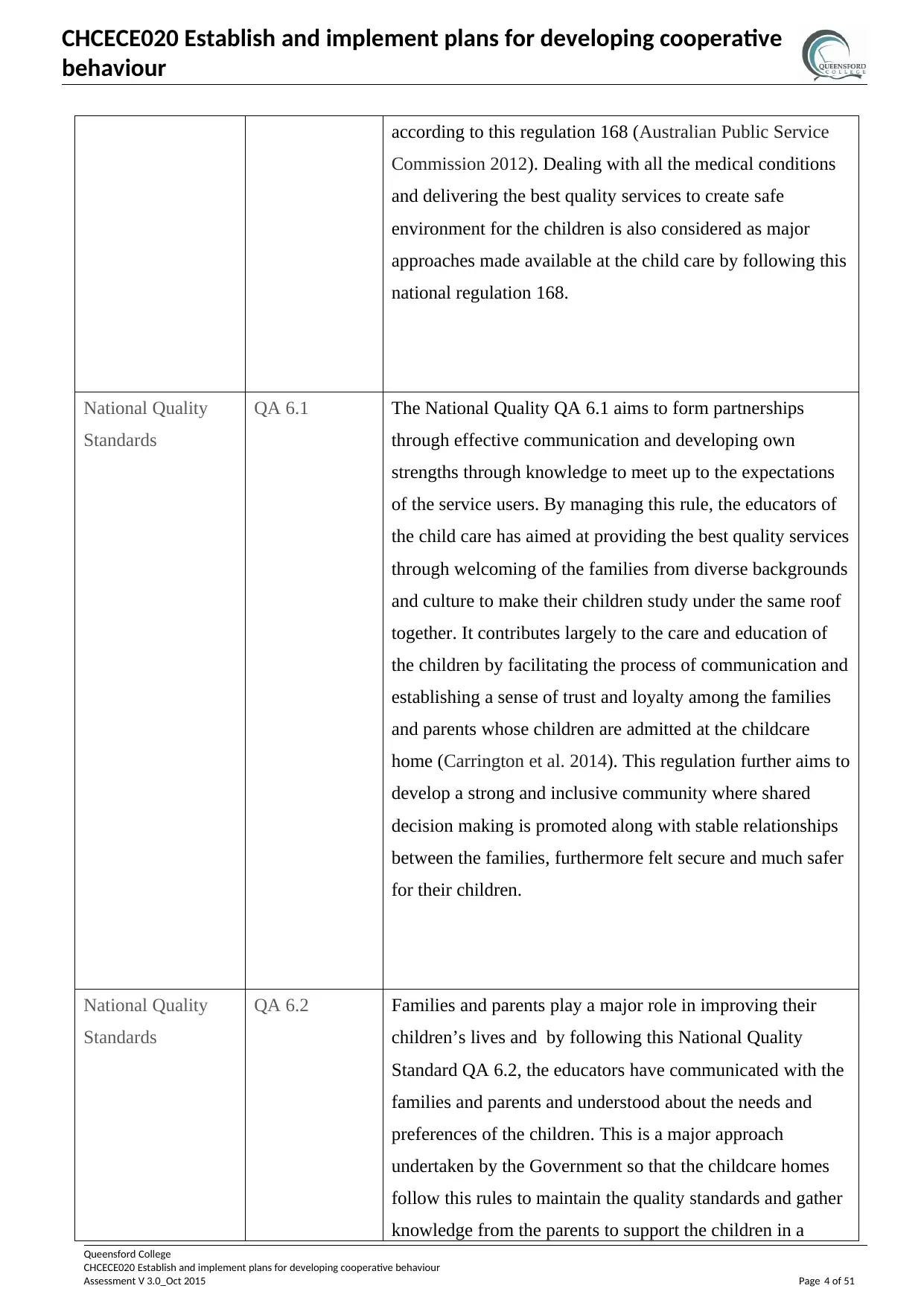
CHCECE020 Establish and implement plans for developing cooperative
behaviour
according to this regulation 168 (Australian Public Service
Commission 2012). Dealing with all the medical conditions
and delivering the best quality services to create safe
environment for the children is also considered as major
approaches made available at the child care by following this
national regulation 168.
National Quality
Standards
QA 6.1 The National Quality QA 6.1 aims to form partnerships
through effective communication and developing own
strengths through knowledge to meet up to the expectations
of the service users. By managing this rule, the educators of
the child care has aimed at providing the best quality services
through welcoming of the families from diverse backgrounds
and culture to make their children study under the same roof
together. It contributes largely to the care and education of
the children by facilitating the process of communication and
establishing a sense of trust and loyalty among the families
and parents whose children are admitted at the childcare
home (Carrington et al. 2014). This regulation further aims to
develop a strong and inclusive community where shared
decision making is promoted along with stable relationships
between the families, furthermore felt secure and much safer
for their children.
National Quality
Standards
QA 6.2 Families and parents play a major role in improving their
children’s lives and by following this National Quality
Standard QA 6.2, the educators have communicated with the
families and parents and understood about the needs and
preferences of the children. This is a major approach
undertaken by the Government so that the childcare homes
follow this rules to maintain the quality standards and gather
knowledge from the parents to support the children in a
Queensford College
CHCECE020 Establish and implement plans for developing cooperative behaviour
Assessment V 3.0_Oct 2015 Page 4 of 51
behaviour
according to this regulation 168 (Australian Public Service
Commission 2012). Dealing with all the medical conditions
and delivering the best quality services to create safe
environment for the children is also considered as major
approaches made available at the child care by following this
national regulation 168.
National Quality
Standards
QA 6.1 The National Quality QA 6.1 aims to form partnerships
through effective communication and developing own
strengths through knowledge to meet up to the expectations
of the service users. By managing this rule, the educators of
the child care has aimed at providing the best quality services
through welcoming of the families from diverse backgrounds
and culture to make their children study under the same roof
together. It contributes largely to the care and education of
the children by facilitating the process of communication and
establishing a sense of trust and loyalty among the families
and parents whose children are admitted at the childcare
home (Carrington et al. 2014). This regulation further aims to
develop a strong and inclusive community where shared
decision making is promoted along with stable relationships
between the families, furthermore felt secure and much safer
for their children.
National Quality
Standards
QA 6.2 Families and parents play a major role in improving their
children’s lives and by following this National Quality
Standard QA 6.2, the educators have communicated with the
families and parents and understood about the needs and
preferences of the children. This is a major approach
undertaken by the Government so that the childcare homes
follow this rules to maintain the quality standards and gather
knowledge from the parents to support the children in a
Queensford College
CHCECE020 Establish and implement plans for developing cooperative behaviour
Assessment V 3.0_Oct 2015 Page 4 of 51
Secure Best Marks with AI Grader
Need help grading? Try our AI Grader for instant feedback on your assignments.
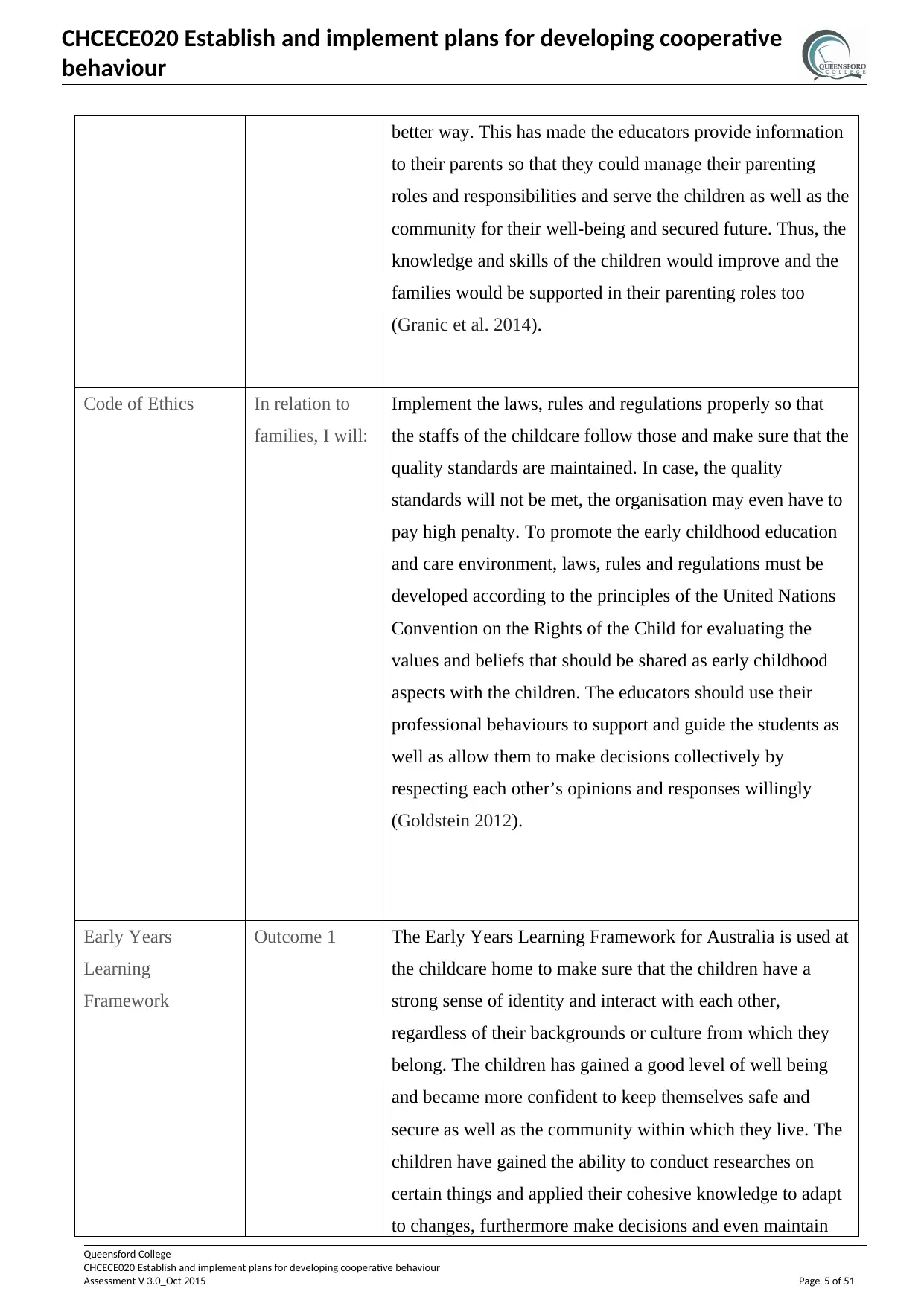
CHCECE020 Establish and implement plans for developing cooperative
behaviour
better way. This has made the educators provide information
to their parents so that they could manage their parenting
roles and responsibilities and serve the children as well as the
community for their well-being and secured future. Thus, the
knowledge and skills of the children would improve and the
families would be supported in their parenting roles too
(Granic et al. 2014).
Code of Ethics In relation to
families, I will:
Implement the laws, rules and regulations properly so that
the staffs of the childcare follow those and make sure that the
quality standards are maintained. In case, the quality
standards will not be met, the organisation may even have to
pay high penalty. To promote the early childhood education
and care environment, laws, rules and regulations must be
developed according to the principles of the United Nations
Convention on the Rights of the Child for evaluating the
values and beliefs that should be shared as early childhood
aspects with the children. The educators should use their
professional behaviours to support and guide the students as
well as allow them to make decisions collectively by
respecting each other’s opinions and responses willingly
(Goldstein 2012).
Early Years
Learning
Framework
Outcome 1 The Early Years Learning Framework for Australia is used at
the childcare home to make sure that the children have a
strong sense of identity and interact with each other,
regardless of their backgrounds or culture from which they
belong. The children has gained a good level of well being
and became more confident to keep themselves safe and
secure as well as the community within which they live. The
children have gained the ability to conduct researches on
certain things and applied their cohesive knowledge to adapt
to changes, furthermore make decisions and even maintain
Queensford College
CHCECE020 Establish and implement plans for developing cooperative behaviour
Assessment V 3.0_Oct 2015 Page 5 of 51
behaviour
better way. This has made the educators provide information
to their parents so that they could manage their parenting
roles and responsibilities and serve the children as well as the
community for their well-being and secured future. Thus, the
knowledge and skills of the children would improve and the
families would be supported in their parenting roles too
(Granic et al. 2014).
Code of Ethics In relation to
families, I will:
Implement the laws, rules and regulations properly so that
the staffs of the childcare follow those and make sure that the
quality standards are maintained. In case, the quality
standards will not be met, the organisation may even have to
pay high penalty. To promote the early childhood education
and care environment, laws, rules and regulations must be
developed according to the principles of the United Nations
Convention on the Rights of the Child for evaluating the
values and beliefs that should be shared as early childhood
aspects with the children. The educators should use their
professional behaviours to support and guide the students as
well as allow them to make decisions collectively by
respecting each other’s opinions and responses willingly
(Goldstein 2012).
Early Years
Learning
Framework
Outcome 1 The Early Years Learning Framework for Australia is used at
the childcare home to make sure that the children have a
strong sense of identity and interact with each other,
regardless of their backgrounds or culture from which they
belong. The children has gained a good level of well being
and became more confident to keep themselves safe and
secure as well as the community within which they live. The
children have gained the ability to conduct researches on
certain things and applied their cohesive knowledge to adapt
to changes, furthermore make decisions and even maintain
Queensford College
CHCECE020 Establish and implement plans for developing cooperative behaviour
Assessment V 3.0_Oct 2015 Page 5 of 51
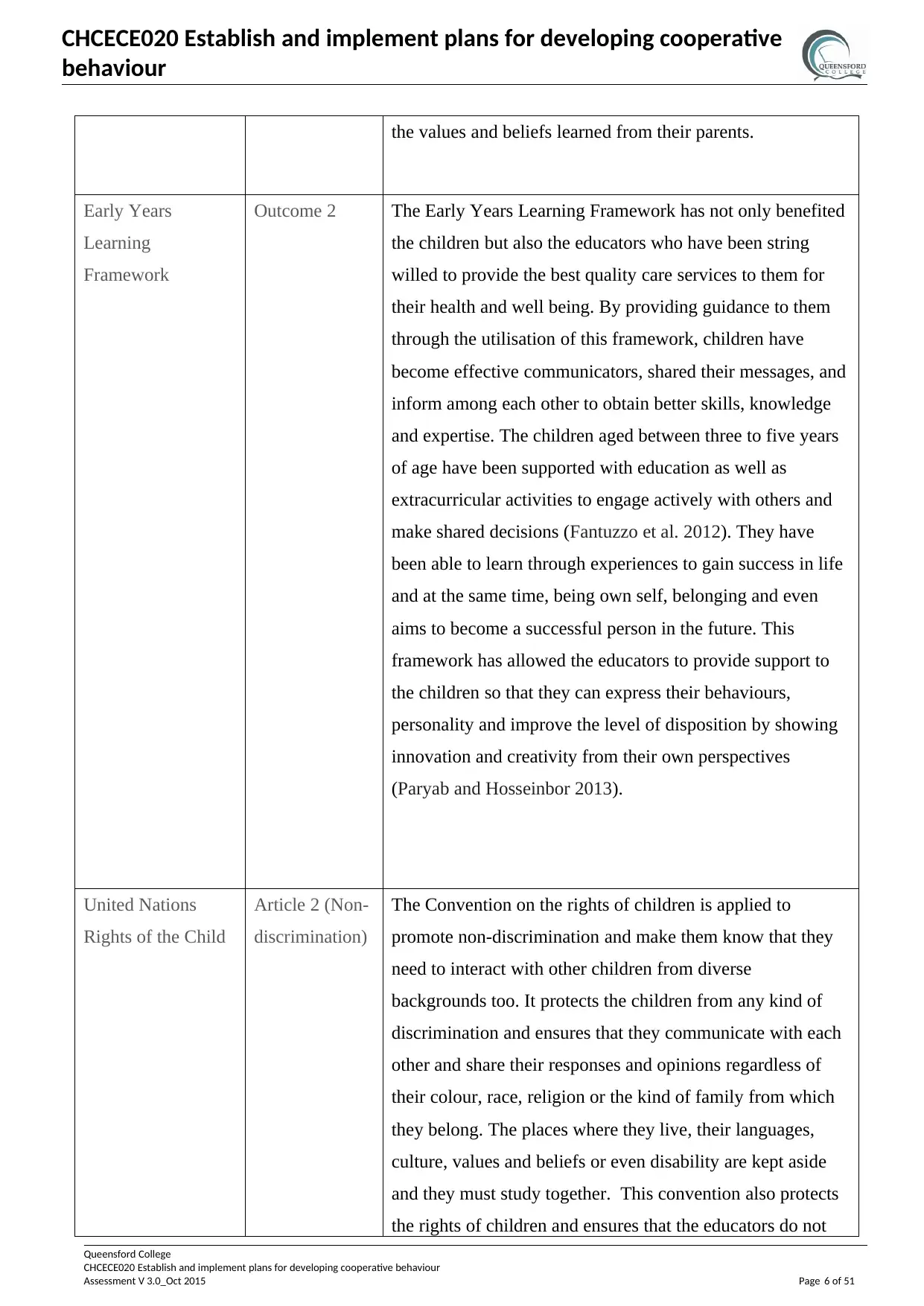
CHCECE020 Establish and implement plans for developing cooperative
behaviour
the values and beliefs learned from their parents.
Early Years
Learning
Framework
Outcome 2 The Early Years Learning Framework has not only benefited
the children but also the educators who have been string
willed to provide the best quality care services to them for
their health and well being. By providing guidance to them
through the utilisation of this framework, children have
become effective communicators, shared their messages, and
inform among each other to obtain better skills, knowledge
and expertise. The children aged between three to five years
of age have been supported with education as well as
extracurricular activities to engage actively with others and
make shared decisions (Fantuzzo et al. 2012). They have
been able to learn through experiences to gain success in life
and at the same time, being own self, belonging and even
aims to become a successful person in the future. This
framework has allowed the educators to provide support to
the children so that they can express their behaviours,
personality and improve the level of disposition by showing
innovation and creativity from their own perspectives
(Paryab and Hosseinbor 2013).
United Nations
Rights of the Child
Article 2 (Non-
discrimination)
The Convention on the rights of children is applied to
promote non-discrimination and make them know that they
need to interact with other children from diverse
backgrounds too. It protects the children from any kind of
discrimination and ensures that they communicate with each
other and share their responses and opinions regardless of
their colour, race, religion or the kind of family from which
they belong. The places where they live, their languages,
culture, values and beliefs or even disability are kept aside
and they must study together. This convention also protects
the rights of children and ensures that the educators do not
Queensford College
CHCECE020 Establish and implement plans for developing cooperative behaviour
Assessment V 3.0_Oct 2015 Page 6 of 51
behaviour
the values and beliefs learned from their parents.
Early Years
Learning
Framework
Outcome 2 The Early Years Learning Framework has not only benefited
the children but also the educators who have been string
willed to provide the best quality care services to them for
their health and well being. By providing guidance to them
through the utilisation of this framework, children have
become effective communicators, shared their messages, and
inform among each other to obtain better skills, knowledge
and expertise. The children aged between three to five years
of age have been supported with education as well as
extracurricular activities to engage actively with others and
make shared decisions (Fantuzzo et al. 2012). They have
been able to learn through experiences to gain success in life
and at the same time, being own self, belonging and even
aims to become a successful person in the future. This
framework has allowed the educators to provide support to
the children so that they can express their behaviours,
personality and improve the level of disposition by showing
innovation and creativity from their own perspectives
(Paryab and Hosseinbor 2013).
United Nations
Rights of the Child
Article 2 (Non-
discrimination)
The Convention on the rights of children is applied to
promote non-discrimination and make them know that they
need to interact with other children from diverse
backgrounds too. It protects the children from any kind of
discrimination and ensures that they communicate with each
other and share their responses and opinions regardless of
their colour, race, religion or the kind of family from which
they belong. The places where they live, their languages,
culture, values and beliefs or even disability are kept aside
and they must study together. This convention also protects
the rights of children and ensures that the educators do not
Queensford College
CHCECE020 Establish and implement plans for developing cooperative behaviour
Assessment V 3.0_Oct 2015 Page 6 of 51
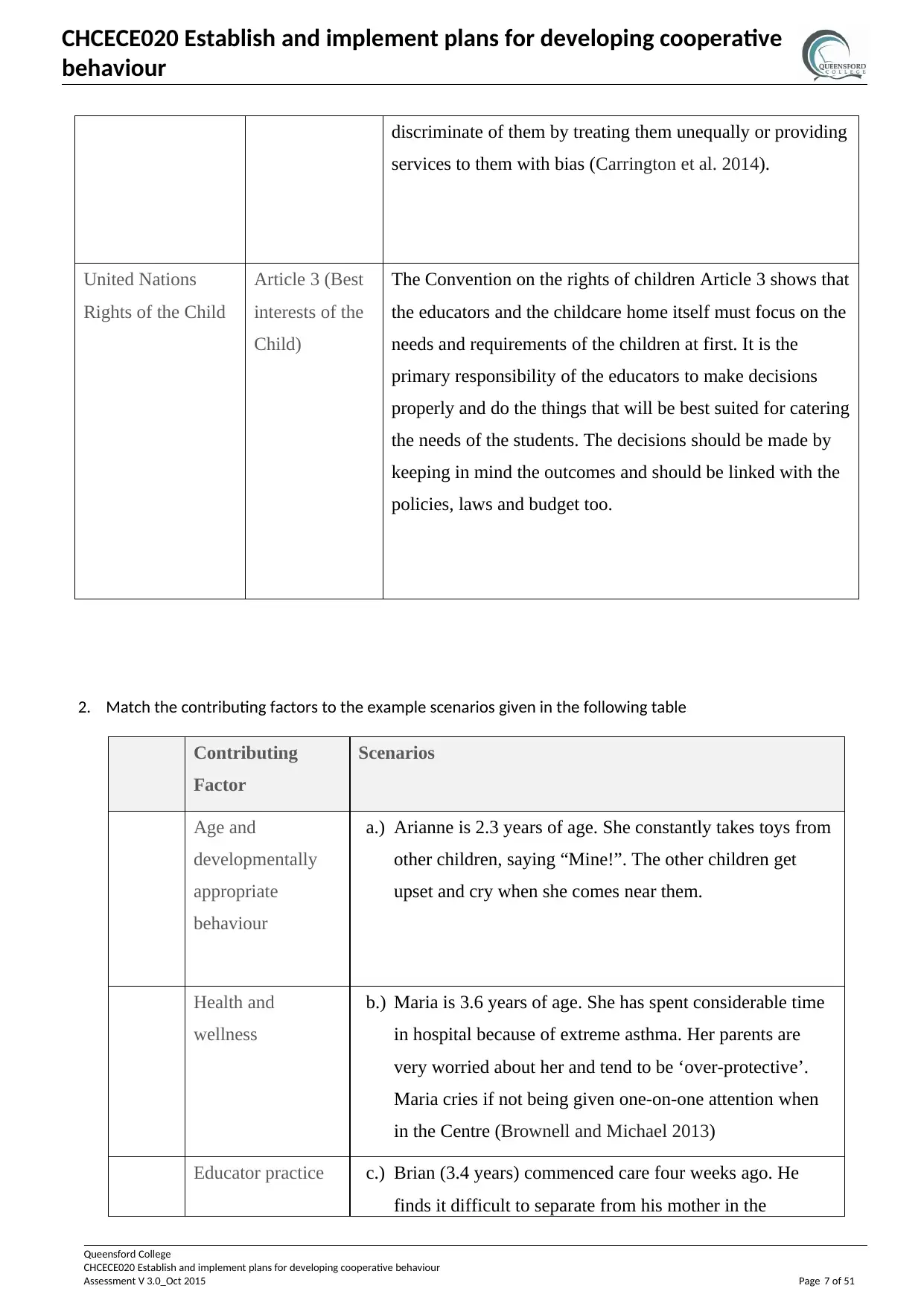
CHCECE020 Establish and implement plans for developing cooperative
behaviour
discriminate of them by treating them unequally or providing
services to them with bias (Carrington et al. 2014).
United Nations
Rights of the Child
Article 3 (Best
interests of the
Child)
The Convention on the rights of children Article 3 shows that
the educators and the childcare home itself must focus on the
needs and requirements of the children at first. It is the
primary responsibility of the educators to make decisions
properly and do the things that will be best suited for catering
the needs of the students. The decisions should be made by
keeping in mind the outcomes and should be linked with the
policies, laws and budget too.
2. Match the contributing factors to the example scenarios given in the following table
Contributing
Factor
Scenarios
Age and
developmentally
appropriate
behaviour
a.) Arianne is 2.3 years of age. She constantly takes toys from
other children, saying “Mine!”. The other children get
upset and cry when she comes near them.
Health and
wellness
b.) Maria is 3.6 years of age. She has spent considerable time
in hospital because of extreme asthma. Her parents are
very worried about her and tend to be ‘over-protective’.
Maria cries if not being given one-on-one attention when
in the Centre (Brownell and Michael 2013)
Educator practice c.) Brian (3.4 years) commenced care four weeks ago. He
finds it difficult to separate from his mother in the
Queensford College
CHCECE020 Establish and implement plans for developing cooperative behaviour
Assessment V 3.0_Oct 2015 Page 7 of 51
behaviour
discriminate of them by treating them unequally or providing
services to them with bias (Carrington et al. 2014).
United Nations
Rights of the Child
Article 3 (Best
interests of the
Child)
The Convention on the rights of children Article 3 shows that
the educators and the childcare home itself must focus on the
needs and requirements of the children at first. It is the
primary responsibility of the educators to make decisions
properly and do the things that will be best suited for catering
the needs of the students. The decisions should be made by
keeping in mind the outcomes and should be linked with the
policies, laws and budget too.
2. Match the contributing factors to the example scenarios given in the following table
Contributing
Factor
Scenarios
Age and
developmentally
appropriate
behaviour
a.) Arianne is 2.3 years of age. She constantly takes toys from
other children, saying “Mine!”. The other children get
upset and cry when she comes near them.
Health and
wellness
b.) Maria is 3.6 years of age. She has spent considerable time
in hospital because of extreme asthma. Her parents are
very worried about her and tend to be ‘over-protective’.
Maria cries if not being given one-on-one attention when
in the Centre (Brownell and Michael 2013)
Educator practice c.) Brian (3.4 years) commenced care four weeks ago. He
finds it difficult to separate from his mother in the
Queensford College
CHCECE020 Establish and implement plans for developing cooperative behaviour
Assessment V 3.0_Oct 2015 Page 7 of 51
Paraphrase This Document
Need a fresh take? Get an instant paraphrase of this document with our AI Paraphraser
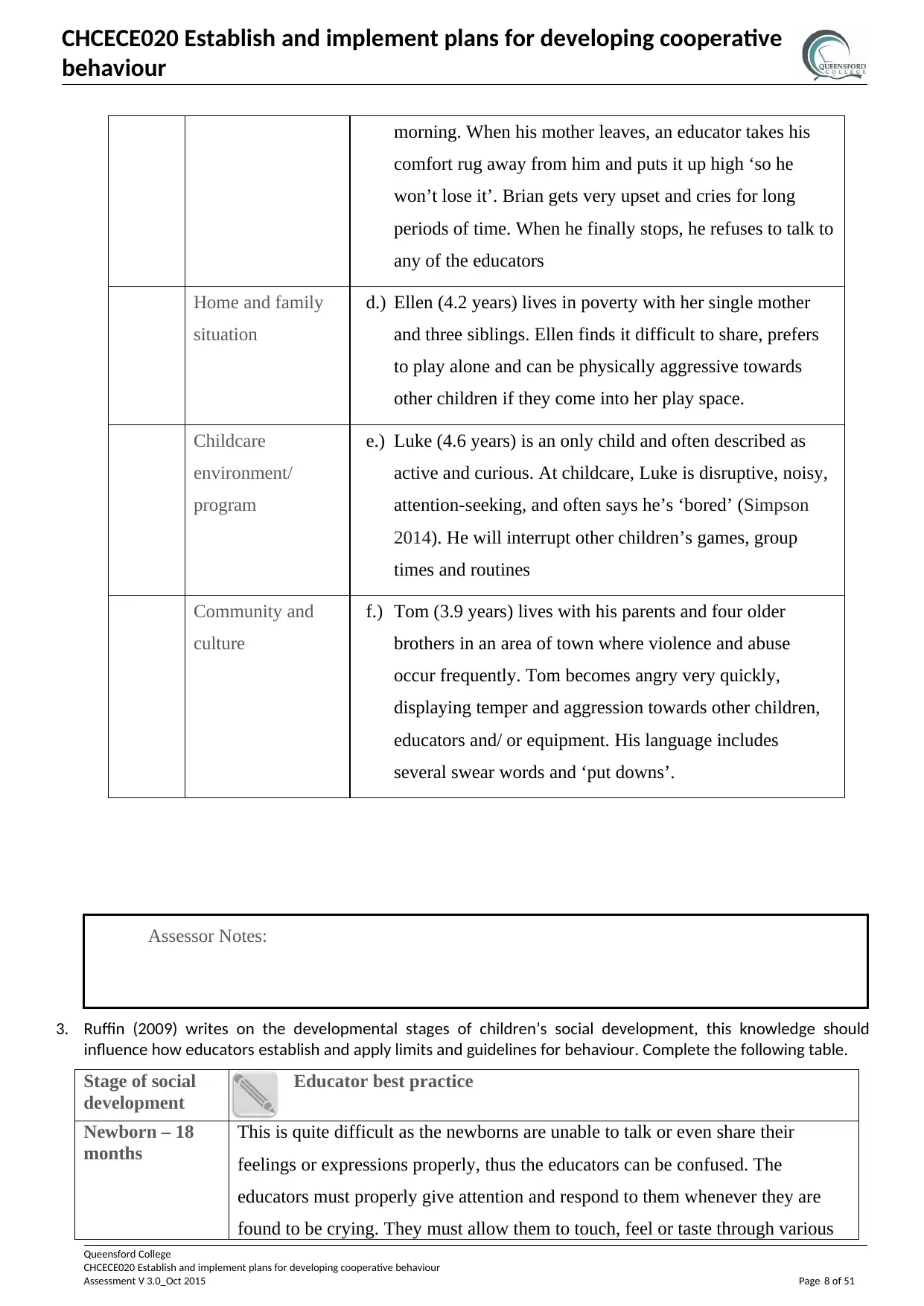
CHCECE020 Establish and implement plans for developing cooperative
behaviour
morning. When his mother leaves, an educator takes his
comfort rug away from him and puts it up high ‘so he
won’t lose it’. Brian gets very upset and cries for long
periods of time. When he finally stops, he refuses to talk to
any of the educators
Home and family
situation
d.) Ellen (4.2 years) lives in poverty with her single mother
and three siblings. Ellen finds it difficult to share, prefers
to play alone and can be physically aggressive towards
other children if they come into her play space.
Childcare
environment/
program
e.) Luke (4.6 years) is an only child and often described as
active and curious. At childcare, Luke is disruptive, noisy,
attention-seeking, and often says he’s ‘bored’ (Simpson
2014). He will interrupt other children’s games, group
times and routines
Community and
culture
f.) Tom (3.9 years) lives with his parents and four older
brothers in an area of town where violence and abuse
occur frequently. Tom becomes angry very quickly,
displaying temper and aggression towards other children,
educators and/ or equipment. His language includes
several swear words and ‘put downs’.
Assessor Notes:
3. Ruffin (2009) writes on the developmental stages of children’s social development, this knowledge should
influence how educators establish and apply limits and guidelines for behaviour. Complete the following table.
Stage of social
development
Educator best practice
Newborn – 18
months
This is quite difficult as the newborns are unable to talk or even share their
feelings or expressions properly, thus the educators can be confused. The
educators must properly give attention and respond to them whenever they are
found to be crying. They must allow them to touch, feel or taste through various
Queensford College
CHCECE020 Establish and implement plans for developing cooperative behaviour
Assessment V 3.0_Oct 2015 Page 8 of 51
behaviour
morning. When his mother leaves, an educator takes his
comfort rug away from him and puts it up high ‘so he
won’t lose it’. Brian gets very upset and cries for long
periods of time. When he finally stops, he refuses to talk to
any of the educators
Home and family
situation
d.) Ellen (4.2 years) lives in poverty with her single mother
and three siblings. Ellen finds it difficult to share, prefers
to play alone and can be physically aggressive towards
other children if they come into her play space.
Childcare
environment/
program
e.) Luke (4.6 years) is an only child and often described as
active and curious. At childcare, Luke is disruptive, noisy,
attention-seeking, and often says he’s ‘bored’ (Simpson
2014). He will interrupt other children’s games, group
times and routines
Community and
culture
f.) Tom (3.9 years) lives with his parents and four older
brothers in an area of town where violence and abuse
occur frequently. Tom becomes angry very quickly,
displaying temper and aggression towards other children,
educators and/ or equipment. His language includes
several swear words and ‘put downs’.
Assessor Notes:
3. Ruffin (2009) writes on the developmental stages of children’s social development, this knowledge should
influence how educators establish and apply limits and guidelines for behaviour. Complete the following table.
Stage of social
development
Educator best practice
Newborn – 18
months
This is quite difficult as the newborns are unable to talk or even share their
feelings or expressions properly, thus the educators can be confused. The
educators must properly give attention and respond to them whenever they are
found to be crying. They must allow them to touch, feel or taste through various
Queensford College
CHCECE020 Establish and implement plans for developing cooperative behaviour
Assessment V 3.0_Oct 2015 Page 8 of 51
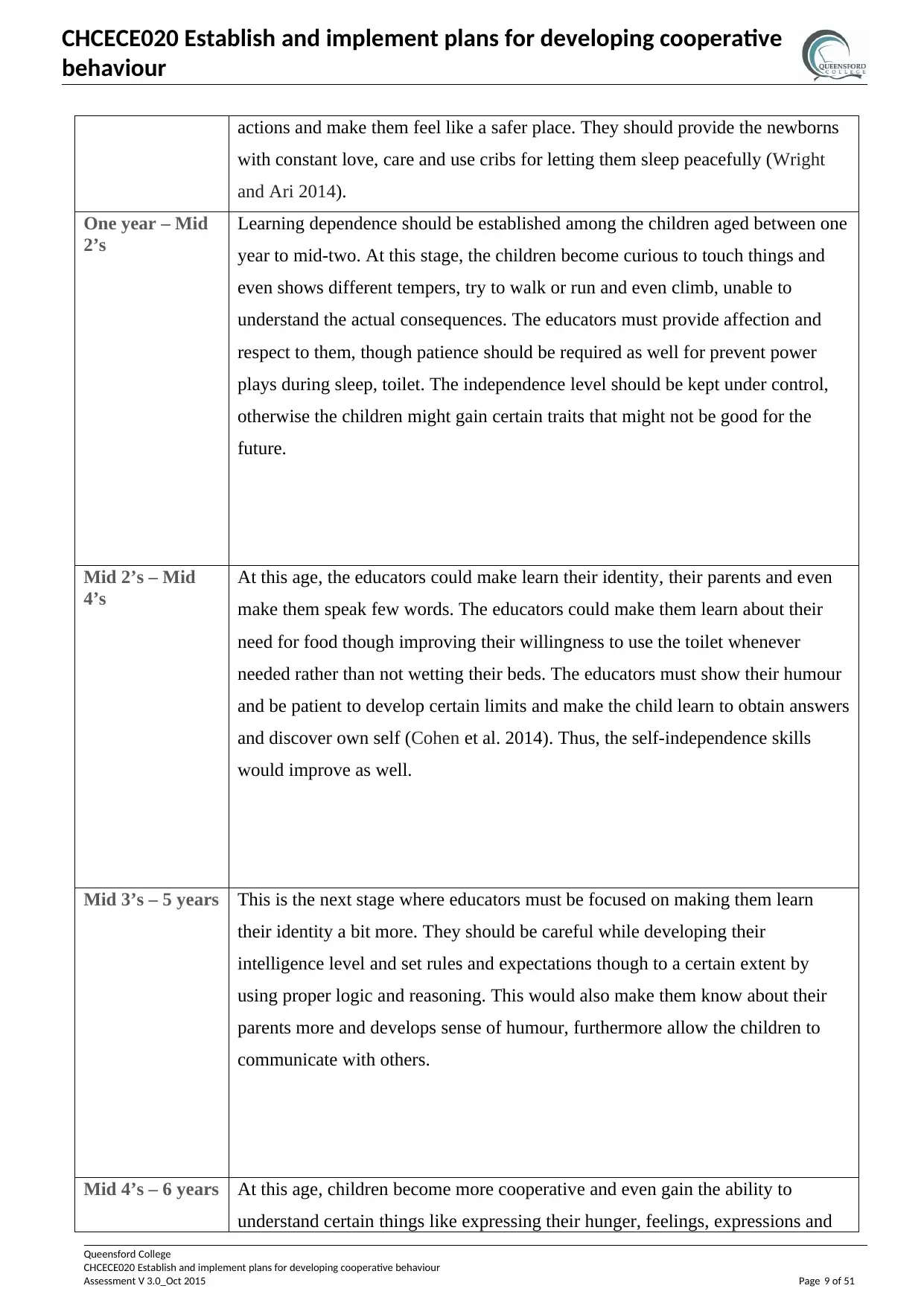
CHCECE020 Establish and implement plans for developing cooperative
behaviour
actions and make them feel like a safer place. They should provide the newborns
with constant love, care and use cribs for letting them sleep peacefully (Wright
and Ari 2014).
One year – Mid
2’s
Learning dependence should be established among the children aged between one
year to mid-two. At this stage, the children become curious to touch things and
even shows different tempers, try to walk or run and even climb, unable to
understand the actual consequences. The educators must provide affection and
respect to them, though patience should be required as well for prevent power
plays during sleep, toilet. The independence level should be kept under control,
otherwise the children might gain certain traits that might not be good for the
future.
Mid 2’s – Mid
4’s
At this age, the educators could make learn their identity, their parents and even
make them speak few words. The educators could make them learn about their
need for food though improving their willingness to use the toilet whenever
needed rather than not wetting their beds. The educators must show their humour
and be patient to develop certain limits and make the child learn to obtain answers
and discover own self (Cohen et al. 2014). Thus, the self-independence skills
would improve as well.
Mid 3’s – 5 years This is the next stage where educators must be focused on making them learn
their identity a bit more. They should be careful while developing their
intelligence level and set rules and expectations though to a certain extent by
using proper logic and reasoning. This would also make them know about their
parents more and develops sense of humour, furthermore allow the children to
communicate with others.
Mid 4’s – 6 years At this age, children become more cooperative and even gain the ability to
understand certain things like expressing their hunger, feelings, expressions and
Queensford College
CHCECE020 Establish and implement plans for developing cooperative behaviour
Assessment V 3.0_Oct 2015 Page 9 of 51
behaviour
actions and make them feel like a safer place. They should provide the newborns
with constant love, care and use cribs for letting them sleep peacefully (Wright
and Ari 2014).
One year – Mid
2’s
Learning dependence should be established among the children aged between one
year to mid-two. At this stage, the children become curious to touch things and
even shows different tempers, try to walk or run and even climb, unable to
understand the actual consequences. The educators must provide affection and
respect to them, though patience should be required as well for prevent power
plays during sleep, toilet. The independence level should be kept under control,
otherwise the children might gain certain traits that might not be good for the
future.
Mid 2’s – Mid
4’s
At this age, the educators could make learn their identity, their parents and even
make them speak few words. The educators could make them learn about their
need for food though improving their willingness to use the toilet whenever
needed rather than not wetting their beds. The educators must show their humour
and be patient to develop certain limits and make the child learn to obtain answers
and discover own self (Cohen et al. 2014). Thus, the self-independence skills
would improve as well.
Mid 3’s – 5 years This is the next stage where educators must be focused on making them learn
their identity a bit more. They should be careful while developing their
intelligence level and set rules and expectations though to a certain extent by
using proper logic and reasoning. This would also make them know about their
parents more and develops sense of humour, furthermore allow the children to
communicate with others.
Mid 4’s – 6 years At this age, children become more cooperative and even gain the ability to
understand certain things like expressing their hunger, feelings, expressions and
Queensford College
CHCECE020 Establish and implement plans for developing cooperative behaviour
Assessment V 3.0_Oct 2015 Page 9 of 51
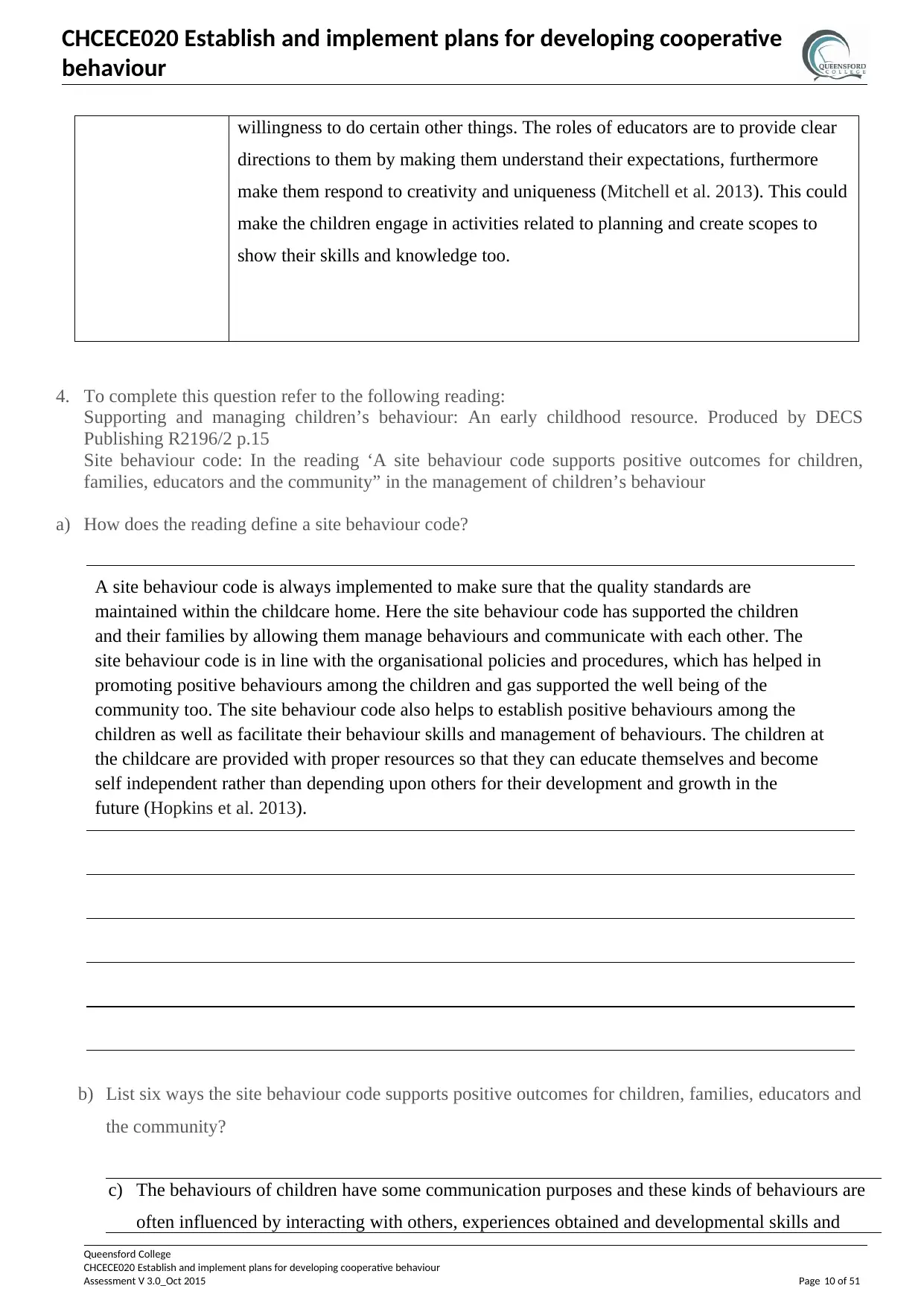
CHCECE020 Establish and implement plans for developing cooperative
behaviour
willingness to do certain other things. The roles of educators are to provide clear
directions to them by making them understand their expectations, furthermore
make them respond to creativity and uniqueness (Mitchell et al. 2013). This could
make the children engage in activities related to planning and create scopes to
show their skills and knowledge too.
4. To complete this question refer to the following reading:
Supporting and managing children’s behaviour: An early childhood resource. Produced by DECS
Publishing R2196/2 p.15
Site behaviour code: In the reading ‘A site behaviour code supports positive outcomes for children,
families, educators and the community” in the management of children’s behaviour
a) How does the reading define a site behaviour code?
A site behaviour code is always implemented to make sure that the quality standards are
maintained within the childcare home. Here the site behaviour code has supported the children
and their families by allowing them manage behaviours and communicate with each other. The
site behaviour code is in line with the organisational policies and procedures, which has helped in
promoting positive behaviours among the children and gas supported the well being of the
community too. The site behaviour code also helps to establish positive behaviours among the
children as well as facilitate their behaviour skills and management of behaviours. The children at
the childcare are provided with proper resources so that they can educate themselves and become
self independent rather than depending upon others for their development and growth in the
future (Hopkins et al. 2013).
b) List six ways the site behaviour code supports positive outcomes for children, families, educators and
the community?
c) The behaviours of children have some communication purposes and these kinds of behaviours are
often influenced by interacting with others, experiences obtained and developmental skills and
Queensford College
CHCECE020 Establish and implement plans for developing cooperative behaviour
Assessment V 3.0_Oct 2015 Page 10 of 51
behaviour
willingness to do certain other things. The roles of educators are to provide clear
directions to them by making them understand their expectations, furthermore
make them respond to creativity and uniqueness (Mitchell et al. 2013). This could
make the children engage in activities related to planning and create scopes to
show their skills and knowledge too.
4. To complete this question refer to the following reading:
Supporting and managing children’s behaviour: An early childhood resource. Produced by DECS
Publishing R2196/2 p.15
Site behaviour code: In the reading ‘A site behaviour code supports positive outcomes for children,
families, educators and the community” in the management of children’s behaviour
a) How does the reading define a site behaviour code?
A site behaviour code is always implemented to make sure that the quality standards are
maintained within the childcare home. Here the site behaviour code has supported the children
and their families by allowing them manage behaviours and communicate with each other. The
site behaviour code is in line with the organisational policies and procedures, which has helped in
promoting positive behaviours among the children and gas supported the well being of the
community too. The site behaviour code also helps to establish positive behaviours among the
children as well as facilitate their behaviour skills and management of behaviours. The children at
the childcare are provided with proper resources so that they can educate themselves and become
self independent rather than depending upon others for their development and growth in the
future (Hopkins et al. 2013).
b) List six ways the site behaviour code supports positive outcomes for children, families, educators and
the community?
c) The behaviours of children have some communication purposes and these kinds of behaviours are
often influenced by interacting with others, experiences obtained and developmental skills and
Queensford College
CHCECE020 Establish and implement plans for developing cooperative behaviour
Assessment V 3.0_Oct 2015 Page 10 of 51
Secure Best Marks with AI Grader
Need help grading? Try our AI Grader for instant feedback on your assignments.
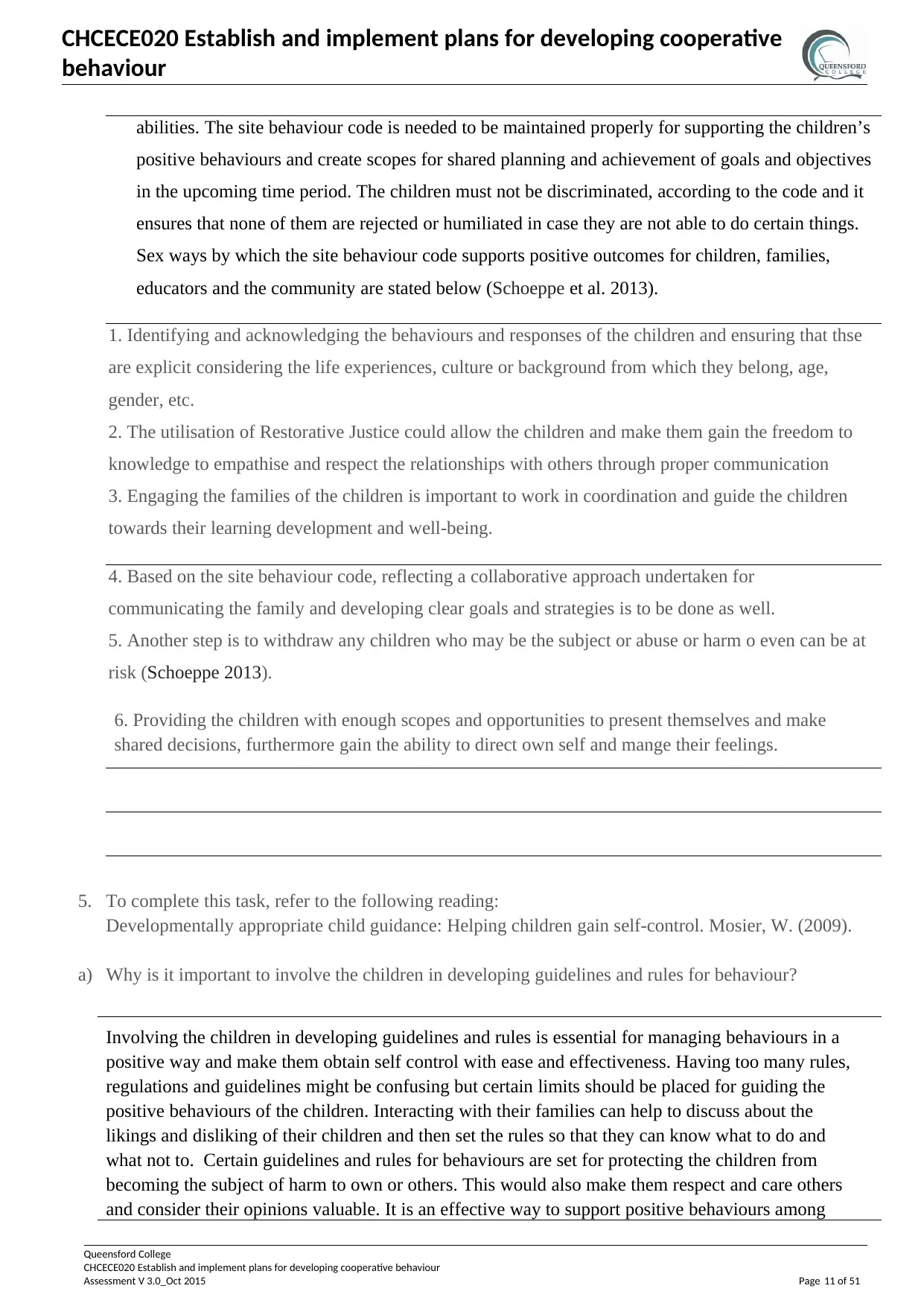
CHCECE020 Establish and implement plans for developing cooperative
behaviour
abilities. The site behaviour code is needed to be maintained properly for supporting the children’s
positive behaviours and create scopes for shared planning and achievement of goals and objectives
in the upcoming time period. The children must not be discriminated, according to the code and it
ensures that none of them are rejected or humiliated in case they are not able to do certain things.
Sex ways by which the site behaviour code supports positive outcomes for children, families,
educators and the community are stated below (Schoeppe et al. 2013).
1. Identifying and acknowledging the behaviours and responses of the children and ensuring that thse
are explicit considering the life experiences, culture or background from which they belong, age,
gender, etc.
2. The utilisation of Restorative Justice could allow the children and make them gain the freedom to
knowledge to empathise and respect the relationships with others through proper communication
3. Engaging the families of the children is important to work in coordination and guide the children
towards their learning development and well-being.
4. Based on the site behaviour code, reflecting a collaborative approach undertaken for
communicating the family and developing clear goals and strategies is to be done as well.
5. Another step is to withdraw any children who may be the subject or abuse or harm o even can be at
risk (Schoeppe 2013).
6. Providing the children with enough scopes and opportunities to present themselves and make
shared decisions, furthermore gain the ability to direct own self and mange their feelings.
5. To complete this task, refer to the following reading:
Developmentally appropriate child guidance: Helping children gain self-control. Mosier, W. (2009).
a) Why is it important to involve the children in developing guidelines and rules for behaviour?
Involving the children in developing guidelines and rules is essential for managing behaviours in a
positive way and make them obtain self control with ease and effectiveness. Having too many rules,
regulations and guidelines might be confusing but certain limits should be placed for guiding the
positive behaviours of the children. Interacting with their families can help to discuss about the
likings and disliking of their children and then set the rules so that they can know what to do and
what not to. Certain guidelines and rules for behaviours are set for protecting the children from
becoming the subject of harm to own or others. This would also make them respect and care others
and consider their opinions valuable. It is an effective way to support positive behaviours among
Queensford College
CHCECE020 Establish and implement plans for developing cooperative behaviour
Assessment V 3.0_Oct 2015 Page 11 of 51
behaviour
abilities. The site behaviour code is needed to be maintained properly for supporting the children’s
positive behaviours and create scopes for shared planning and achievement of goals and objectives
in the upcoming time period. The children must not be discriminated, according to the code and it
ensures that none of them are rejected or humiliated in case they are not able to do certain things.
Sex ways by which the site behaviour code supports positive outcomes for children, families,
educators and the community are stated below (Schoeppe et al. 2013).
1. Identifying and acknowledging the behaviours and responses of the children and ensuring that thse
are explicit considering the life experiences, culture or background from which they belong, age,
gender, etc.
2. The utilisation of Restorative Justice could allow the children and make them gain the freedom to
knowledge to empathise and respect the relationships with others through proper communication
3. Engaging the families of the children is important to work in coordination and guide the children
towards their learning development and well-being.
4. Based on the site behaviour code, reflecting a collaborative approach undertaken for
communicating the family and developing clear goals and strategies is to be done as well.
5. Another step is to withdraw any children who may be the subject or abuse or harm o even can be at
risk (Schoeppe 2013).
6. Providing the children with enough scopes and opportunities to present themselves and make
shared decisions, furthermore gain the ability to direct own self and mange their feelings.
5. To complete this task, refer to the following reading:
Developmentally appropriate child guidance: Helping children gain self-control. Mosier, W. (2009).
a) Why is it important to involve the children in developing guidelines and rules for behaviour?
Involving the children in developing guidelines and rules is essential for managing behaviours in a
positive way and make them obtain self control with ease and effectiveness. Having too many rules,
regulations and guidelines might be confusing but certain limits should be placed for guiding the
positive behaviours of the children. Interacting with their families can help to discuss about the
likings and disliking of their children and then set the rules so that they can know what to do and
what not to. Certain guidelines and rules for behaviours are set for protecting the children from
becoming the subject of harm to own or others. This would also make them respect and care others
and consider their opinions valuable. It is an effective way to support positive behaviours among
Queensford College
CHCECE020 Establish and implement plans for developing cooperative behaviour
Assessment V 3.0_Oct 2015 Page 11 of 51
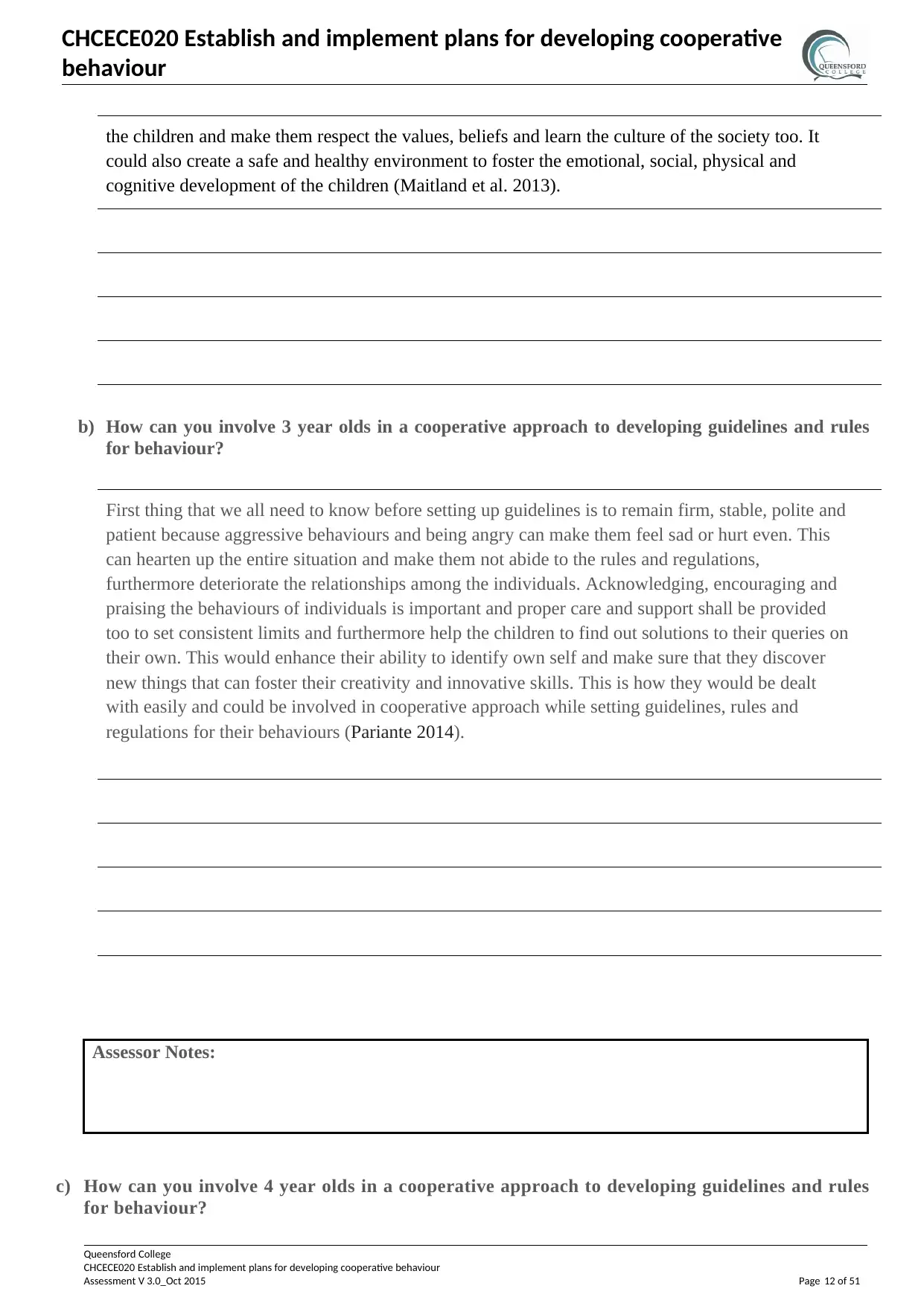
CHCECE020 Establish and implement plans for developing cooperative
behaviour
the children and make them respect the values, beliefs and learn the culture of the society too. It
could also create a safe and healthy environment to foster the emotional, social, physical and
cognitive development of the children (Maitland et al. 2013).
b) How can you involve 3 year olds in a cooperative approach to developing guidelines and rules
for behaviour?
First thing that we all need to know before setting up guidelines is to remain firm, stable, polite and
patient because aggressive behaviours and being angry can make them feel sad or hurt even. This
can hearten up the entire situation and make them not abide to the rules and regulations,
furthermore deteriorate the relationships among the individuals. Acknowledging, encouraging and
praising the behaviours of individuals is important and proper care and support shall be provided
too to set consistent limits and furthermore help the children to find out solutions to their queries on
their own. This would enhance their ability to identify own self and make sure that they discover
new things that can foster their creativity and innovative skills. This is how they would be dealt
with easily and could be involved in cooperative approach while setting guidelines, rules and
regulations for their behaviours (Pariante 2014).
Assessor Notes:
c) How can you involve 4 year olds in a cooperative approach to developing guidelines and rules
for behaviour?
Queensford College
CHCECE020 Establish and implement plans for developing cooperative behaviour
Assessment V 3.0_Oct 2015 Page 12 of 51
behaviour
the children and make them respect the values, beliefs and learn the culture of the society too. It
could also create a safe and healthy environment to foster the emotional, social, physical and
cognitive development of the children (Maitland et al. 2013).
b) How can you involve 3 year olds in a cooperative approach to developing guidelines and rules
for behaviour?
First thing that we all need to know before setting up guidelines is to remain firm, stable, polite and
patient because aggressive behaviours and being angry can make them feel sad or hurt even. This
can hearten up the entire situation and make them not abide to the rules and regulations,
furthermore deteriorate the relationships among the individuals. Acknowledging, encouraging and
praising the behaviours of individuals is important and proper care and support shall be provided
too to set consistent limits and furthermore help the children to find out solutions to their queries on
their own. This would enhance their ability to identify own self and make sure that they discover
new things that can foster their creativity and innovative skills. This is how they would be dealt
with easily and could be involved in cooperative approach while setting guidelines, rules and
regulations for their behaviours (Pariante 2014).
Assessor Notes:
c) How can you involve 4 year olds in a cooperative approach to developing guidelines and rules
for behaviour?
Queensford College
CHCECE020 Establish and implement plans for developing cooperative behaviour
Assessment V 3.0_Oct 2015 Page 12 of 51
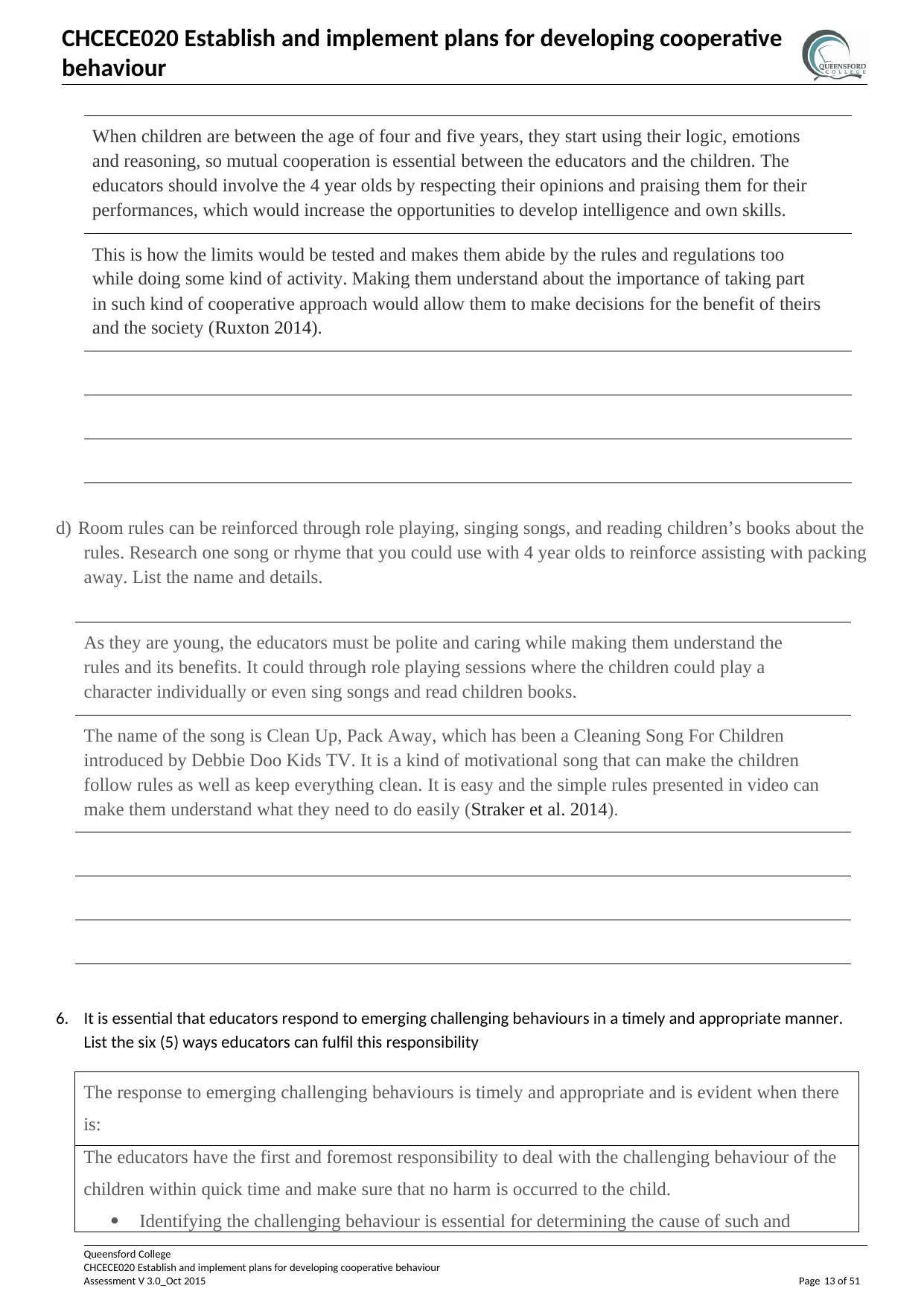
CHCECE020 Establish and implement plans for developing cooperative
behaviour
When children are between the age of four and five years, they start using their logic, emotions
and reasoning, so mutual cooperation is essential between the educators and the children. The
educators should involve the 4 year olds by respecting their opinions and praising them for their
performances, which would increase the opportunities to develop intelligence and own skills.
This is how the limits would be tested and makes them abide by the rules and regulations too
while doing some kind of activity. Making them understand about the importance of taking part
in such kind of cooperative approach would allow them to make decisions for the benefit of theirs
and the society (Ruxton 2014).
d) Room rules can be reinforced through role playing, singing songs, and reading children’s books about the
rules. Research one song or rhyme that you could use with 4 year olds to reinforce assisting with packing
away. List the name and details.
As they are young, the educators must be polite and caring while making them understand the
rules and its benefits. It could through role playing sessions where the children could play a
character individually or even sing songs and read children books.
The name of the song is Clean Up, Pack Away, which has been a Cleaning Song For Children
introduced by Debbie Doo Kids TV. It is a kind of motivational song that can make the children
follow rules as well as keep everything clean. It is easy and the simple rules presented in video can
make them understand what they need to do easily (Straker et al. 2014).
6. It is essential that educators respond to emerging challenging behaviours in a timely and appropriate manner.
List the six (5) ways educators can fulfil this responsibility
The response to emerging challenging behaviours is timely and appropriate and is evident when there
is:
The educators have the first and foremost responsibility to deal with the challenging behaviour of the
children within quick time and make sure that no harm is occurred to the child.
Identifying the challenging behaviour is essential for determining the cause of such and
Queensford College
CHCECE020 Establish and implement plans for developing cooperative behaviour
Assessment V 3.0_Oct 2015 Page 13 of 51
behaviour
When children are between the age of four and five years, they start using their logic, emotions
and reasoning, so mutual cooperation is essential between the educators and the children. The
educators should involve the 4 year olds by respecting their opinions and praising them for their
performances, which would increase the opportunities to develop intelligence and own skills.
This is how the limits would be tested and makes them abide by the rules and regulations too
while doing some kind of activity. Making them understand about the importance of taking part
in such kind of cooperative approach would allow them to make decisions for the benefit of theirs
and the society (Ruxton 2014).
d) Room rules can be reinforced through role playing, singing songs, and reading children’s books about the
rules. Research one song or rhyme that you could use with 4 year olds to reinforce assisting with packing
away. List the name and details.
As they are young, the educators must be polite and caring while making them understand the
rules and its benefits. It could through role playing sessions where the children could play a
character individually or even sing songs and read children books.
The name of the song is Clean Up, Pack Away, which has been a Cleaning Song For Children
introduced by Debbie Doo Kids TV. It is a kind of motivational song that can make the children
follow rules as well as keep everything clean. It is easy and the simple rules presented in video can
make them understand what they need to do easily (Straker et al. 2014).
6. It is essential that educators respond to emerging challenging behaviours in a timely and appropriate manner.
List the six (5) ways educators can fulfil this responsibility
The response to emerging challenging behaviours is timely and appropriate and is evident when there
is:
The educators have the first and foremost responsibility to deal with the challenging behaviour of the
children within quick time and make sure that no harm is occurred to the child.
Identifying the challenging behaviour is essential for determining the cause of such and
Queensford College
CHCECE020 Establish and implement plans for developing cooperative behaviour
Assessment V 3.0_Oct 2015 Page 13 of 51
Paraphrase This Document
Need a fresh take? Get an instant paraphrase of this document with our AI Paraphraser
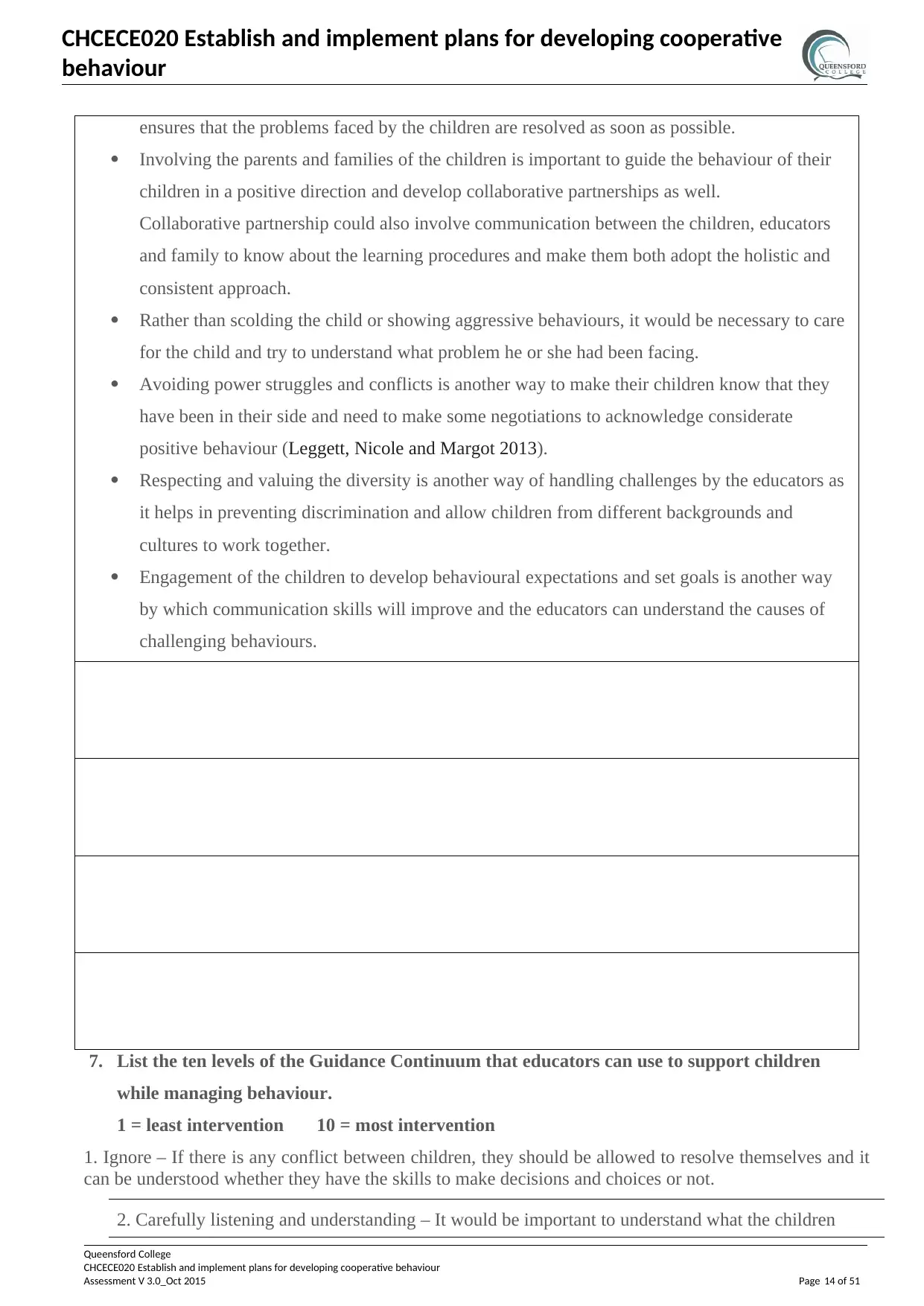
CHCECE020 Establish and implement plans for developing cooperative
behaviour
ensures that the problems faced by the children are resolved as soon as possible.
Involving the parents and families of the children is important to guide the behaviour of their
children in a positive direction and develop collaborative partnerships as well.
Collaborative partnership could also involve communication between the children, educators
and family to know about the learning procedures and make them both adopt the holistic and
consistent approach.
Rather than scolding the child or showing aggressive behaviours, it would be necessary to care
for the child and try to understand what problem he or she had been facing.
Avoiding power struggles and conflicts is another way to make their children know that they
have been in their side and need to make some negotiations to acknowledge considerate
positive behaviour (Leggett, Nicole and Margot 2013).
Respecting and valuing the diversity is another way of handling challenges by the educators as
it helps in preventing discrimination and allow children from different backgrounds and
cultures to work together.
Engagement of the children to develop behavioural expectations and set goals is another way
by which communication skills will improve and the educators can understand the causes of
challenging behaviours.
7. List the ten levels of the Guidance Continuum that educators can use to support children
while managing behaviour.
1 = least intervention 10 = most intervention
1. Ignore – If there is any conflict between children, they should be allowed to resolve themselves and it
can be understood whether they have the skills to make decisions and choices or not.
2. Carefully listening and understanding – It would be important to understand what the children
Queensford College
CHCECE020 Establish and implement plans for developing cooperative behaviour
Assessment V 3.0_Oct 2015 Page 14 of 51
behaviour
ensures that the problems faced by the children are resolved as soon as possible.
Involving the parents and families of the children is important to guide the behaviour of their
children in a positive direction and develop collaborative partnerships as well.
Collaborative partnership could also involve communication between the children, educators
and family to know about the learning procedures and make them both adopt the holistic and
consistent approach.
Rather than scolding the child or showing aggressive behaviours, it would be necessary to care
for the child and try to understand what problem he or she had been facing.
Avoiding power struggles and conflicts is another way to make their children know that they
have been in their side and need to make some negotiations to acknowledge considerate
positive behaviour (Leggett, Nicole and Margot 2013).
Respecting and valuing the diversity is another way of handling challenges by the educators as
it helps in preventing discrimination and allow children from different backgrounds and
cultures to work together.
Engagement of the children to develop behavioural expectations and set goals is another way
by which communication skills will improve and the educators can understand the causes of
challenging behaviours.
7. List the ten levels of the Guidance Continuum that educators can use to support children
while managing behaviour.
1 = least intervention 10 = most intervention
1. Ignore – If there is any conflict between children, they should be allowed to resolve themselves and it
can be understood whether they have the skills to make decisions and choices or not.
2. Carefully listening and understanding – It would be important to understand what the children
Queensford College
CHCECE020 Establish and implement plans for developing cooperative behaviour
Assessment V 3.0_Oct 2015 Page 14 of 51
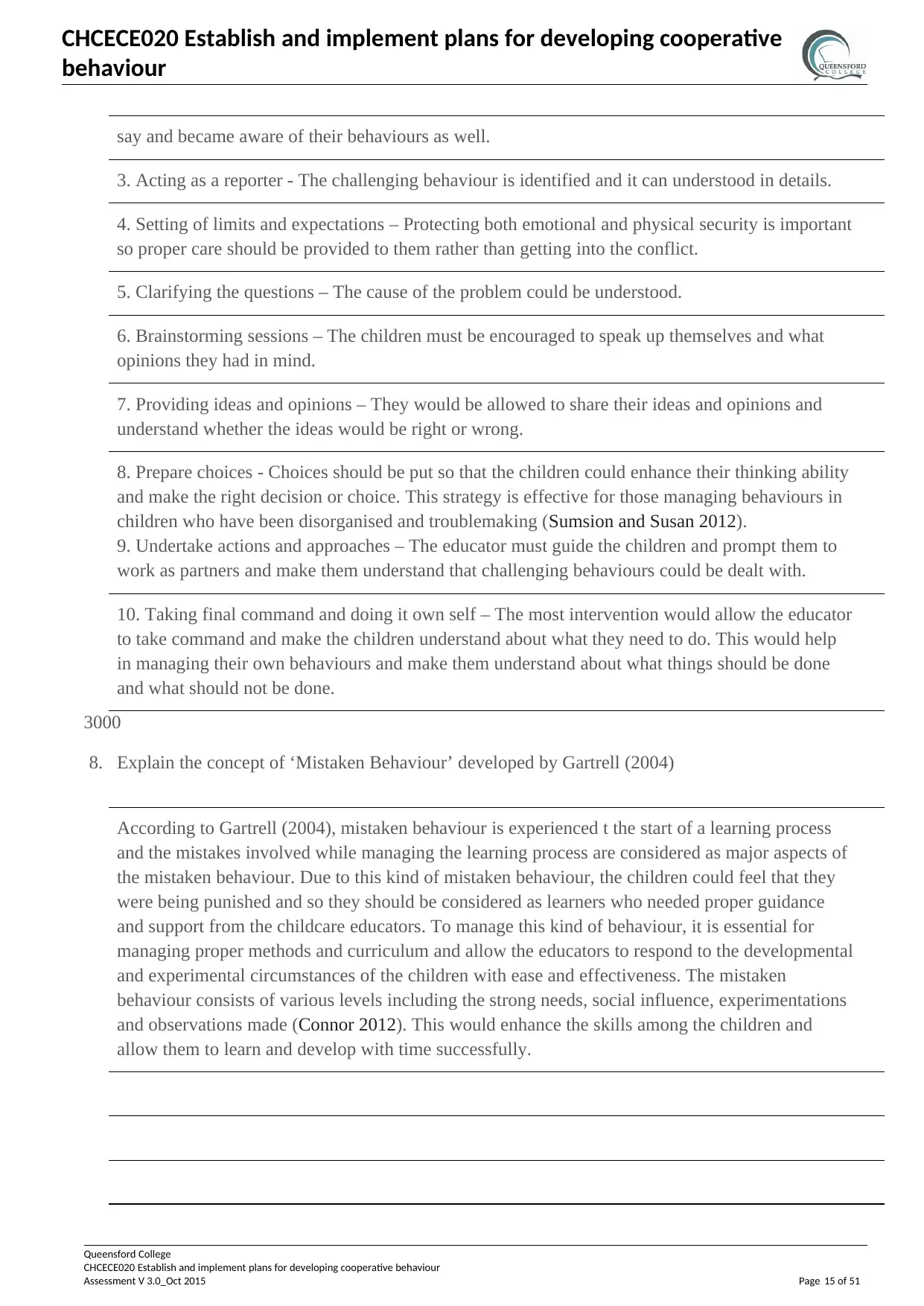
CHCECE020 Establish and implement plans for developing cooperative
behaviour
say and became aware of their behaviours as well.
3. Acting as a reporter - The challenging behaviour is identified and it can understood in details.
4. Setting of limits and expectations – Protecting both emotional and physical security is important
so proper care should be provided to them rather than getting into the conflict.
5. Clarifying the questions – The cause of the problem could be understood.
6. Brainstorming sessions – The children must be encouraged to speak up themselves and what
opinions they had in mind.
7. Providing ideas and opinions – They would be allowed to share their ideas and opinions and
understand whether the ideas would be right or wrong.
8. Prepare choices - Choices should be put so that the children could enhance their thinking ability
and make the right decision or choice. This strategy is effective for those managing behaviours in
children who have been disorganised and troublemaking (Sumsion and Susan 2012).
9. Undertake actions and approaches – The educator must guide the children and prompt them to
work as partners and make them understand that challenging behaviours could be dealt with.
10. Taking final command and doing it own self – The most intervention would allow the educator
to take command and make the children understand about what they need to do. This would help
in managing their own behaviours and make them understand about what things should be done
and what should not be done.
3000
8. Explain the concept of ‘Mistaken Behaviour’ developed by Gartrell (2004)
According to Gartrell (2004), mistaken behaviour is experienced t the start of a learning process
and the mistakes involved while managing the learning process are considered as major aspects of
the mistaken behaviour. Due to this kind of mistaken behaviour, the children could feel that they
were being punished and so they should be considered as learners who needed proper guidance
and support from the childcare educators. To manage this kind of behaviour, it is essential for
managing proper methods and curriculum and allow the educators to respond to the developmental
and experimental circumstances of the children with ease and effectiveness. The mistaken
behaviour consists of various levels including the strong needs, social influence, experimentations
and observations made (Connor 2012). This would enhance the skills among the children and
allow them to learn and develop with time successfully.
Queensford College
CHCECE020 Establish and implement plans for developing cooperative behaviour
Assessment V 3.0_Oct 2015 Page 15 of 51
behaviour
say and became aware of their behaviours as well.
3. Acting as a reporter - The challenging behaviour is identified and it can understood in details.
4. Setting of limits and expectations – Protecting both emotional and physical security is important
so proper care should be provided to them rather than getting into the conflict.
5. Clarifying the questions – The cause of the problem could be understood.
6. Brainstorming sessions – The children must be encouraged to speak up themselves and what
opinions they had in mind.
7. Providing ideas and opinions – They would be allowed to share their ideas and opinions and
understand whether the ideas would be right or wrong.
8. Prepare choices - Choices should be put so that the children could enhance their thinking ability
and make the right decision or choice. This strategy is effective for those managing behaviours in
children who have been disorganised and troublemaking (Sumsion and Susan 2012).
9. Undertake actions and approaches – The educator must guide the children and prompt them to
work as partners and make them understand that challenging behaviours could be dealt with.
10. Taking final command and doing it own self – The most intervention would allow the educator
to take command and make the children understand about what they need to do. This would help
in managing their own behaviours and make them understand about what things should be done
and what should not be done.
3000
8. Explain the concept of ‘Mistaken Behaviour’ developed by Gartrell (2004)
According to Gartrell (2004), mistaken behaviour is experienced t the start of a learning process
and the mistakes involved while managing the learning process are considered as major aspects of
the mistaken behaviour. Due to this kind of mistaken behaviour, the children could feel that they
were being punished and so they should be considered as learners who needed proper guidance
and support from the childcare educators. To manage this kind of behaviour, it is essential for
managing proper methods and curriculum and allow the educators to respond to the developmental
and experimental circumstances of the children with ease and effectiveness. The mistaken
behaviour consists of various levels including the strong needs, social influence, experimentations
and observations made (Connor 2012). This would enhance the skills among the children and
allow them to learn and develop with time successfully.
Queensford College
CHCECE020 Establish and implement plans for developing cooperative behaviour
Assessment V 3.0_Oct 2015 Page 15 of 51
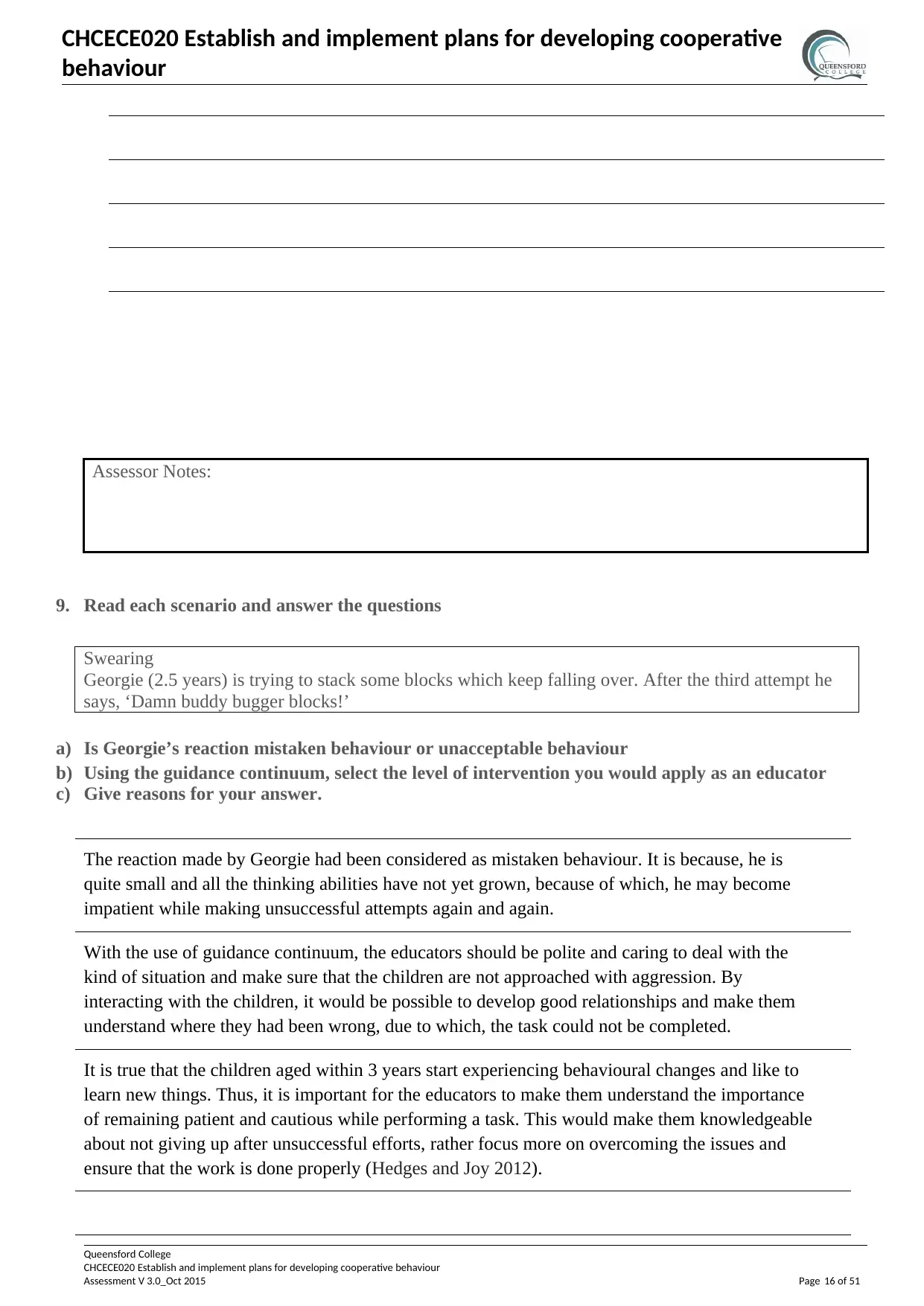
CHCECE020 Establish and implement plans for developing cooperative
behaviour
Assessor Notes:
9. Read each scenario and answer the questions
Swearing
Georgie (2.5 years) is trying to stack some blocks which keep falling over. After the third attempt he
says, ‘Damn buddy bugger blocks!’
a) Is Georgie’s reaction mistaken behaviour or unacceptable behaviour
b) Using the guidance continuum, select the level of intervention you would apply as an educator
c) Give reasons for your answer.
The reaction made by Georgie had been considered as mistaken behaviour. It is because, he is
quite small and all the thinking abilities have not yet grown, because of which, he may become
impatient while making unsuccessful attempts again and again.
With the use of guidance continuum, the educators should be polite and caring to deal with the
kind of situation and make sure that the children are not approached with aggression. By
interacting with the children, it would be possible to develop good relationships and make them
understand where they had been wrong, due to which, the task could not be completed.
It is true that the children aged within 3 years start experiencing behavioural changes and like to
learn new things. Thus, it is important for the educators to make them understand the importance
of remaining patient and cautious while performing a task. This would make them knowledgeable
about not giving up after unsuccessful efforts, rather focus more on overcoming the issues and
ensure that the work is done properly (Hedges and Joy 2012).
Queensford College
CHCECE020 Establish and implement plans for developing cooperative behaviour
Assessment V 3.0_Oct 2015 Page 16 of 51
behaviour
Assessor Notes:
9. Read each scenario and answer the questions
Swearing
Georgie (2.5 years) is trying to stack some blocks which keep falling over. After the third attempt he
says, ‘Damn buddy bugger blocks!’
a) Is Georgie’s reaction mistaken behaviour or unacceptable behaviour
b) Using the guidance continuum, select the level of intervention you would apply as an educator
c) Give reasons for your answer.
The reaction made by Georgie had been considered as mistaken behaviour. It is because, he is
quite small and all the thinking abilities have not yet grown, because of which, he may become
impatient while making unsuccessful attempts again and again.
With the use of guidance continuum, the educators should be polite and caring to deal with the
kind of situation and make sure that the children are not approached with aggression. By
interacting with the children, it would be possible to develop good relationships and make them
understand where they had been wrong, due to which, the task could not be completed.
It is true that the children aged within 3 years start experiencing behavioural changes and like to
learn new things. Thus, it is important for the educators to make them understand the importance
of remaining patient and cautious while performing a task. This would make them knowledgeable
about not giving up after unsuccessful efforts, rather focus more on overcoming the issues and
ensure that the work is done properly (Hedges and Joy 2012).
Queensford College
CHCECE020 Establish and implement plans for developing cooperative behaviour
Assessment V 3.0_Oct 2015 Page 16 of 51
Secure Best Marks with AI Grader
Need help grading? Try our AI Grader for instant feedback on your assignments.
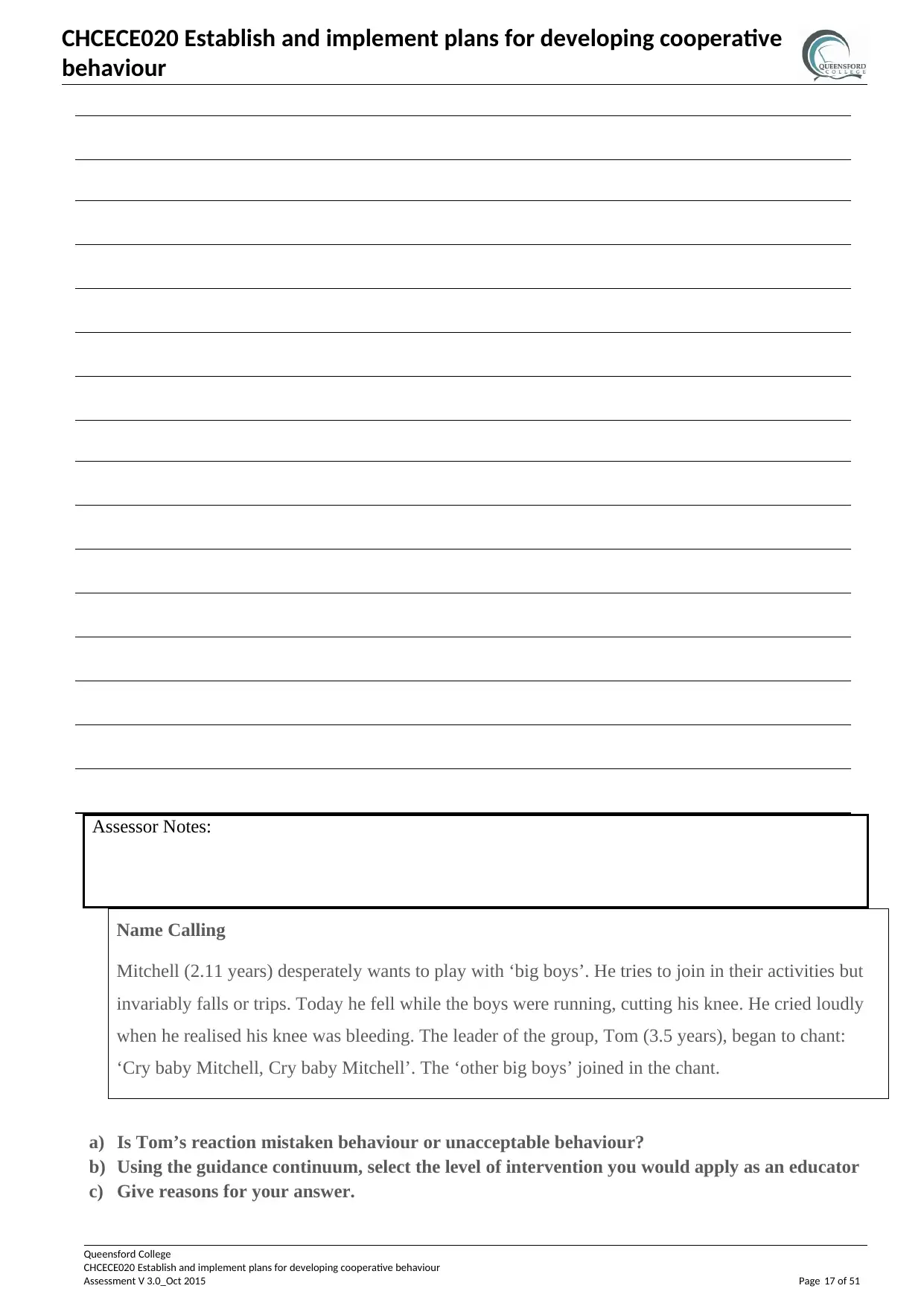
CHCECE020 Establish and implement plans for developing cooperative
behaviour
Assessor Notes:
Name Calling
Mitchell (2.11 years) desperately wants to play with ‘big boys’. He tries to join in their activities but
invariably falls or trips. Today he fell while the boys were running, cutting his knee. He cried loudly
when he realised his knee was bleeding. The leader of the group, Tom (3.5 years), began to chant:
‘Cry baby Mitchell, Cry baby Mitchell’. The ‘other big boys’ joined in the chant.
a) Is Tom’s reaction mistaken behaviour or unacceptable behaviour?
b) Using the guidance continuum, select the level of intervention you would apply as an educator
c) Give reasons for your answer.
Queensford College
CHCECE020 Establish and implement plans for developing cooperative behaviour
Assessment V 3.0_Oct 2015 Page 17 of 51
behaviour
Assessor Notes:
Name Calling
Mitchell (2.11 years) desperately wants to play with ‘big boys’. He tries to join in their activities but
invariably falls or trips. Today he fell while the boys were running, cutting his knee. He cried loudly
when he realised his knee was bleeding. The leader of the group, Tom (3.5 years), began to chant:
‘Cry baby Mitchell, Cry baby Mitchell’. The ‘other big boys’ joined in the chant.
a) Is Tom’s reaction mistaken behaviour or unacceptable behaviour?
b) Using the guidance continuum, select the level of intervention you would apply as an educator
c) Give reasons for your answer.
Queensford College
CHCECE020 Establish and implement plans for developing cooperative behaviour
Assessment V 3.0_Oct 2015 Page 17 of 51
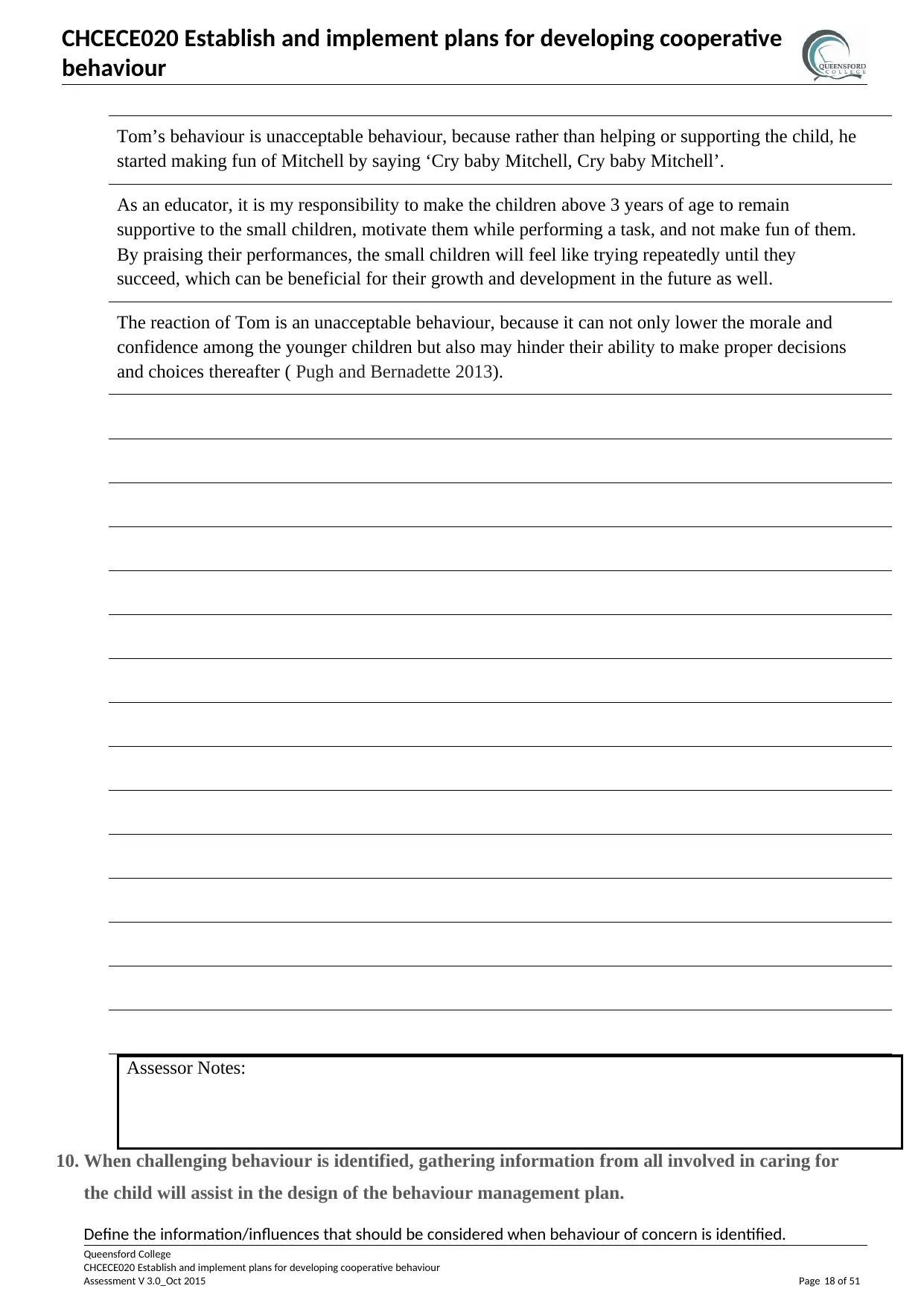
CHCECE020 Establish and implement plans for developing cooperative
behaviour
Tom’s behaviour is unacceptable behaviour, because rather than helping or supporting the child, he
started making fun of Mitchell by saying ‘Cry baby Mitchell, Cry baby Mitchell’.
As an educator, it is my responsibility to make the children above 3 years of age to remain
supportive to the small children, motivate them while performing a task, and not make fun of them.
By praising their performances, the small children will feel like trying repeatedly until they
succeed, which can be beneficial for their growth and development in the future as well.
The reaction of Tom is an unacceptable behaviour, because it can not only lower the morale and
confidence among the younger children but also may hinder their ability to make proper decisions
and choices thereafter ( Pugh and Bernadette 2013).
Assessor Notes:
10. When challenging behaviour is identified, gathering information from all involved in caring for
the child will assist in the design of the behaviour management plan.
Define the information/influences that should be considered when behaviour of concern is identified.
Queensford College
CHCECE020 Establish and implement plans for developing cooperative behaviour
Assessment V 3.0_Oct 2015 Page 18 of 51
behaviour
Tom’s behaviour is unacceptable behaviour, because rather than helping or supporting the child, he
started making fun of Mitchell by saying ‘Cry baby Mitchell, Cry baby Mitchell’.
As an educator, it is my responsibility to make the children above 3 years of age to remain
supportive to the small children, motivate them while performing a task, and not make fun of them.
By praising their performances, the small children will feel like trying repeatedly until they
succeed, which can be beneficial for their growth and development in the future as well.
The reaction of Tom is an unacceptable behaviour, because it can not only lower the morale and
confidence among the younger children but also may hinder their ability to make proper decisions
and choices thereafter ( Pugh and Bernadette 2013).
Assessor Notes:
10. When challenging behaviour is identified, gathering information from all involved in caring for
the child will assist in the design of the behaviour management plan.
Define the information/influences that should be considered when behaviour of concern is identified.
Queensford College
CHCECE020 Establish and implement plans for developing cooperative behaviour
Assessment V 3.0_Oct 2015 Page 18 of 51
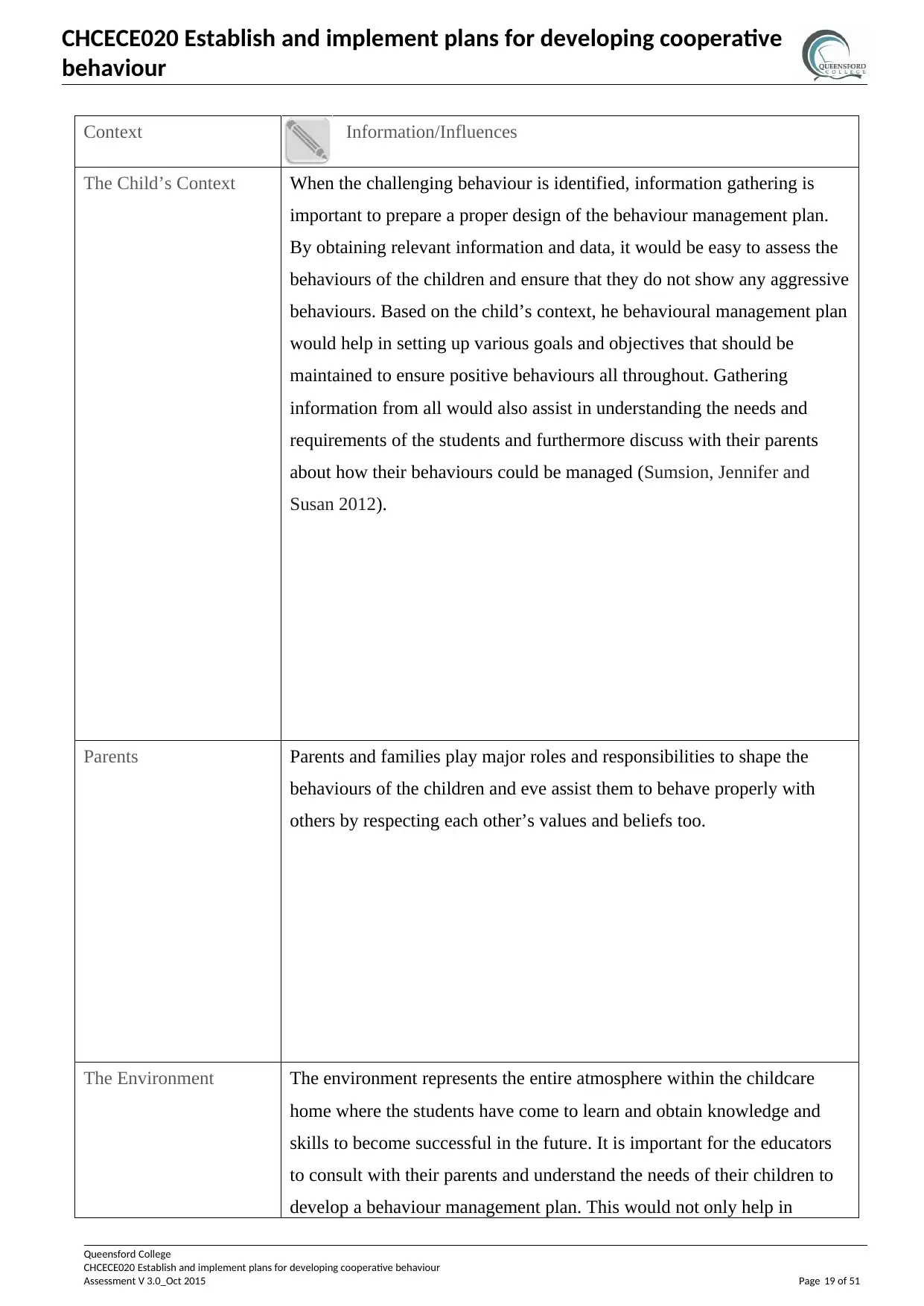
CHCECE020 Establish and implement plans for developing cooperative
behaviour
Context Information/Influences
The Child’s Context When the challenging behaviour is identified, information gathering is
important to prepare a proper design of the behaviour management plan.
By obtaining relevant information and data, it would be easy to assess the
behaviours of the children and ensure that they do not show any aggressive
behaviours. Based on the child’s context, he behavioural management plan
would help in setting up various goals and objectives that should be
maintained to ensure positive behaviours all throughout. Gathering
information from all would also assist in understanding the needs and
requirements of the students and furthermore discuss with their parents
about how their behaviours could be managed (Sumsion, Jennifer and
Susan 2012).
Parents Parents and families play major roles and responsibilities to shape the
behaviours of the children and eve assist them to behave properly with
others by respecting each other’s values and beliefs too.
The Environment The environment represents the entire atmosphere within the childcare
home where the students have come to learn and obtain knowledge and
skills to become successful in the future. It is important for the educators
to consult with their parents and understand the needs of their children to
develop a behaviour management plan. This would not only help in
Queensford College
CHCECE020 Establish and implement plans for developing cooperative behaviour
Assessment V 3.0_Oct 2015 Page 19 of 51
behaviour
Context Information/Influences
The Child’s Context When the challenging behaviour is identified, information gathering is
important to prepare a proper design of the behaviour management plan.
By obtaining relevant information and data, it would be easy to assess the
behaviours of the children and ensure that they do not show any aggressive
behaviours. Based on the child’s context, he behavioural management plan
would help in setting up various goals and objectives that should be
maintained to ensure positive behaviours all throughout. Gathering
information from all would also assist in understanding the needs and
requirements of the students and furthermore discuss with their parents
about how their behaviours could be managed (Sumsion, Jennifer and
Susan 2012).
Parents Parents and families play major roles and responsibilities to shape the
behaviours of the children and eve assist them to behave properly with
others by respecting each other’s values and beliefs too.
The Environment The environment represents the entire atmosphere within the childcare
home where the students have come to learn and obtain knowledge and
skills to become successful in the future. It is important for the educators
to consult with their parents and understand the needs of their children to
develop a behaviour management plan. This would not only help in
Queensford College
CHCECE020 Establish and implement plans for developing cooperative behaviour
Assessment V 3.0_Oct 2015 Page 19 of 51
Paraphrase This Document
Need a fresh take? Get an instant paraphrase of this document with our AI Paraphraser
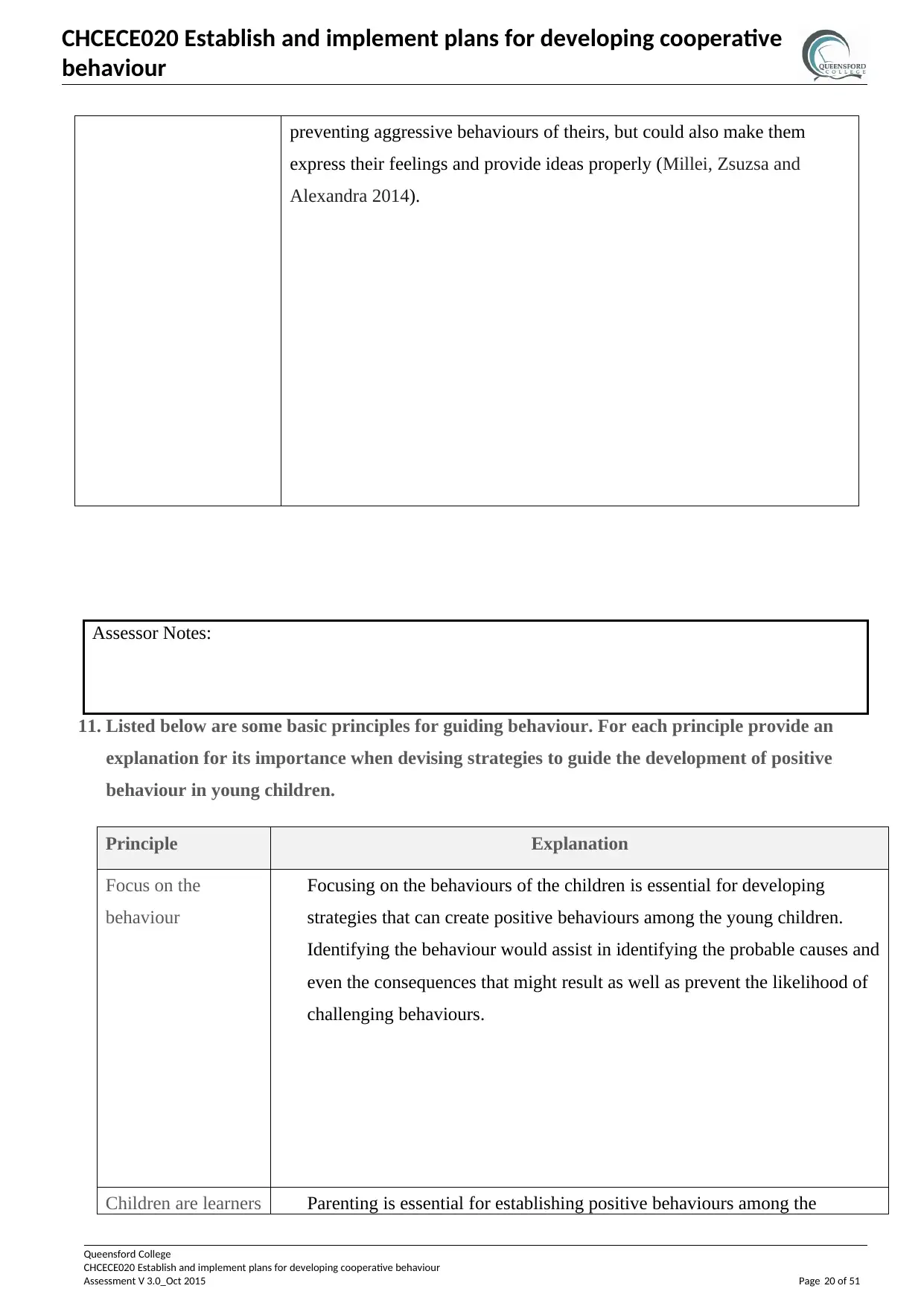
CHCECE020 Establish and implement plans for developing cooperative
behaviour
preventing aggressive behaviours of theirs, but could also make them
express their feelings and provide ideas properly (Millei, Zsuzsa and
Alexandra 2014).
Assessor Notes:
11. Listed below are some basic principles for guiding behaviour. For each principle provide an
explanation for its importance when devising strategies to guide the development of positive
behaviour in young children.
Principle Explanation
Focus on the
behaviour
Focusing on the behaviours of the children is essential for developing
strategies that can create positive behaviours among the young children.
Identifying the behaviour would assist in identifying the probable causes and
even the consequences that might result as well as prevent the likelihood of
challenging behaviours.
Children are learners Parenting is essential for establishing positive behaviours among the
Queensford College
CHCECE020 Establish and implement plans for developing cooperative behaviour
Assessment V 3.0_Oct 2015 Page 20 of 51
behaviour
preventing aggressive behaviours of theirs, but could also make them
express their feelings and provide ideas properly (Millei, Zsuzsa and
Alexandra 2014).
Assessor Notes:
11. Listed below are some basic principles for guiding behaviour. For each principle provide an
explanation for its importance when devising strategies to guide the development of positive
behaviour in young children.
Principle Explanation
Focus on the
behaviour
Focusing on the behaviours of the children is essential for developing
strategies that can create positive behaviours among the young children.
Identifying the behaviour would assist in identifying the probable causes and
even the consequences that might result as well as prevent the likelihood of
challenging behaviours.
Children are learners Parenting is essential for establishing positive behaviours among the
Queensford College
CHCECE020 Establish and implement plans for developing cooperative behaviour
Assessment V 3.0_Oct 2015 Page 20 of 51
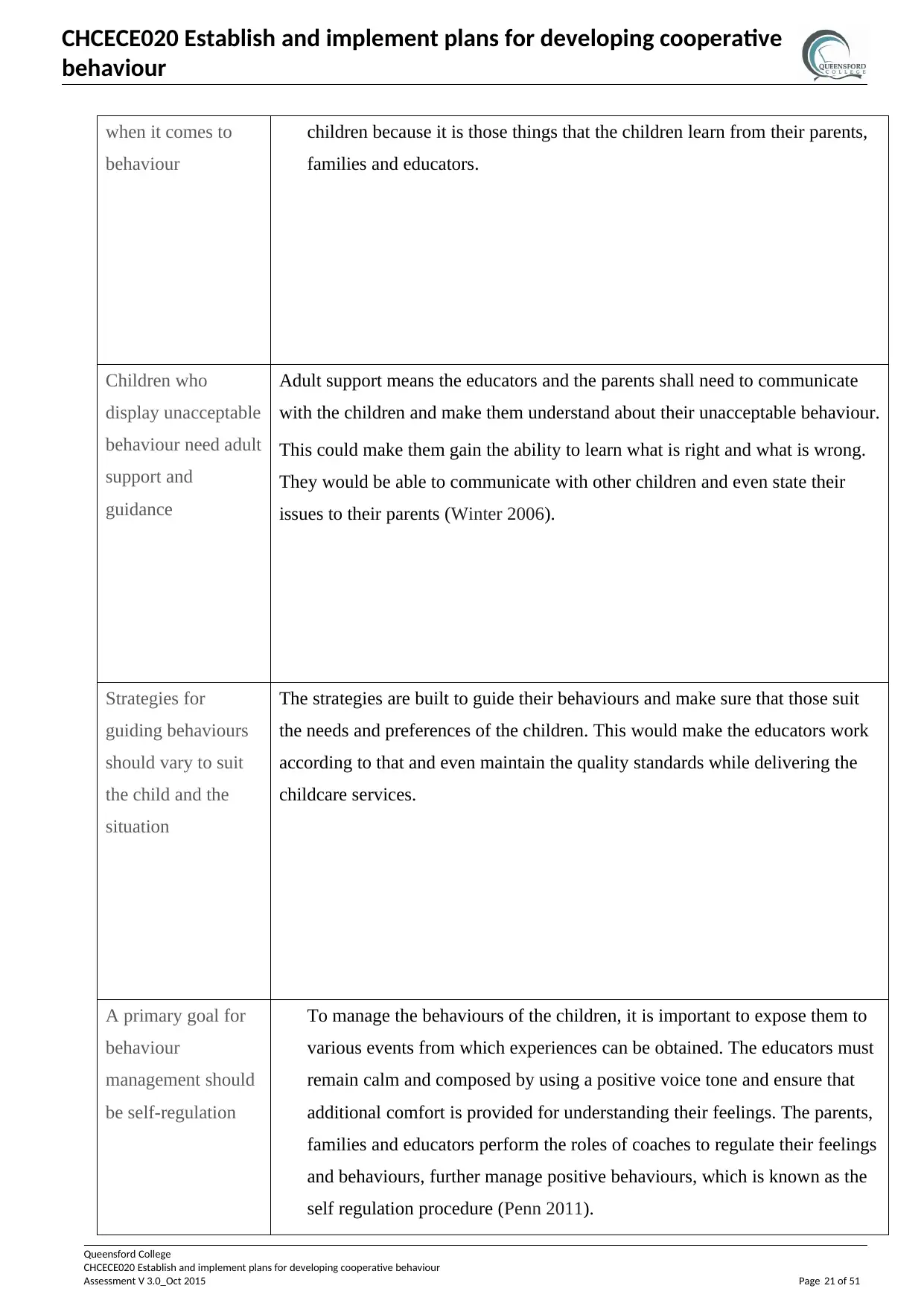
CHCECE020 Establish and implement plans for developing cooperative
behaviour
when it comes to
behaviour
children because it is those things that the children learn from their parents,
families and educators.
Children who
display unacceptable
behaviour need adult
support and
guidance
Adult support means the educators and the parents shall need to communicate
with the children and make them understand about their unacceptable behaviour.
This could make them gain the ability to learn what is right and what is wrong.
They would be able to communicate with other children and even state their
issues to their parents (Winter 2006).
Strategies for
guiding behaviours
should vary to suit
the child and the
situation
The strategies are built to guide their behaviours and make sure that those suit
the needs and preferences of the children. This would make the educators work
according to that and even maintain the quality standards while delivering the
childcare services.
A primary goal for
behaviour
management should
be self-regulation
To manage the behaviours of the children, it is important to expose them to
various events from which experiences can be obtained. The educators must
remain calm and composed by using a positive voice tone and ensure that
additional comfort is provided for understanding their feelings. The parents,
families and educators perform the roles of coaches to regulate their feelings
and behaviours, further manage positive behaviours, which is known as the
self regulation procedure (Penn 2011).
Queensford College
CHCECE020 Establish and implement plans for developing cooperative behaviour
Assessment V 3.0_Oct 2015 Page 21 of 51
behaviour
when it comes to
behaviour
children because it is those things that the children learn from their parents,
families and educators.
Children who
display unacceptable
behaviour need adult
support and
guidance
Adult support means the educators and the parents shall need to communicate
with the children and make them understand about their unacceptable behaviour.
This could make them gain the ability to learn what is right and what is wrong.
They would be able to communicate with other children and even state their
issues to their parents (Winter 2006).
Strategies for
guiding behaviours
should vary to suit
the child and the
situation
The strategies are built to guide their behaviours and make sure that those suit
the needs and preferences of the children. This would make the educators work
according to that and even maintain the quality standards while delivering the
childcare services.
A primary goal for
behaviour
management should
be self-regulation
To manage the behaviours of the children, it is important to expose them to
various events from which experiences can be obtained. The educators must
remain calm and composed by using a positive voice tone and ensure that
additional comfort is provided for understanding their feelings. The parents,
families and educators perform the roles of coaches to regulate their feelings
and behaviours, further manage positive behaviours, which is known as the
self regulation procedure (Penn 2011).
Queensford College
CHCECE020 Establish and implement plans for developing cooperative behaviour
Assessment V 3.0_Oct 2015 Page 21 of 51
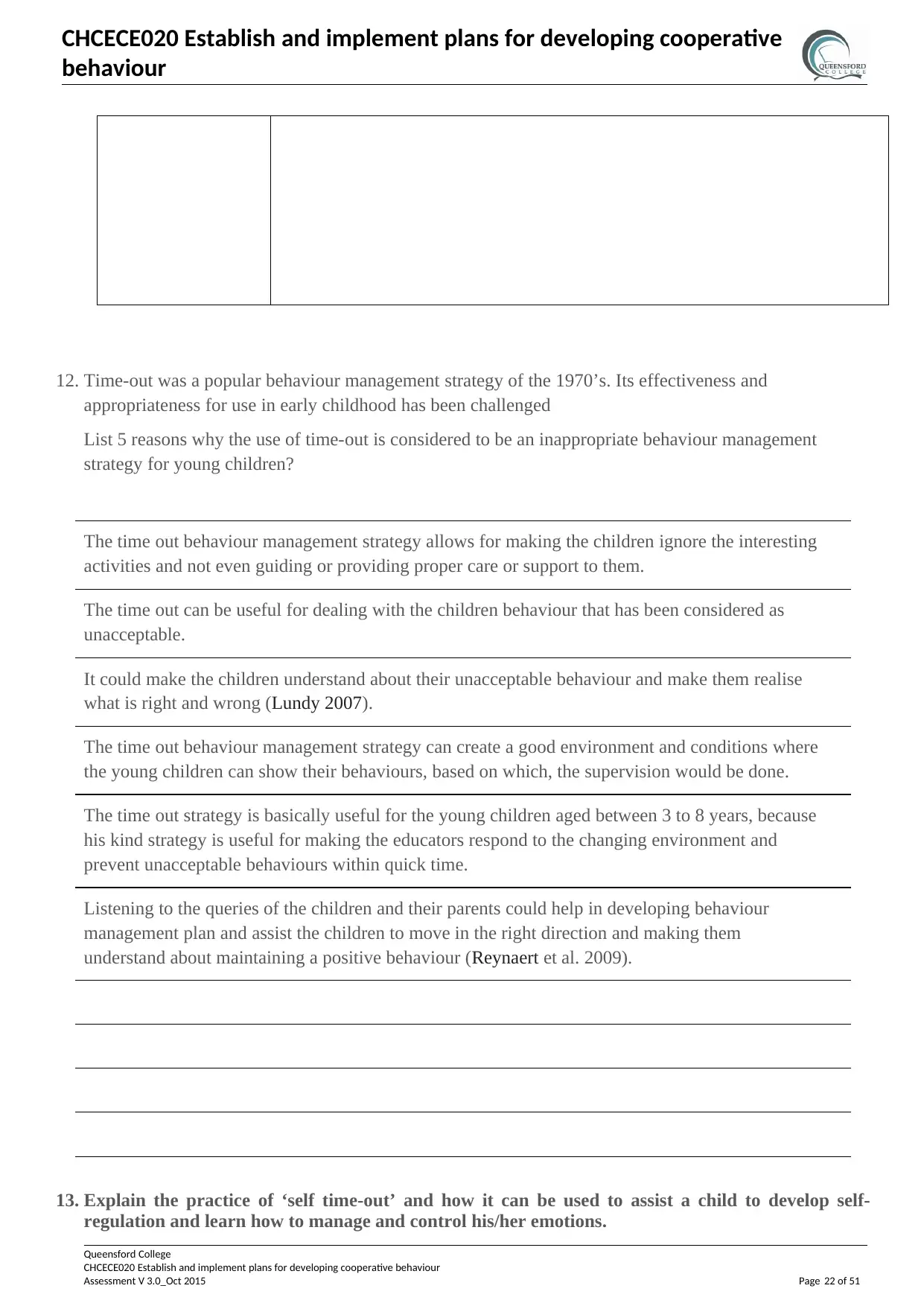
CHCECE020 Establish and implement plans for developing cooperative
behaviour
12. Time-out was a popular behaviour management strategy of the 1970’s. Its effectiveness and
appropriateness for use in early childhood has been challenged
List 5 reasons why the use of time-out is considered to be an inappropriate behaviour management
strategy for young children?
The time out behaviour management strategy allows for making the children ignore the interesting
activities and not even guiding or providing proper care or support to them.
The time out can be useful for dealing with the children behaviour that has been considered as
unacceptable.
It could make the children understand about their unacceptable behaviour and make them realise
what is right and wrong (Lundy 2007).
The time out behaviour management strategy can create a good environment and conditions where
the young children can show their behaviours, based on which, the supervision would be done.
The time out strategy is basically useful for the young children aged between 3 to 8 years, because
his kind strategy is useful for making the educators respond to the changing environment and
prevent unacceptable behaviours within quick time.
Listening to the queries of the children and their parents could help in developing behaviour
management plan and assist the children to move in the right direction and making them
understand about maintaining a positive behaviour (Reynaert et al. 2009).
13. Explain the practice of ‘self time-out’ and how it can be used to assist a child to develop self-
regulation and learn how to manage and control his/her emotions.
Queensford College
CHCECE020 Establish and implement plans for developing cooperative behaviour
Assessment V 3.0_Oct 2015 Page 22 of 51
behaviour
12. Time-out was a popular behaviour management strategy of the 1970’s. Its effectiveness and
appropriateness for use in early childhood has been challenged
List 5 reasons why the use of time-out is considered to be an inappropriate behaviour management
strategy for young children?
The time out behaviour management strategy allows for making the children ignore the interesting
activities and not even guiding or providing proper care or support to them.
The time out can be useful for dealing with the children behaviour that has been considered as
unacceptable.
It could make the children understand about their unacceptable behaviour and make them realise
what is right and wrong (Lundy 2007).
The time out behaviour management strategy can create a good environment and conditions where
the young children can show their behaviours, based on which, the supervision would be done.
The time out strategy is basically useful for the young children aged between 3 to 8 years, because
his kind strategy is useful for making the educators respond to the changing environment and
prevent unacceptable behaviours within quick time.
Listening to the queries of the children and their parents could help in developing behaviour
management plan and assist the children to move in the right direction and making them
understand about maintaining a positive behaviour (Reynaert et al. 2009).
13. Explain the practice of ‘self time-out’ and how it can be used to assist a child to develop self-
regulation and learn how to manage and control his/her emotions.
Queensford College
CHCECE020 Establish and implement plans for developing cooperative behaviour
Assessment V 3.0_Oct 2015 Page 22 of 51
Secure Best Marks with AI Grader
Need help grading? Try our AI Grader for instant feedback on your assignments.
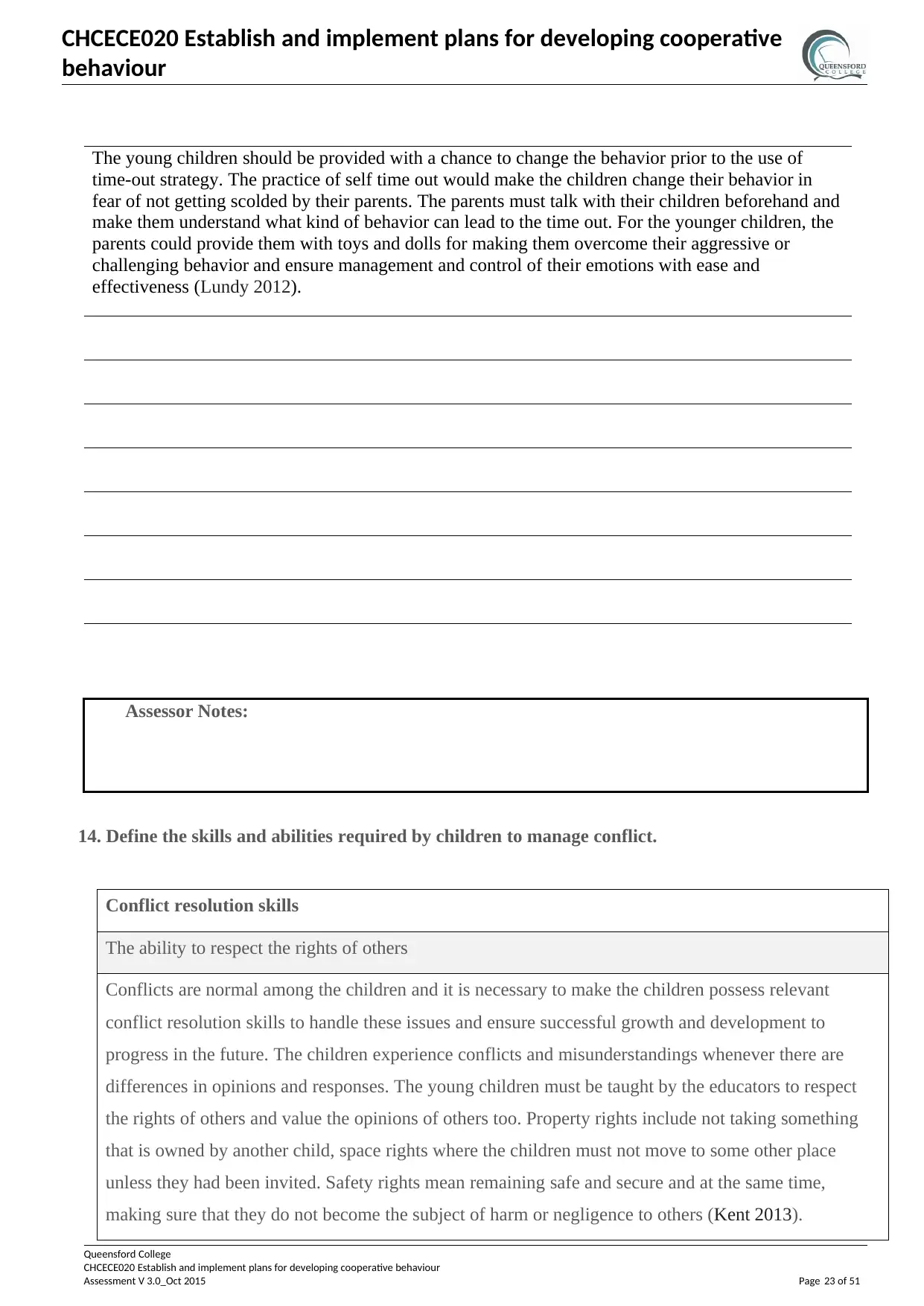
CHCECE020 Establish and implement plans for developing cooperative
behaviour
The young children should be provided with a chance to change the behavior prior to the use of
time-out strategy. The practice of self time out would make the children change their behavior in
fear of not getting scolded by their parents. The parents must talk with their children beforehand and
make them understand what kind of behavior can lead to the time out. For the younger children, the
parents could provide them with toys and dolls for making them overcome their aggressive or
challenging behavior and ensure management and control of their emotions with ease and
effectiveness (Lundy 2012).
Assessor Notes:
14. Define the skills and abilities required by children to manage conflict.
Conflict resolution skills
The ability to respect the rights of others
Conflicts are normal among the children and it is necessary to make the children possess relevant
conflict resolution skills to handle these issues and ensure successful growth and development to
progress in the future. The children experience conflicts and misunderstandings whenever there are
differences in opinions and responses. The young children must be taught by the educators to respect
the rights of others and value the opinions of others too. Property rights include not taking something
that is owned by another child, space rights where the children must not move to some other place
unless they had been invited. Safety rights mean remaining safe and secure and at the same time,
making sure that they do not become the subject of harm or negligence to others (Kent 2013).
Queensford College
CHCECE020 Establish and implement plans for developing cooperative behaviour
Assessment V 3.0_Oct 2015 Page 23 of 51
behaviour
The young children should be provided with a chance to change the behavior prior to the use of
time-out strategy. The practice of self time out would make the children change their behavior in
fear of not getting scolded by their parents. The parents must talk with their children beforehand and
make them understand what kind of behavior can lead to the time out. For the younger children, the
parents could provide them with toys and dolls for making them overcome their aggressive or
challenging behavior and ensure management and control of their emotions with ease and
effectiveness (Lundy 2012).
Assessor Notes:
14. Define the skills and abilities required by children to manage conflict.
Conflict resolution skills
The ability to respect the rights of others
Conflicts are normal among the children and it is necessary to make the children possess relevant
conflict resolution skills to handle these issues and ensure successful growth and development to
progress in the future. The children experience conflicts and misunderstandings whenever there are
differences in opinions and responses. The young children must be taught by the educators to respect
the rights of others and value the opinions of others too. Property rights include not taking something
that is owned by another child, space rights where the children must not move to some other place
unless they had been invited. Safety rights mean remaining safe and secure and at the same time,
making sure that they do not become the subject of harm or negligence to others (Kent 2013).
Queensford College
CHCECE020 Establish and implement plans for developing cooperative behaviour
Assessment V 3.0_Oct 2015 Page 23 of 51
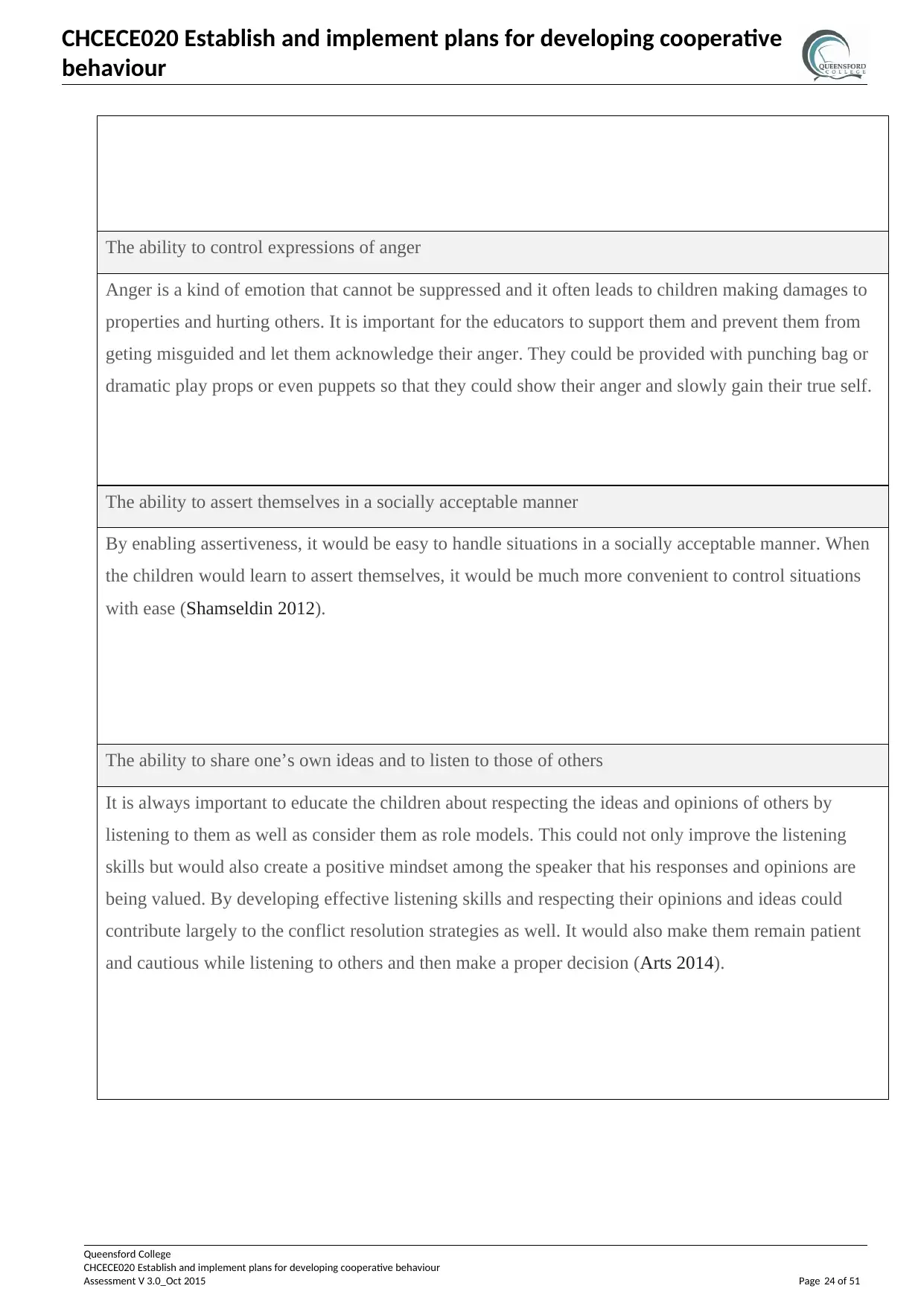
CHCECE020 Establish and implement plans for developing cooperative
behaviour
The ability to control expressions of anger
Anger is a kind of emotion that cannot be suppressed and it often leads to children making damages to
properties and hurting others. It is important for the educators to support them and prevent them from
geting misguided and let them acknowledge their anger. They could be provided with punching bag or
dramatic play props or even puppets so that they could show their anger and slowly gain their true self.
The ability to assert themselves in a socially acceptable manner
By enabling assertiveness, it would be easy to handle situations in a socially acceptable manner. When
the children would learn to assert themselves, it would be much more convenient to control situations
with ease (Shamseldin 2012).
The ability to share one’s own ideas and to listen to those of others
It is always important to educate the children about respecting the ideas and opinions of others by
listening to them as well as consider them as role models. This could not only improve the listening
skills but would also create a positive mindset among the speaker that his responses and opinions are
being valued. By developing effective listening skills and respecting their opinions and ideas could
contribute largely to the conflict resolution strategies as well. It would also make them remain patient
and cautious while listening to others and then make a proper decision (Arts 2014).
Queensford College
CHCECE020 Establish and implement plans for developing cooperative behaviour
Assessment V 3.0_Oct 2015 Page 24 of 51
behaviour
The ability to control expressions of anger
Anger is a kind of emotion that cannot be suppressed and it often leads to children making damages to
properties and hurting others. It is important for the educators to support them and prevent them from
geting misguided and let them acknowledge their anger. They could be provided with punching bag or
dramatic play props or even puppets so that they could show their anger and slowly gain their true self.
The ability to assert themselves in a socially acceptable manner
By enabling assertiveness, it would be easy to handle situations in a socially acceptable manner. When
the children would learn to assert themselves, it would be much more convenient to control situations
with ease (Shamseldin 2012).
The ability to share one’s own ideas and to listen to those of others
It is always important to educate the children about respecting the ideas and opinions of others by
listening to them as well as consider them as role models. This could not only improve the listening
skills but would also create a positive mindset among the speaker that his responses and opinions are
being valued. By developing effective listening skills and respecting their opinions and ideas could
contribute largely to the conflict resolution strategies as well. It would also make them remain patient
and cautious while listening to others and then make a proper decision (Arts 2014).
Queensford College
CHCECE020 Establish and implement plans for developing cooperative behaviour
Assessment V 3.0_Oct 2015 Page 24 of 51
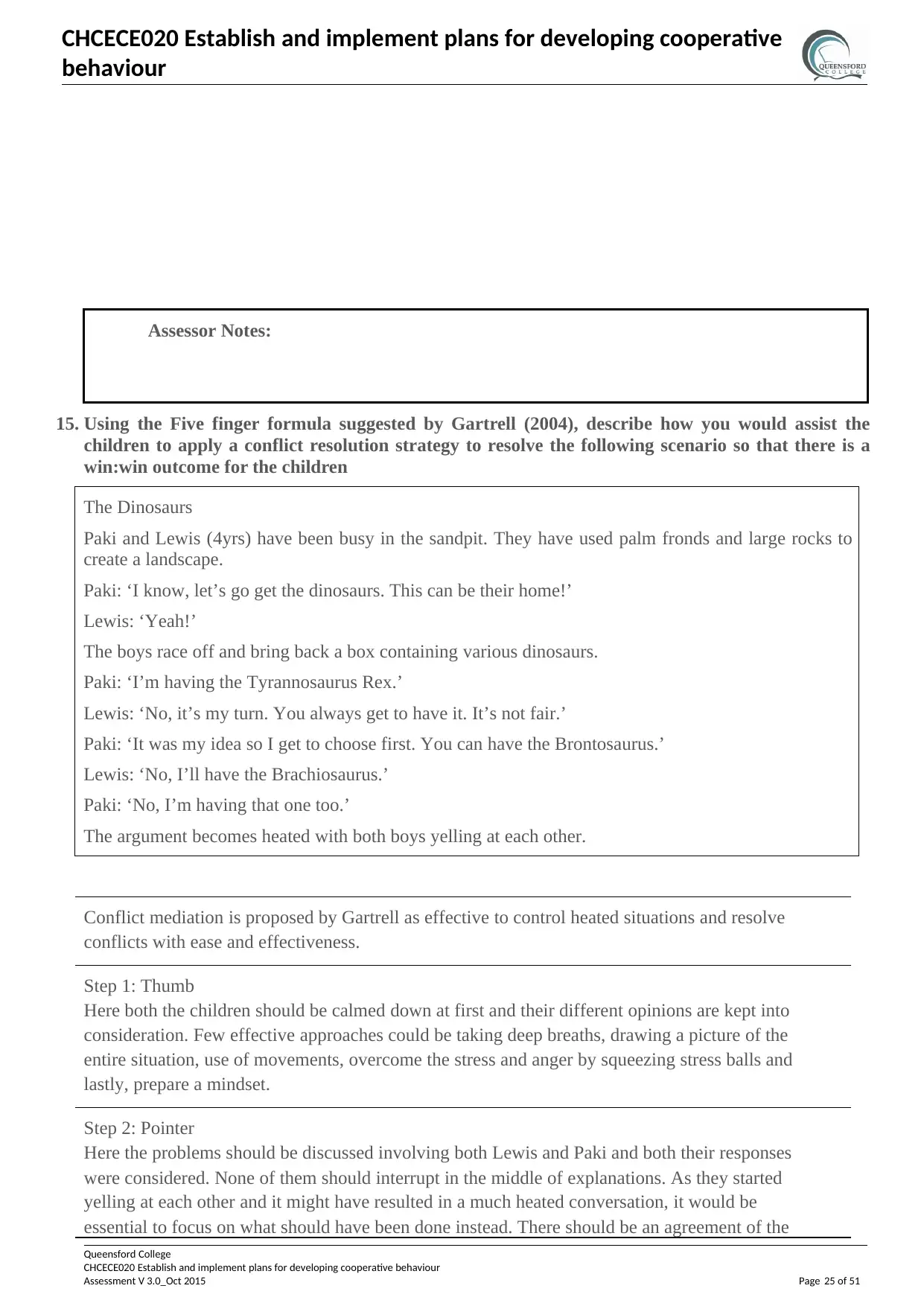
CHCECE020 Establish and implement plans for developing cooperative
behaviour
Assessor Notes:
15. Using the Five finger formula suggested by Gartrell (2004), describe how you would assist the
children to apply a conflict resolution strategy to resolve the following scenario so that there is a
win:win outcome for the children
The Dinosaurs
Paki and Lewis (4yrs) have been busy in the sandpit. They have used palm fronds and large rocks to
create a landscape.
Paki: ‘I know, let’s go get the dinosaurs. This can be their home!’
Lewis: ‘Yeah!’
The boys race off and bring back a box containing various dinosaurs.
Paki: ‘I’m having the Tyrannosaurus Rex.’
Lewis: ‘No, it’s my turn. You always get to have it. It’s not fair.’
Paki: ‘It was my idea so I get to choose first. You can have the Brontosaurus.’
Lewis: ‘No, I’ll have the Brachiosaurus.’
Paki: ‘No, I’m having that one too.’
The argument becomes heated with both boys yelling at each other.
Conflict mediation is proposed by Gartrell as effective to control heated situations and resolve
conflicts with ease and effectiveness.
Step 1: Thumb
Here both the children should be calmed down at first and their different opinions are kept into
consideration. Few effective approaches could be taking deep breaths, drawing a picture of the
entire situation, use of movements, overcome the stress and anger by squeezing stress balls and
lastly, prepare a mindset.
Step 2: Pointer
Here the problems should be discussed involving both Lewis and Paki and both their responses
were considered. None of them should interrupt in the middle of explanations. As they started
yelling at each other and it might have resulted in a much heated conversation, it would be
essential to focus on what should have been done instead. There should be an agreement of the
Queensford College
CHCECE020 Establish and implement plans for developing cooperative behaviour
Assessment V 3.0_Oct 2015 Page 25 of 51
behaviour
Assessor Notes:
15. Using the Five finger formula suggested by Gartrell (2004), describe how you would assist the
children to apply a conflict resolution strategy to resolve the following scenario so that there is a
win:win outcome for the children
The Dinosaurs
Paki and Lewis (4yrs) have been busy in the sandpit. They have used palm fronds and large rocks to
create a landscape.
Paki: ‘I know, let’s go get the dinosaurs. This can be their home!’
Lewis: ‘Yeah!’
The boys race off and bring back a box containing various dinosaurs.
Paki: ‘I’m having the Tyrannosaurus Rex.’
Lewis: ‘No, it’s my turn. You always get to have it. It’s not fair.’
Paki: ‘It was my idea so I get to choose first. You can have the Brontosaurus.’
Lewis: ‘No, I’ll have the Brachiosaurus.’
Paki: ‘No, I’m having that one too.’
The argument becomes heated with both boys yelling at each other.
Conflict mediation is proposed by Gartrell as effective to control heated situations and resolve
conflicts with ease and effectiveness.
Step 1: Thumb
Here both the children should be calmed down at first and their different opinions are kept into
consideration. Few effective approaches could be taking deep breaths, drawing a picture of the
entire situation, use of movements, overcome the stress and anger by squeezing stress balls and
lastly, prepare a mindset.
Step 2: Pointer
Here the problems should be discussed involving both Lewis and Paki and both their responses
were considered. None of them should interrupt in the middle of explanations. As they started
yelling at each other and it might have resulted in a much heated conversation, it would be
essential to focus on what should have been done instead. There should be an agreement of the
Queensford College
CHCECE020 Establish and implement plans for developing cooperative behaviour
Assessment V 3.0_Oct 2015 Page 25 of 51
Paraphrase This Document
Need a fresh take? Get an instant paraphrase of this document with our AI Paraphraser
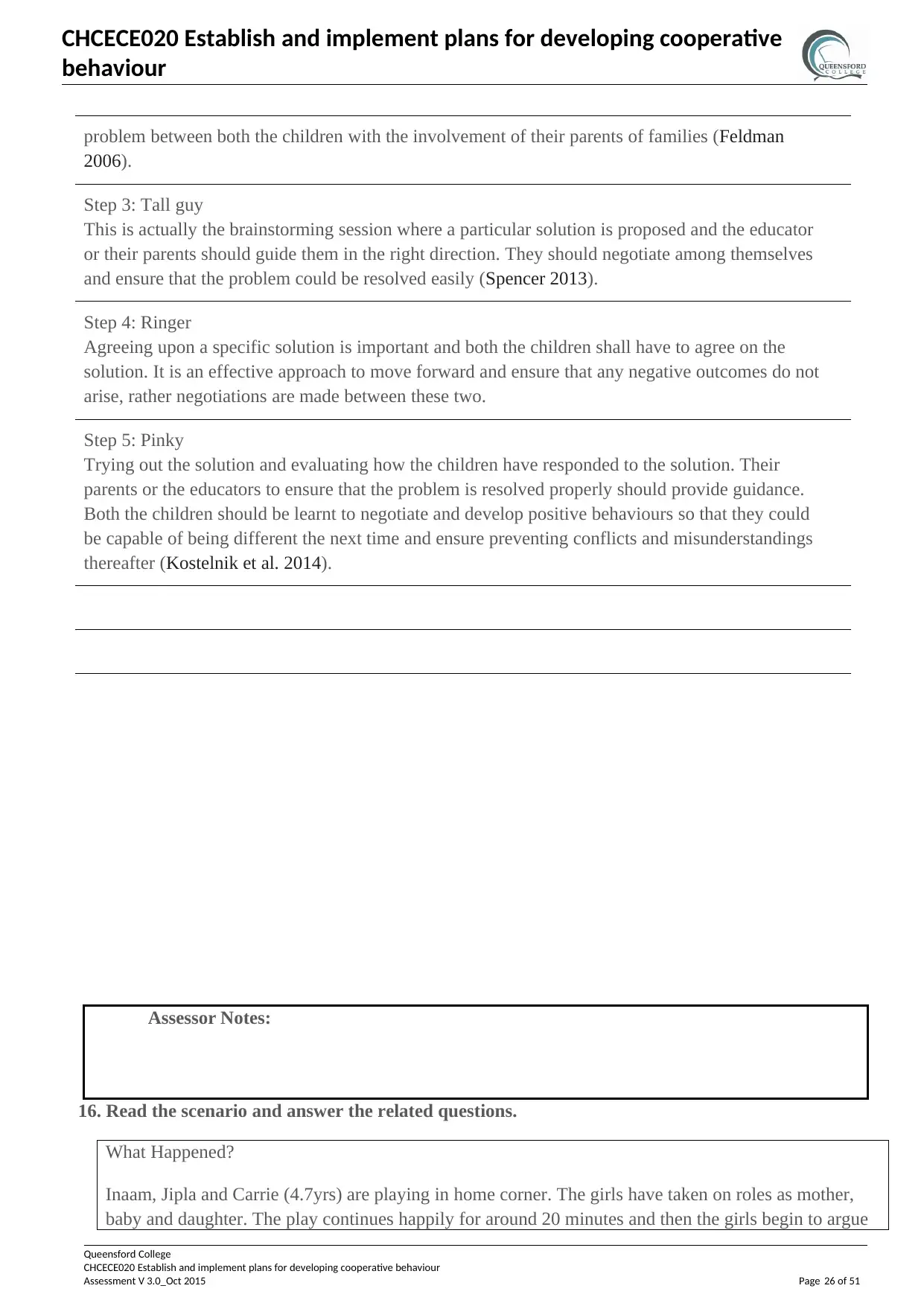
CHCECE020 Establish and implement plans for developing cooperative
behaviour
problem between both the children with the involvement of their parents of families (Feldman
2006).
Step 3: Tall guy
This is actually the brainstorming session where a particular solution is proposed and the educator
or their parents should guide them in the right direction. They should negotiate among themselves
and ensure that the problem could be resolved easily (Spencer 2013).
Step 4: Ringer
Agreeing upon a specific solution is important and both the children shall have to agree on the
solution. It is an effective approach to move forward and ensure that any negative outcomes do not
arise, rather negotiations are made between these two.
Step 5: Pinky
Trying out the solution and evaluating how the children have responded to the solution. Their
parents or the educators to ensure that the problem is resolved properly should provide guidance.
Both the children should be learnt to negotiate and develop positive behaviours so that they could
be capable of being different the next time and ensure preventing conflicts and misunderstandings
thereafter (Kostelnik et al. 2014).
Assessor Notes:
16. Read the scenario and answer the related questions.
What Happened?
Inaam, Jipla and Carrie (4.7yrs) are playing in home corner. The girls have taken on roles as mother,
baby and daughter. The play continues happily for around 20 minutes and then the girls begin to argue
Queensford College
CHCECE020 Establish and implement plans for developing cooperative behaviour
Assessment V 3.0_Oct 2015 Page 26 of 51
behaviour
problem between both the children with the involvement of their parents of families (Feldman
2006).
Step 3: Tall guy
This is actually the brainstorming session where a particular solution is proposed and the educator
or their parents should guide them in the right direction. They should negotiate among themselves
and ensure that the problem could be resolved easily (Spencer 2013).
Step 4: Ringer
Agreeing upon a specific solution is important and both the children shall have to agree on the
solution. It is an effective approach to move forward and ensure that any negative outcomes do not
arise, rather negotiations are made between these two.
Step 5: Pinky
Trying out the solution and evaluating how the children have responded to the solution. Their
parents or the educators to ensure that the problem is resolved properly should provide guidance.
Both the children should be learnt to negotiate and develop positive behaviours so that they could
be capable of being different the next time and ensure preventing conflicts and misunderstandings
thereafter (Kostelnik et al. 2014).
Assessor Notes:
16. Read the scenario and answer the related questions.
What Happened?
Inaam, Jipla and Carrie (4.7yrs) are playing in home corner. The girls have taken on roles as mother,
baby and daughter. The play continues happily for around 20 minutes and then the girls begin to argue
Queensford College
CHCECE020 Establish and implement plans for developing cooperative behaviour
Assessment V 3.0_Oct 2015 Page 26 of 51
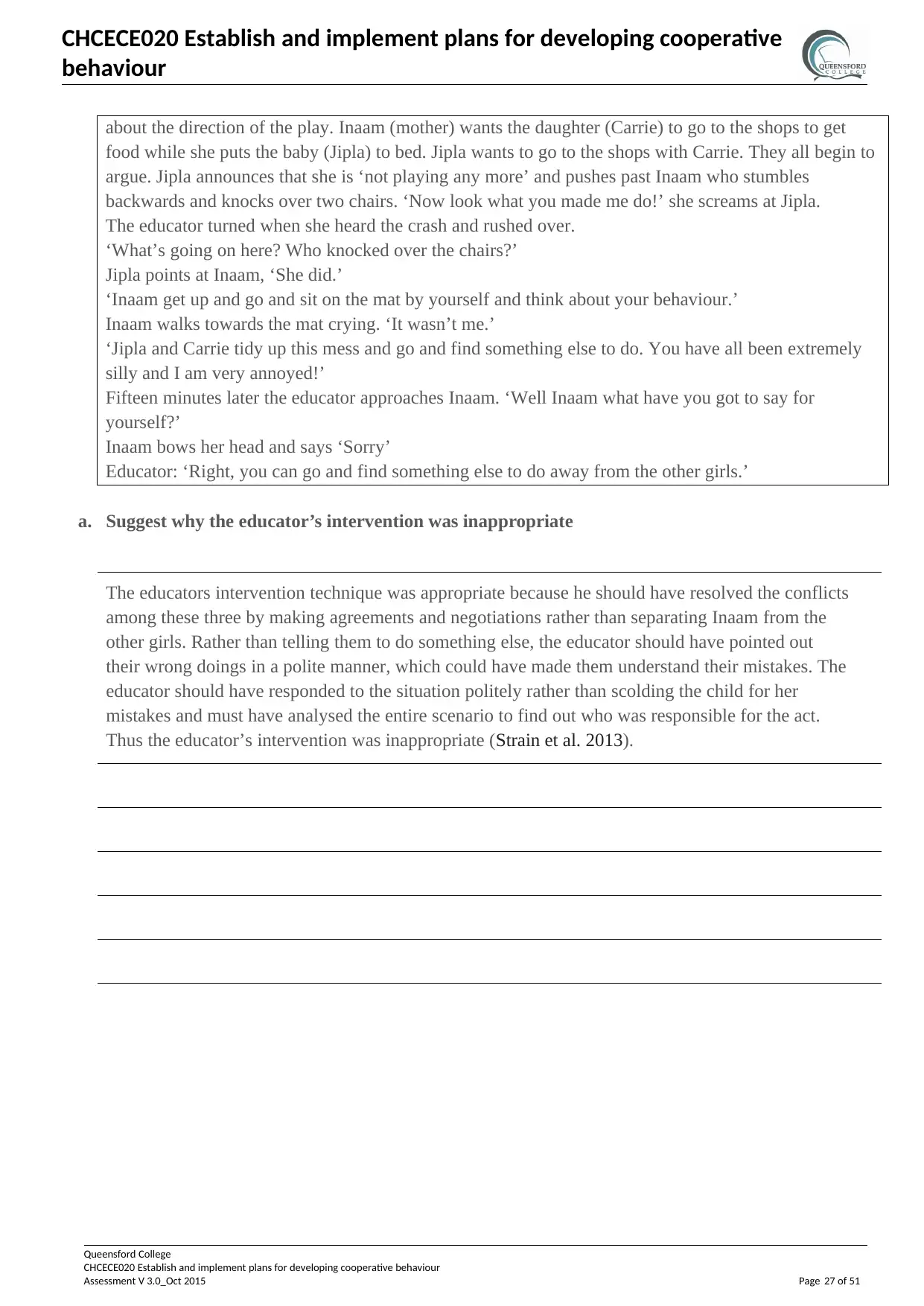
CHCECE020 Establish and implement plans for developing cooperative
behaviour
about the direction of the play. Inaam (mother) wants the daughter (Carrie) to go to the shops to get
food while she puts the baby (Jipla) to bed. Jipla wants to go to the shops with Carrie. They all begin to
argue. Jipla announces that she is ‘not playing any more’ and pushes past Inaam who stumbles
backwards and knocks over two chairs. ‘Now look what you made me do!’ she screams at Jipla.
The educator turned when she heard the crash and rushed over.
‘What’s going on here? Who knocked over the chairs?’
Jipla points at Inaam, ‘She did.’
‘Inaam get up and go and sit on the mat by yourself and think about your behaviour.’
Inaam walks towards the mat crying. ‘It wasn’t me.’
‘Jipla and Carrie tidy up this mess and go and find something else to do. You have all been extremely
silly and I am very annoyed!’
Fifteen minutes later the educator approaches Inaam. ‘Well Inaam what have you got to say for
yourself?’
Inaam bows her head and says ‘Sorry’
Educator: ‘Right, you can go and find something else to do away from the other girls.’
a. Suggest why the educator’s intervention was inappropriate
The educators intervention technique was appropriate because he should have resolved the conflicts
among these three by making agreements and negotiations rather than separating Inaam from the
other girls. Rather than telling them to do something else, the educator should have pointed out
their wrong doings in a polite manner, which could have made them understand their mistakes. The
educator should have responded to the situation politely rather than scolding the child for her
mistakes and must have analysed the entire scenario to find out who was responsible for the act.
Thus the educator’s intervention was inappropriate (Strain et al. 2013).
Queensford College
CHCECE020 Establish and implement plans for developing cooperative behaviour
Assessment V 3.0_Oct 2015 Page 27 of 51
behaviour
about the direction of the play. Inaam (mother) wants the daughter (Carrie) to go to the shops to get
food while she puts the baby (Jipla) to bed. Jipla wants to go to the shops with Carrie. They all begin to
argue. Jipla announces that she is ‘not playing any more’ and pushes past Inaam who stumbles
backwards and knocks over two chairs. ‘Now look what you made me do!’ she screams at Jipla.
The educator turned when she heard the crash and rushed over.
‘What’s going on here? Who knocked over the chairs?’
Jipla points at Inaam, ‘She did.’
‘Inaam get up and go and sit on the mat by yourself and think about your behaviour.’
Inaam walks towards the mat crying. ‘It wasn’t me.’
‘Jipla and Carrie tidy up this mess and go and find something else to do. You have all been extremely
silly and I am very annoyed!’
Fifteen minutes later the educator approaches Inaam. ‘Well Inaam what have you got to say for
yourself?’
Inaam bows her head and says ‘Sorry’
Educator: ‘Right, you can go and find something else to do away from the other girls.’
a. Suggest why the educator’s intervention was inappropriate
The educators intervention technique was appropriate because he should have resolved the conflicts
among these three by making agreements and negotiations rather than separating Inaam from the
other girls. Rather than telling them to do something else, the educator should have pointed out
their wrong doings in a polite manner, which could have made them understand their mistakes. The
educator should have responded to the situation politely rather than scolding the child for her
mistakes and must have analysed the entire scenario to find out who was responsible for the act.
Thus the educator’s intervention was inappropriate (Strain et al. 2013).
Queensford College
CHCECE020 Establish and implement plans for developing cooperative behaviour
Assessment V 3.0_Oct 2015 Page 27 of 51
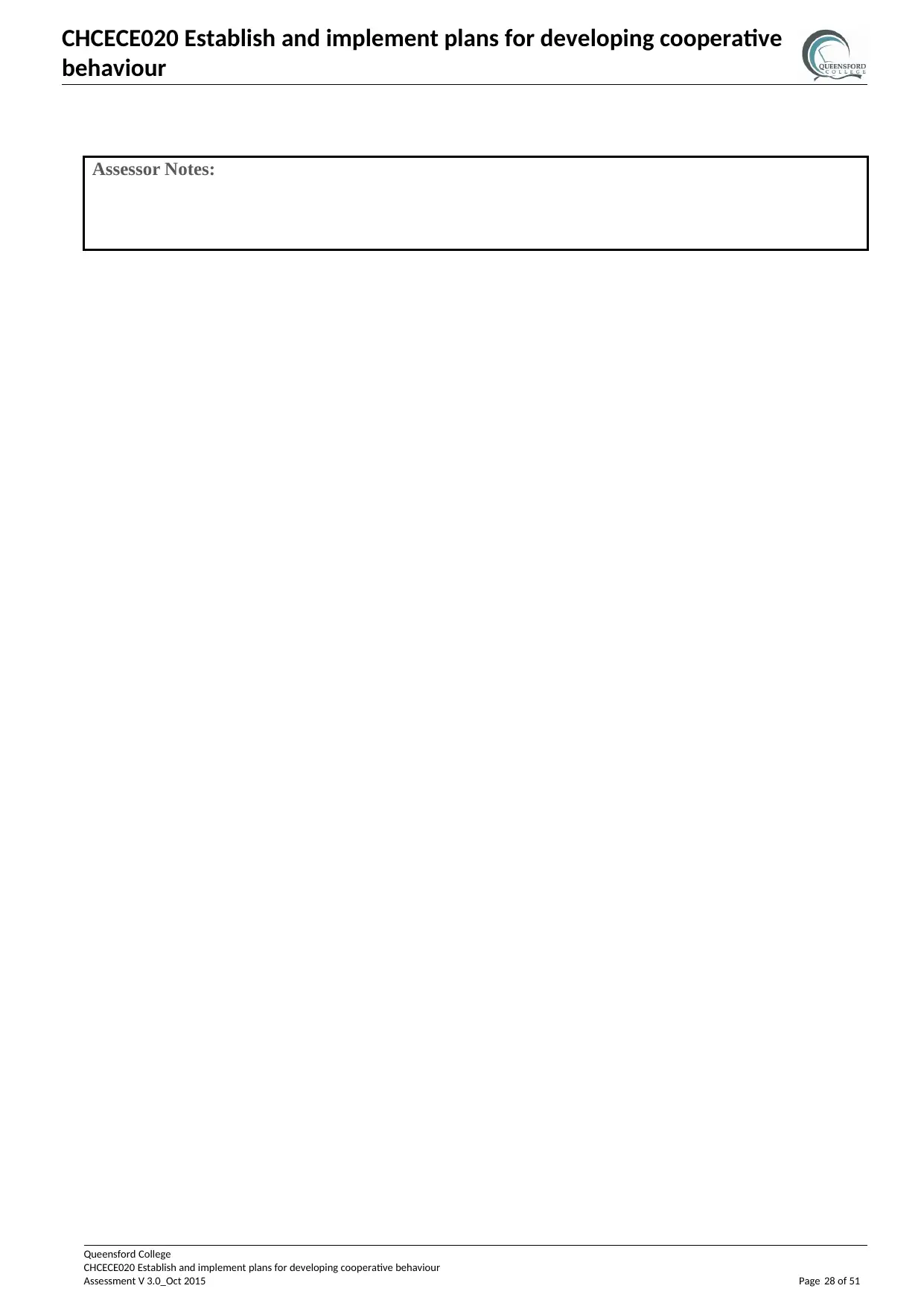
CHCECE020 Establish and implement plans for developing cooperative
behaviour
Assessor Notes:
Queensford College
CHCECE020 Establish and implement plans for developing cooperative behaviour
Assessment V 3.0_Oct 2015 Page 28 of 51
behaviour
Assessor Notes:
Queensford College
CHCECE020 Establish and implement plans for developing cooperative behaviour
Assessment V 3.0_Oct 2015 Page 28 of 51
Secure Best Marks with AI Grader
Need help grading? Try our AI Grader for instant feedback on your assignments.
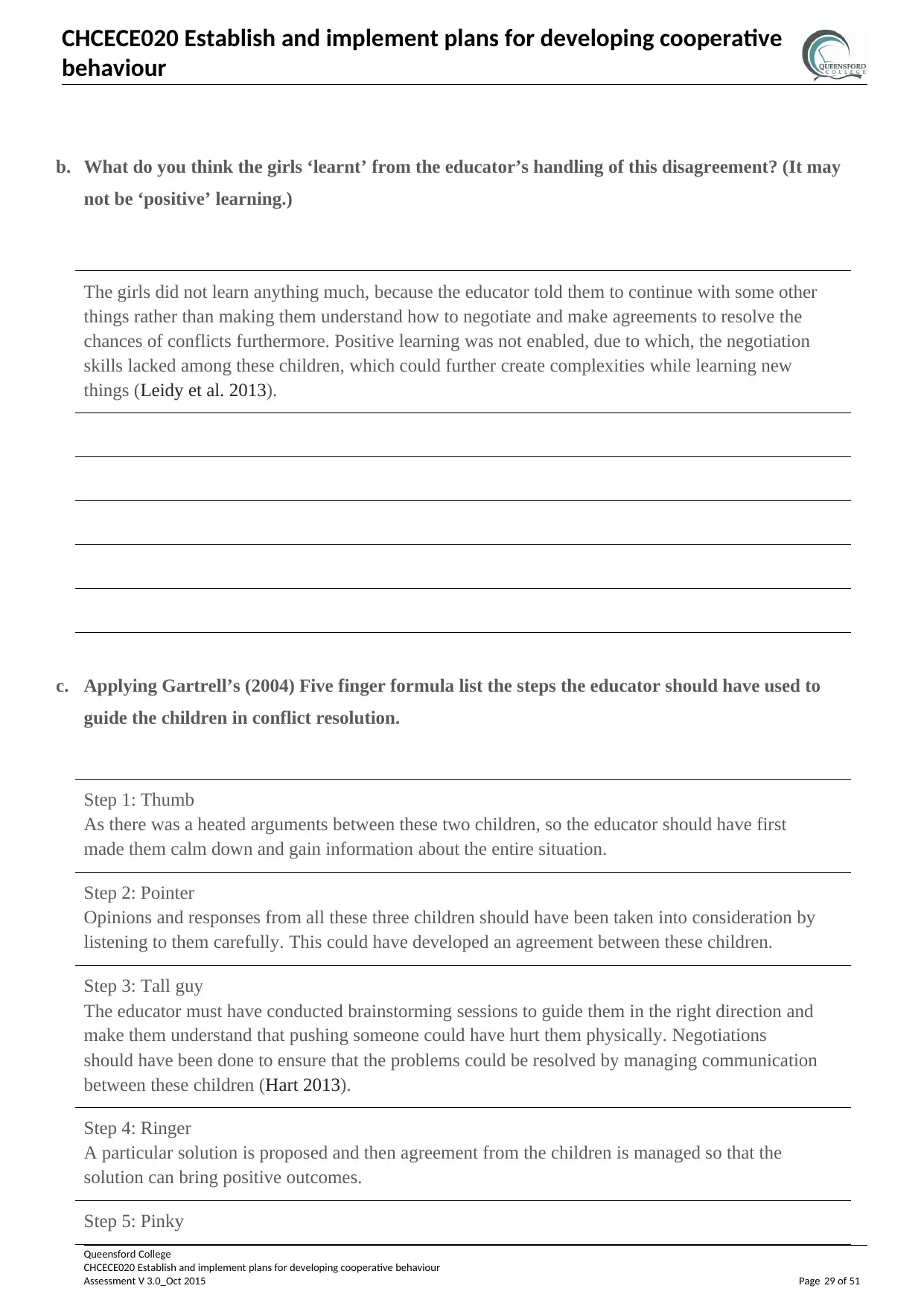
CHCECE020 Establish and implement plans for developing cooperative
behaviour
b. What do you think the girls ‘learnt’ from the educator’s handling of this disagreement? (It may
not be ‘positive’ learning.)
The girls did not learn anything much, because the educator told them to continue with some other
things rather than making them understand how to negotiate and make agreements to resolve the
chances of conflicts furthermore. Positive learning was not enabled, due to which, the negotiation
skills lacked among these children, which could further create complexities while learning new
things (Leidy et al. 2013).
c. Applying Gartrell’s (2004) Five finger formula list the steps the educator should have used to
guide the children in conflict resolution.
Step 1: Thumb
As there was a heated arguments between these two children, so the educator should have first
made them calm down and gain information about the entire situation.
Step 2: Pointer
Opinions and responses from all these three children should have been taken into consideration by
listening to them carefully. This could have developed an agreement between these children.
Step 3: Tall guy
The educator must have conducted brainstorming sessions to guide them in the right direction and
make them understand that pushing someone could have hurt them physically. Negotiations
should have been done to ensure that the problems could be resolved by managing communication
between these children (Hart 2013).
Step 4: Ringer
A particular solution is proposed and then agreement from the children is managed so that the
solution can bring positive outcomes.
Step 5: Pinky
Queensford College
CHCECE020 Establish and implement plans for developing cooperative behaviour
Assessment V 3.0_Oct 2015 Page 29 of 51
behaviour
b. What do you think the girls ‘learnt’ from the educator’s handling of this disagreement? (It may
not be ‘positive’ learning.)
The girls did not learn anything much, because the educator told them to continue with some other
things rather than making them understand how to negotiate and make agreements to resolve the
chances of conflicts furthermore. Positive learning was not enabled, due to which, the negotiation
skills lacked among these children, which could further create complexities while learning new
things (Leidy et al. 2013).
c. Applying Gartrell’s (2004) Five finger formula list the steps the educator should have used to
guide the children in conflict resolution.
Step 1: Thumb
As there was a heated arguments between these two children, so the educator should have first
made them calm down and gain information about the entire situation.
Step 2: Pointer
Opinions and responses from all these three children should have been taken into consideration by
listening to them carefully. This could have developed an agreement between these children.
Step 3: Tall guy
The educator must have conducted brainstorming sessions to guide them in the right direction and
make them understand that pushing someone could have hurt them physically. Negotiations
should have been done to ensure that the problems could be resolved by managing communication
between these children (Hart 2013).
Step 4: Ringer
A particular solution is proposed and then agreement from the children is managed so that the
solution can bring positive outcomes.
Step 5: Pinky
Queensford College
CHCECE020 Establish and implement plans for developing cooperative behaviour
Assessment V 3.0_Oct 2015 Page 29 of 51
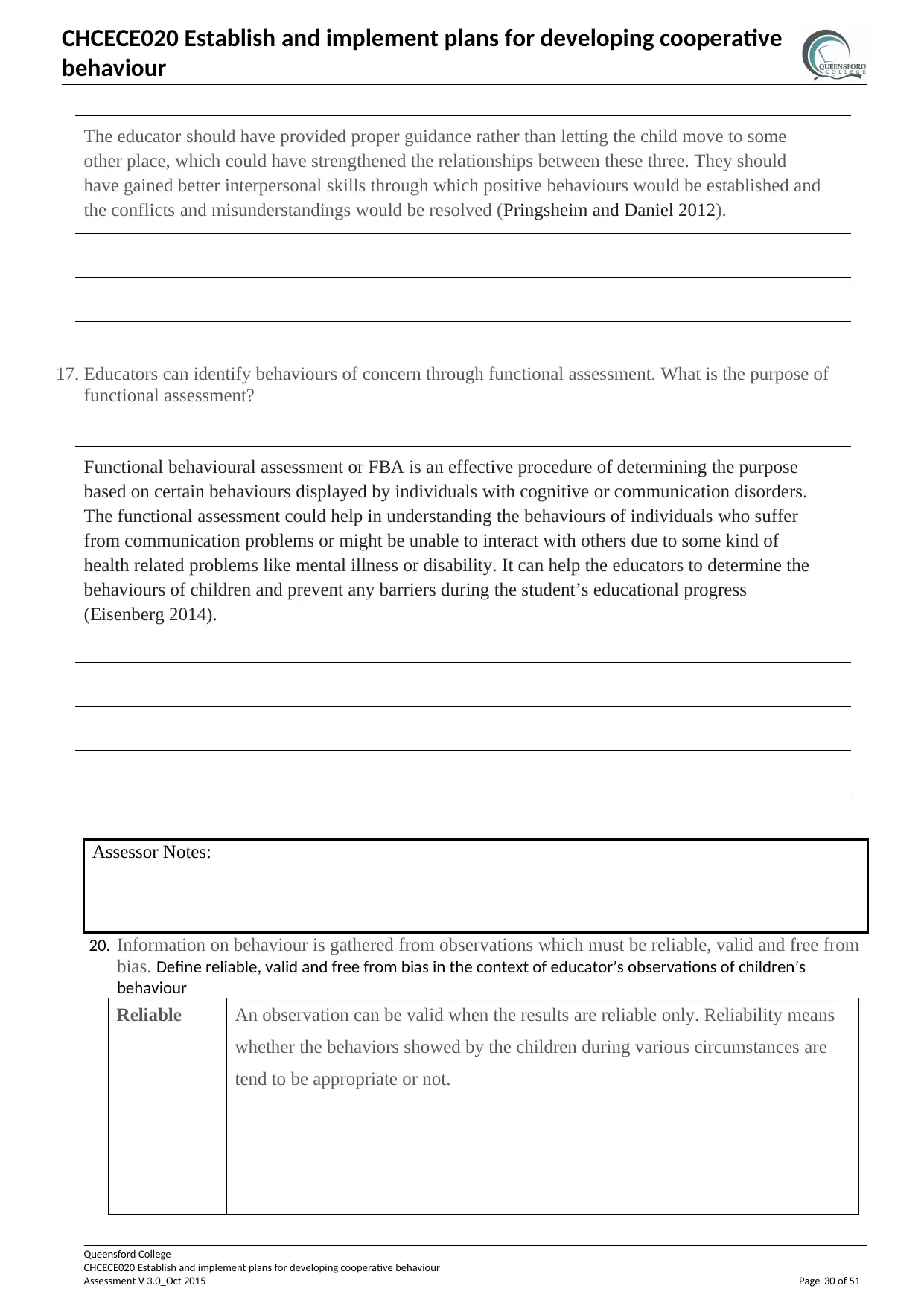
CHCECE020 Establish and implement plans for developing cooperative
behaviour
The educator should have provided proper guidance rather than letting the child move to some
other place, which could have strengthened the relationships between these three. They should
have gained better interpersonal skills through which positive behaviours would be established and
the conflicts and misunderstandings would be resolved (Pringsheim and Daniel 2012).
17. Educators can identify behaviours of concern through functional assessment. What is the purpose of
functional assessment?
Functional behavioural assessment or FBA is an effective procedure of determining the purpose
based on certain behaviours displayed by individuals with cognitive or communication disorders.
The functional assessment could help in understanding the behaviours of individuals who suffer
from communication problems or might be unable to interact with others due to some kind of
health related problems like mental illness or disability. It can help the educators to determine the
behaviours of children and prevent any barriers during the student’s educational progress
(Eisenberg 2014).
Assessor Notes:
20. Information on behaviour is gathered from observations which must be reliable, valid and free from
bias. Define reliable, valid and free from bias in the context of educator’s observations of children’s
behaviour
Reliable An observation can be valid when the results are reliable only. Reliability means
whether the behaviors showed by the children during various circumstances are
tend to be appropriate or not.
Queensford College
CHCECE020 Establish and implement plans for developing cooperative behaviour
Assessment V 3.0_Oct 2015 Page 30 of 51
behaviour
The educator should have provided proper guidance rather than letting the child move to some
other place, which could have strengthened the relationships between these three. They should
have gained better interpersonal skills through which positive behaviours would be established and
the conflicts and misunderstandings would be resolved (Pringsheim and Daniel 2012).
17. Educators can identify behaviours of concern through functional assessment. What is the purpose of
functional assessment?
Functional behavioural assessment or FBA is an effective procedure of determining the purpose
based on certain behaviours displayed by individuals with cognitive or communication disorders.
The functional assessment could help in understanding the behaviours of individuals who suffer
from communication problems or might be unable to interact with others due to some kind of
health related problems like mental illness or disability. It can help the educators to determine the
behaviours of children and prevent any barriers during the student’s educational progress
(Eisenberg 2014).
Assessor Notes:
20. Information on behaviour is gathered from observations which must be reliable, valid and free from
bias. Define reliable, valid and free from bias in the context of educator’s observations of children’s
behaviour
Reliable An observation can be valid when the results are reliable only. Reliability means
whether the behaviors showed by the children during various circumstances are
tend to be appropriate or not.
Queensford College
CHCECE020 Establish and implement plans for developing cooperative behaviour
Assessment V 3.0_Oct 2015 Page 30 of 51
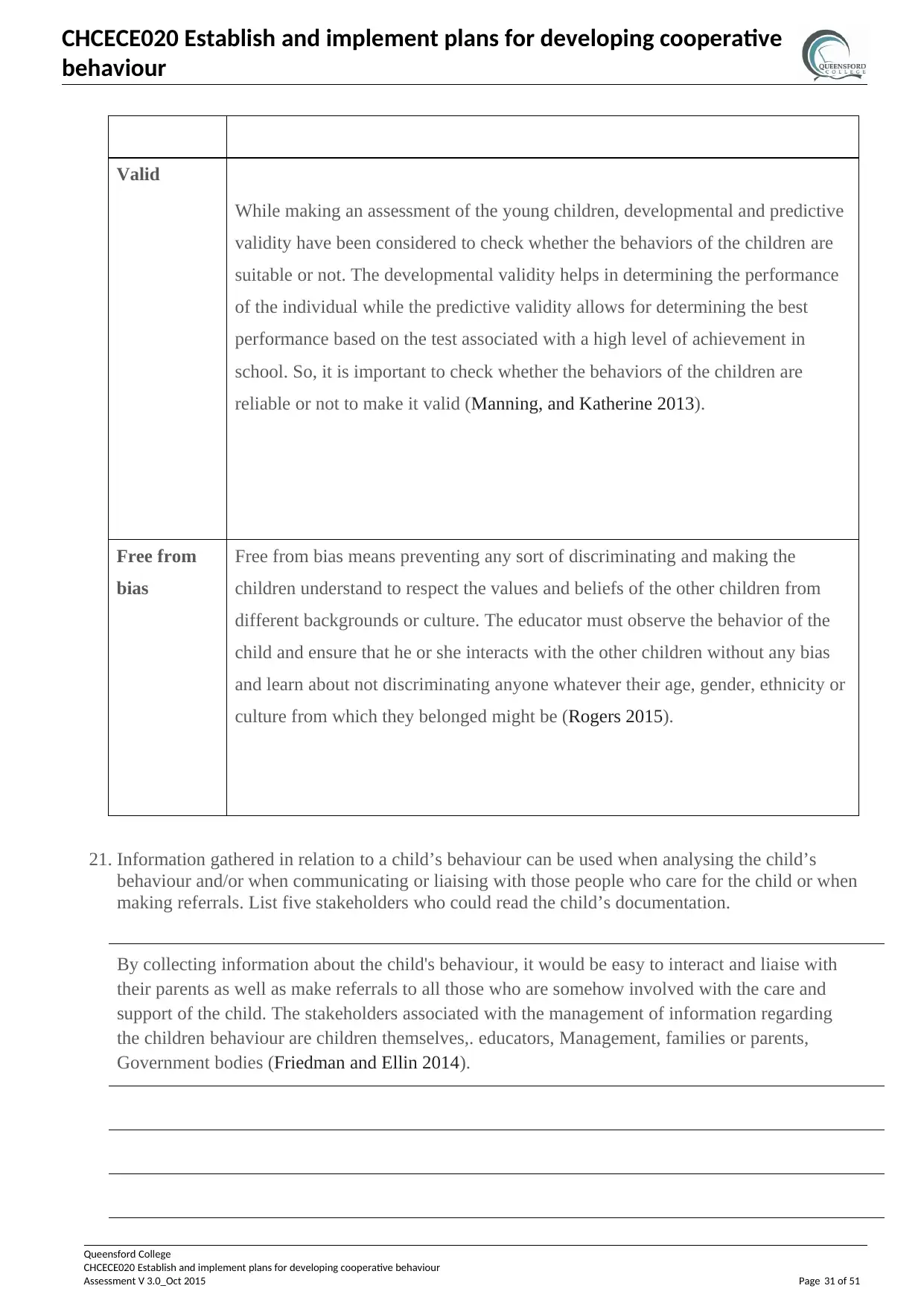
CHCECE020 Establish and implement plans for developing cooperative
behaviour
Valid
While making an assessment of the young children, developmental and predictive
validity have been considered to check whether the behaviors of the children are
suitable or not. The developmental validity helps in determining the performance
of the individual while the predictive validity allows for determining the best
performance based on the test associated with a high level of achievement in
school. So, it is important to check whether the behaviors of the children are
reliable or not to make it valid (Manning, and Katherine 2013).
Free from
bias
Free from bias means preventing any sort of discriminating and making the
children understand to respect the values and beliefs of the other children from
different backgrounds or culture. The educator must observe the behavior of the
child and ensure that he or she interacts with the other children without any bias
and learn about not discriminating anyone whatever their age, gender, ethnicity or
culture from which they belonged might be (Rogers 2015).
21. Information gathered in relation to a child’s behaviour can be used when analysing the child’s
behaviour and/or when communicating or liaising with those people who care for the child or when
making referrals. List five stakeholders who could read the child’s documentation.
By collecting information about the child's behaviour, it would be easy to interact and liaise with
their parents as well as make referrals to all those who are somehow involved with the care and
support of the child. The stakeholders associated with the management of information regarding
the children behaviour are children themselves,. educators, Management, families or parents,
Government bodies (Friedman and Ellin 2014).
Queensford College
CHCECE020 Establish and implement plans for developing cooperative behaviour
Assessment V 3.0_Oct 2015 Page 31 of 51
behaviour
Valid
While making an assessment of the young children, developmental and predictive
validity have been considered to check whether the behaviors of the children are
suitable or not. The developmental validity helps in determining the performance
of the individual while the predictive validity allows for determining the best
performance based on the test associated with a high level of achievement in
school. So, it is important to check whether the behaviors of the children are
reliable or not to make it valid (Manning, and Katherine 2013).
Free from
bias
Free from bias means preventing any sort of discriminating and making the
children understand to respect the values and beliefs of the other children from
different backgrounds or culture. The educator must observe the behavior of the
child and ensure that he or she interacts with the other children without any bias
and learn about not discriminating anyone whatever their age, gender, ethnicity or
culture from which they belonged might be (Rogers 2015).
21. Information gathered in relation to a child’s behaviour can be used when analysing the child’s
behaviour and/or when communicating or liaising with those people who care for the child or when
making referrals. List five stakeholders who could read the child’s documentation.
By collecting information about the child's behaviour, it would be easy to interact and liaise with
their parents as well as make referrals to all those who are somehow involved with the care and
support of the child. The stakeholders associated with the management of information regarding
the children behaviour are children themselves,. educators, Management, families or parents,
Government bodies (Friedman and Ellin 2014).
Queensford College
CHCECE020 Establish and implement plans for developing cooperative behaviour
Assessment V 3.0_Oct 2015 Page 31 of 51
Paraphrase This Document
Need a fresh take? Get an instant paraphrase of this document with our AI Paraphraser
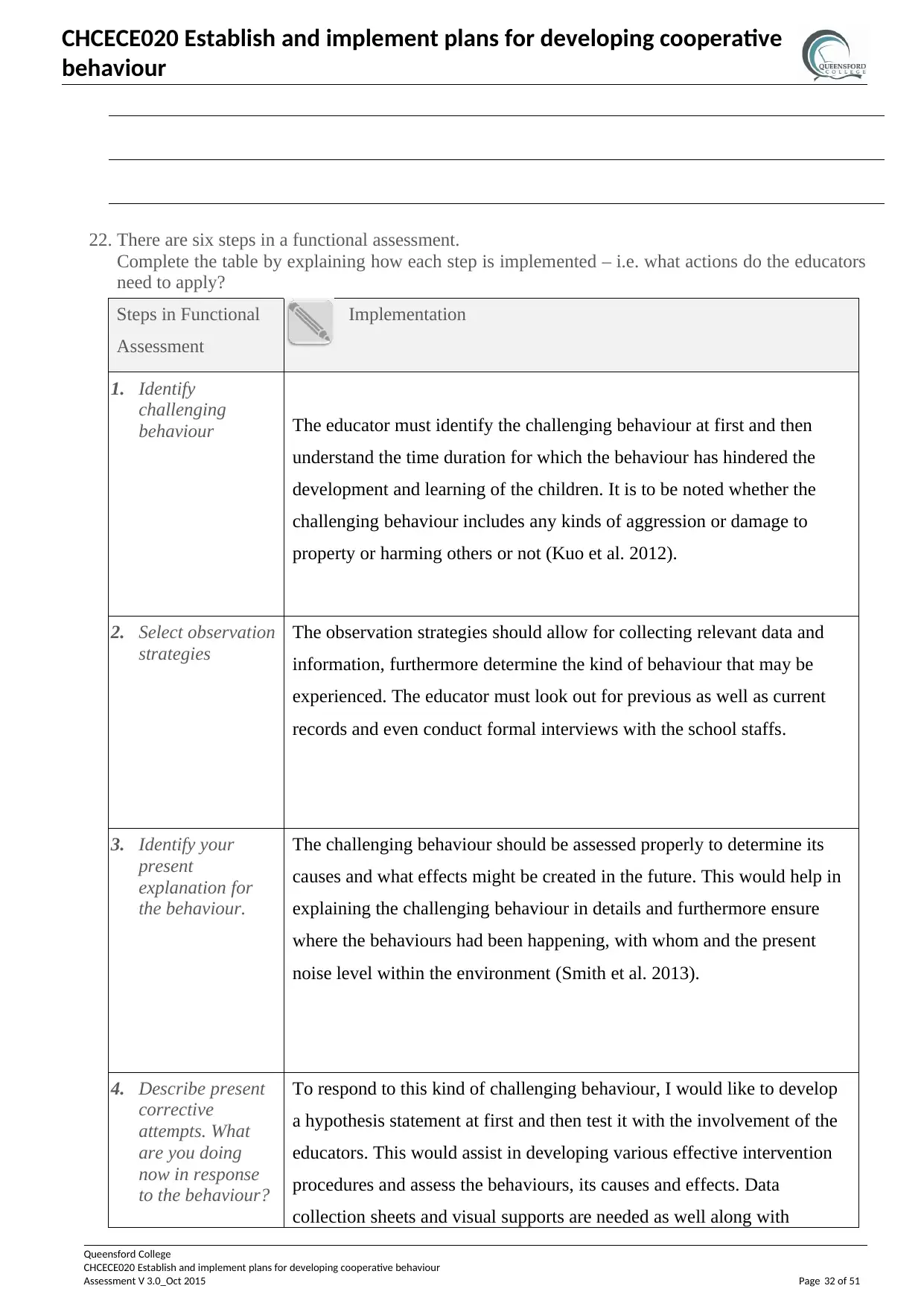
CHCECE020 Establish and implement plans for developing cooperative
behaviour
22. There are six steps in a functional assessment.
Complete the table by explaining how each step is implemented – i.e. what actions do the educators
need to apply?
Steps in Functional
Assessment
Implementation
1. Identify
challenging
behaviour The educator must identify the challenging behaviour at first and then
understand the time duration for which the behaviour has hindered the
development and learning of the children. It is to be noted whether the
challenging behaviour includes any kinds of aggression or damage to
property or harming others or not (Kuo et al. 2012).
2. Select observation
strategies
The observation strategies should allow for collecting relevant data and
information, furthermore determine the kind of behaviour that may be
experienced. The educator must look out for previous as well as current
records and even conduct formal interviews with the school staffs.
3. Identify your
present
explanation for
the behaviour.
The challenging behaviour should be assessed properly to determine its
causes and what effects might be created in the future. This would help in
explaining the challenging behaviour in details and furthermore ensure
where the behaviours had been happening, with whom and the present
noise level within the environment (Smith et al. 2013).
4. Describe present
corrective
attempts. What
are you doing
now in response
to the behaviour?
To respond to this kind of challenging behaviour, I would like to develop
a hypothesis statement at first and then test it with the involvement of the
educators. This would assist in developing various effective intervention
procedures and assess the behaviours, its causes and effects. Data
collection sheets and visual supports are needed as well along with
Queensford College
CHCECE020 Establish and implement plans for developing cooperative behaviour
Assessment V 3.0_Oct 2015 Page 32 of 51
behaviour
22. There are six steps in a functional assessment.
Complete the table by explaining how each step is implemented – i.e. what actions do the educators
need to apply?
Steps in Functional
Assessment
Implementation
1. Identify
challenging
behaviour The educator must identify the challenging behaviour at first and then
understand the time duration for which the behaviour has hindered the
development and learning of the children. It is to be noted whether the
challenging behaviour includes any kinds of aggression or damage to
property or harming others or not (Kuo et al. 2012).
2. Select observation
strategies
The observation strategies should allow for collecting relevant data and
information, furthermore determine the kind of behaviour that may be
experienced. The educator must look out for previous as well as current
records and even conduct formal interviews with the school staffs.
3. Identify your
present
explanation for
the behaviour.
The challenging behaviour should be assessed properly to determine its
causes and what effects might be created in the future. This would help in
explaining the challenging behaviour in details and furthermore ensure
where the behaviours had been happening, with whom and the present
noise level within the environment (Smith et al. 2013).
4. Describe present
corrective
attempts. What
are you doing
now in response
to the behaviour?
To respond to this kind of challenging behaviour, I would like to develop
a hypothesis statement at first and then test it with the involvement of the
educators. This would assist in developing various effective intervention
procedures and assess the behaviours, its causes and effects. Data
collection sheets and visual supports are needed as well along with
Queensford College
CHCECE020 Establish and implement plans for developing cooperative behaviour
Assessment V 3.0_Oct 2015 Page 32 of 51
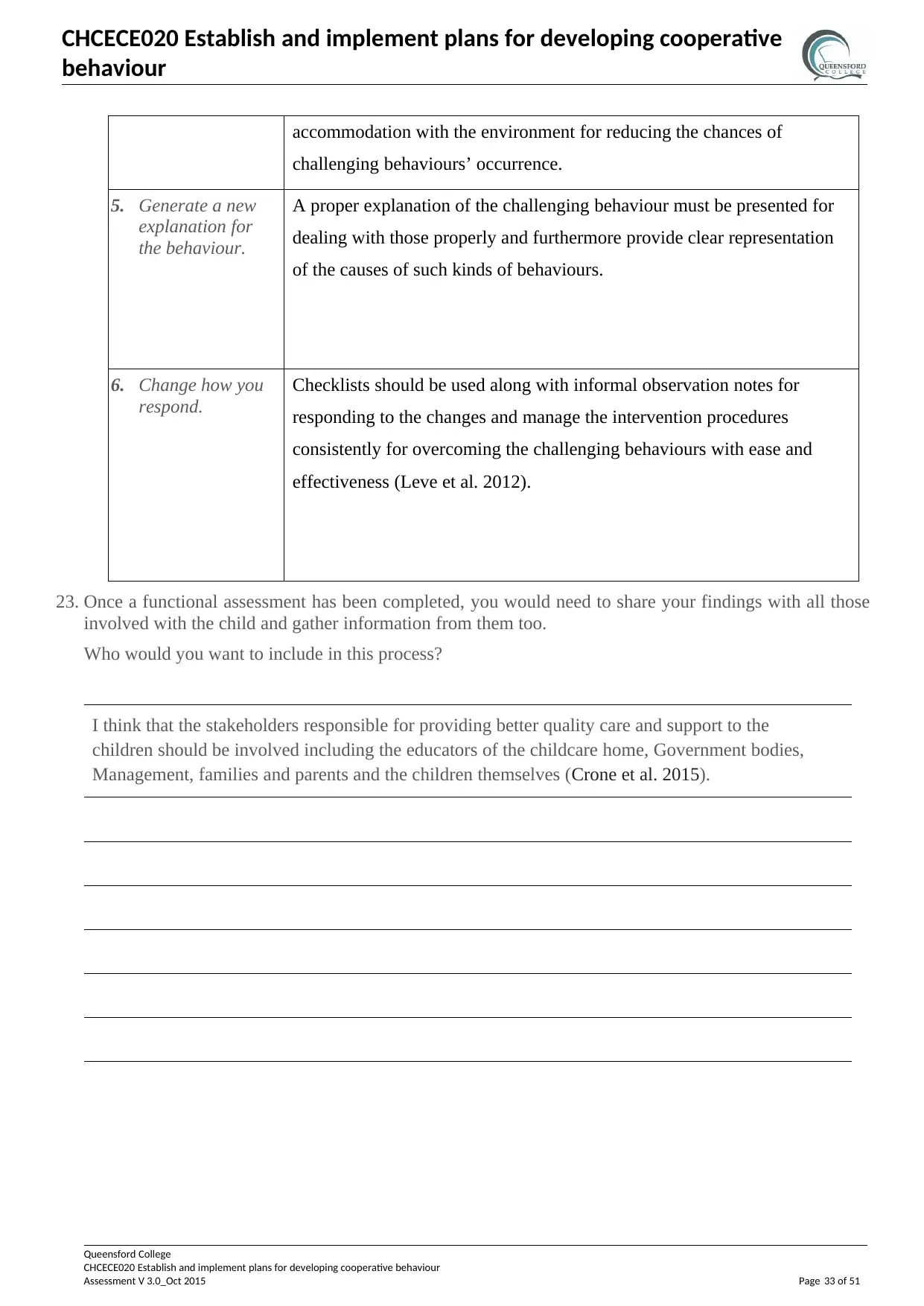
CHCECE020 Establish and implement plans for developing cooperative
behaviour
accommodation with the environment for reducing the chances of
challenging behaviours’ occurrence.
5. Generate a new
explanation for
the behaviour.
A proper explanation of the challenging behaviour must be presented for
dealing with those properly and furthermore provide clear representation
of the causes of such kinds of behaviours.
6. Change how you
respond.
Checklists should be used along with informal observation notes for
responding to the changes and manage the intervention procedures
consistently for overcoming the challenging behaviours with ease and
effectiveness (Leve et al. 2012).
23. Once a functional assessment has been completed, you would need to share your findings with all those
involved with the child and gather information from them too.
Who would you want to include in this process?
I think that the stakeholders responsible for providing better quality care and support to the
children should be involved including the educators of the childcare home, Government bodies,
Management, families and parents and the children themselves (Crone et al. 2015).
Queensford College
CHCECE020 Establish and implement plans for developing cooperative behaviour
Assessment V 3.0_Oct 2015 Page 33 of 51
behaviour
accommodation with the environment for reducing the chances of
challenging behaviours’ occurrence.
5. Generate a new
explanation for
the behaviour.
A proper explanation of the challenging behaviour must be presented for
dealing with those properly and furthermore provide clear representation
of the causes of such kinds of behaviours.
6. Change how you
respond.
Checklists should be used along with informal observation notes for
responding to the changes and manage the intervention procedures
consistently for overcoming the challenging behaviours with ease and
effectiveness (Leve et al. 2012).
23. Once a functional assessment has been completed, you would need to share your findings with all those
involved with the child and gather information from them too.
Who would you want to include in this process?
I think that the stakeholders responsible for providing better quality care and support to the
children should be involved including the educators of the childcare home, Government bodies,
Management, families and parents and the children themselves (Crone et al. 2015).
Queensford College
CHCECE020 Establish and implement plans for developing cooperative behaviour
Assessment V 3.0_Oct 2015 Page 33 of 51
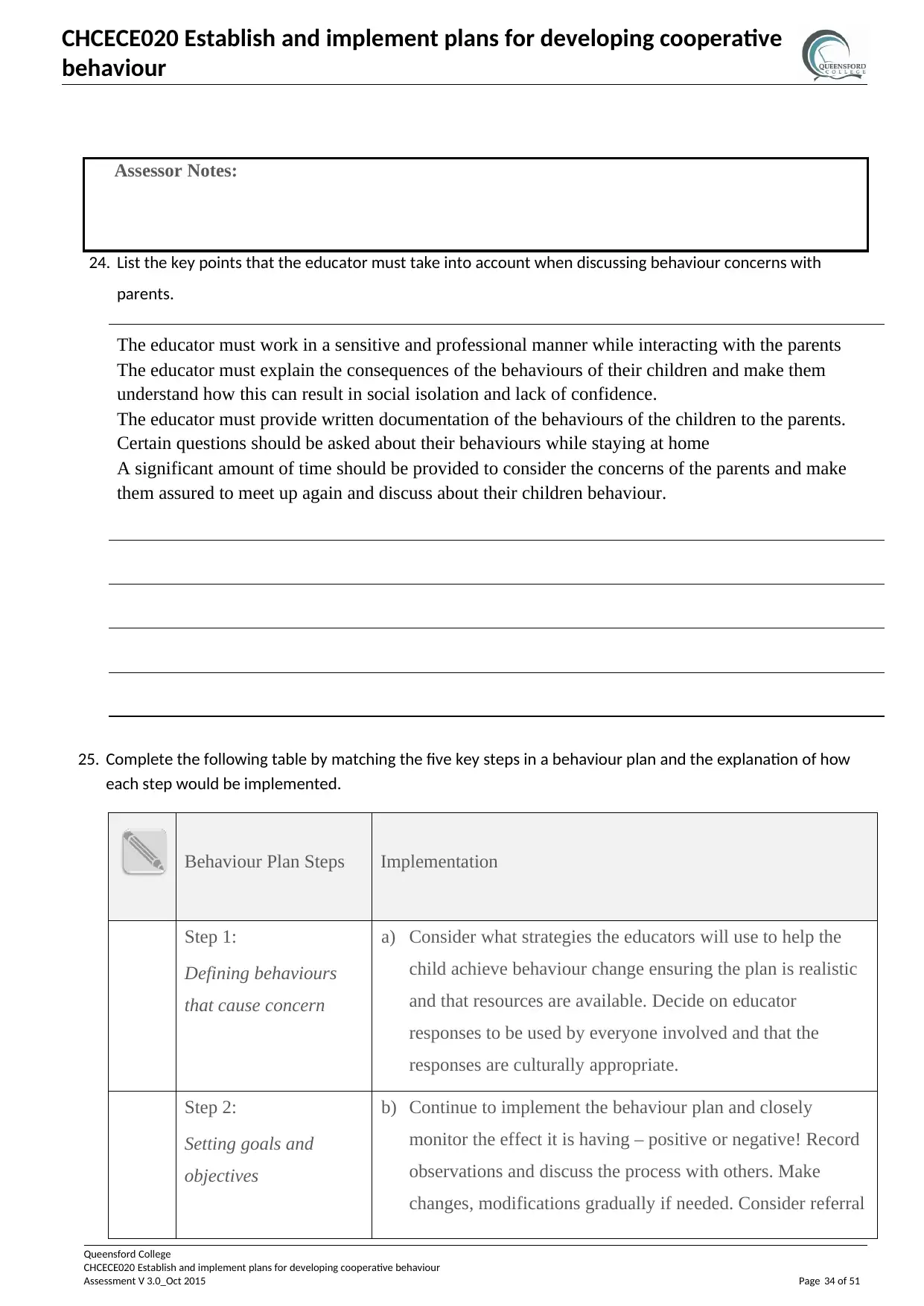
CHCECE020 Establish and implement plans for developing cooperative
behaviour
Assessor Notes:
24. List the key points that the educator must take into account when discussing behaviour concerns with
parents.
The educator must work in a sensitive and professional manner while interacting with the parents
The educator must explain the consequences of the behaviours of their children and make them
understand how this can result in social isolation and lack of confidence.
The educator must provide written documentation of the behaviours of the children to the parents.
Certain questions should be asked about their behaviours while staying at home
A significant amount of time should be provided to consider the concerns of the parents and make
them assured to meet up again and discuss about their children behaviour.
25. Complete the following table by matching the five key steps in a behaviour plan and the explanation of how
each step would be implemented.
Behaviour Plan Steps Implementation
Step 1:
Defining behaviours
that cause concern
a) Consider what strategies the educators will use to help the
child achieve behaviour change ensuring the plan is realistic
and that resources are available. Decide on educator
responses to be used by everyone involved and that the
responses are culturally appropriate.
Step 2:
Setting goals and
objectives
b) Continue to implement the behaviour plan and closely
monitor the effect it is having – positive or negative! Record
observations and discuss the process with others. Make
changes, modifications gradually if needed. Consider referral
Queensford College
CHCECE020 Establish and implement plans for developing cooperative behaviour
Assessment V 3.0_Oct 2015 Page 34 of 51
behaviour
Assessor Notes:
24. List the key points that the educator must take into account when discussing behaviour concerns with
parents.
The educator must work in a sensitive and professional manner while interacting with the parents
The educator must explain the consequences of the behaviours of their children and make them
understand how this can result in social isolation and lack of confidence.
The educator must provide written documentation of the behaviours of the children to the parents.
Certain questions should be asked about their behaviours while staying at home
A significant amount of time should be provided to consider the concerns of the parents and make
them assured to meet up again and discuss about their children behaviour.
25. Complete the following table by matching the five key steps in a behaviour plan and the explanation of how
each step would be implemented.
Behaviour Plan Steps Implementation
Step 1:
Defining behaviours
that cause concern
a) Consider what strategies the educators will use to help the
child achieve behaviour change ensuring the plan is realistic
and that resources are available. Decide on educator
responses to be used by everyone involved and that the
responses are culturally appropriate.
Step 2:
Setting goals and
objectives
b) Continue to implement the behaviour plan and closely
monitor the effect it is having – positive or negative! Record
observations and discuss the process with others. Make
changes, modifications gradually if needed. Consider referral
Queensford College
CHCECE020 Establish and implement plans for developing cooperative behaviour
Assessment V 3.0_Oct 2015 Page 34 of 51
Secure Best Marks with AI Grader
Need help grading? Try our AI Grader for instant feedback on your assignments.
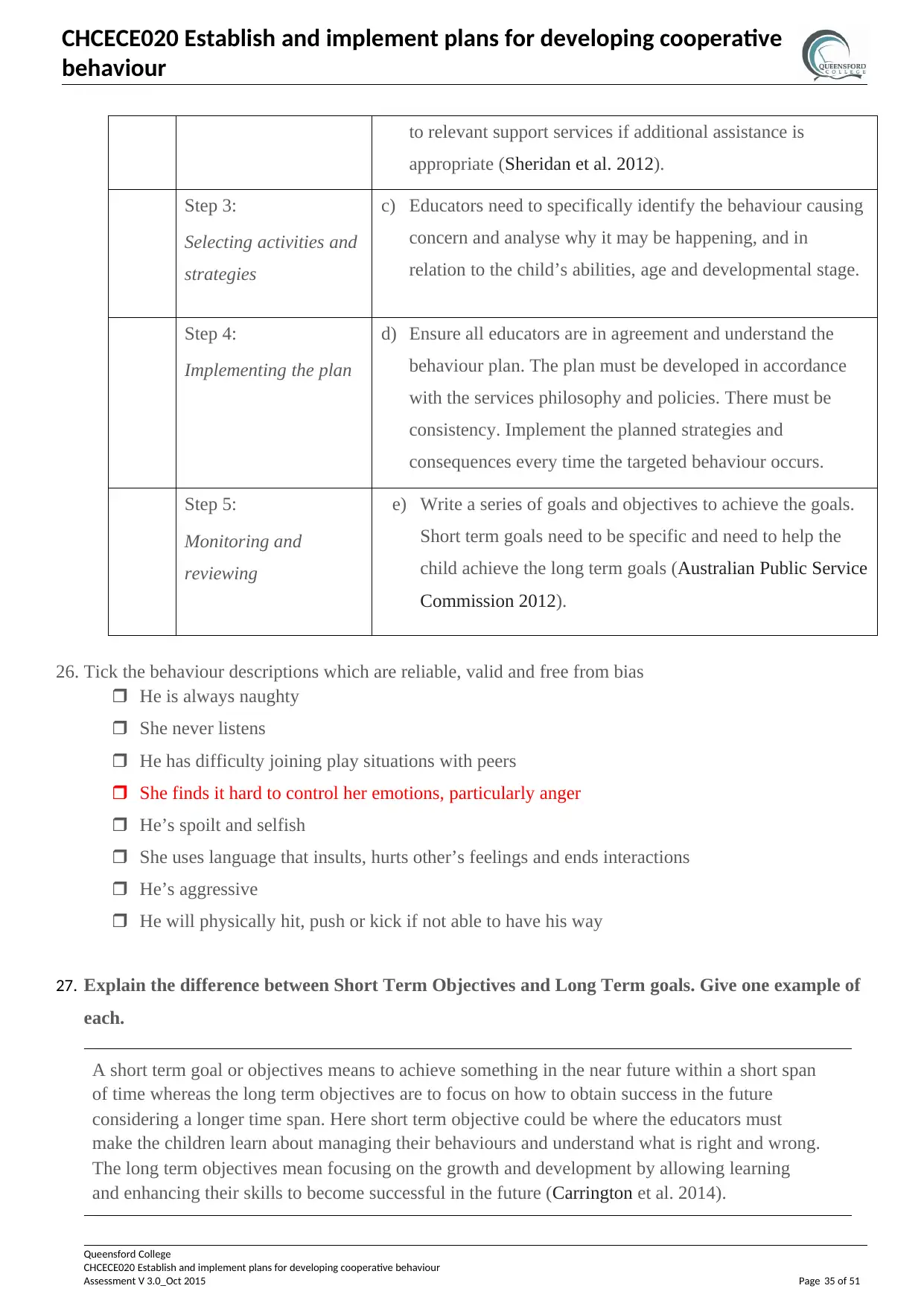
CHCECE020 Establish and implement plans for developing cooperative
behaviour
to relevant support services if additional assistance is
appropriate (Sheridan et al. 2012).
Step 3:
Selecting activities and
strategies
c) Educators need to specifically identify the behaviour causing
concern and analyse why it may be happening, and in
relation to the child’s abilities, age and developmental stage.
Step 4:
Implementing the plan
d) Ensure all educators are in agreement and understand the
behaviour plan. The plan must be developed in accordance
with the services philosophy and policies. There must be
consistency. Implement the planned strategies and
consequences every time the targeted behaviour occurs.
Step 5:
Monitoring and
reviewing
e) Write a series of goals and objectives to achieve the goals.
Short term goals need to be specific and need to help the
child achieve the long term goals (Australian Public Service
Commission 2012).
26. Tick the behaviour descriptions which are reliable, valid and free from bias
He is always naughty
She never listens
He has difficulty joining play situations with peers
She finds it hard to control her emotions, particularly anger
He’s spoilt and selfish
She uses language that insults, hurts other’s feelings and ends interactions
He’s aggressive
He will physically hit, push or kick if not able to have his way
27. Explain the difference between Short Term Objectives and Long Term goals. Give one example of
each.
A short term goal or objectives means to achieve something in the near future within a short span
of time whereas the long term objectives are to focus on how to obtain success in the future
considering a longer time span. Here short term objective could be where the educators must
make the children learn about managing their behaviours and understand what is right and wrong.
The long term objectives mean focusing on the growth and development by allowing learning
and enhancing their skills to become successful in the future (Carrington et al. 2014).
Queensford College
CHCECE020 Establish and implement plans for developing cooperative behaviour
Assessment V 3.0_Oct 2015 Page 35 of 51
behaviour
to relevant support services if additional assistance is
appropriate (Sheridan et al. 2012).
Step 3:
Selecting activities and
strategies
c) Educators need to specifically identify the behaviour causing
concern and analyse why it may be happening, and in
relation to the child’s abilities, age and developmental stage.
Step 4:
Implementing the plan
d) Ensure all educators are in agreement and understand the
behaviour plan. The plan must be developed in accordance
with the services philosophy and policies. There must be
consistency. Implement the planned strategies and
consequences every time the targeted behaviour occurs.
Step 5:
Monitoring and
reviewing
e) Write a series of goals and objectives to achieve the goals.
Short term goals need to be specific and need to help the
child achieve the long term goals (Australian Public Service
Commission 2012).
26. Tick the behaviour descriptions which are reliable, valid and free from bias
He is always naughty
She never listens
He has difficulty joining play situations with peers
She finds it hard to control her emotions, particularly anger
He’s spoilt and selfish
She uses language that insults, hurts other’s feelings and ends interactions
He’s aggressive
He will physically hit, push or kick if not able to have his way
27. Explain the difference between Short Term Objectives and Long Term goals. Give one example of
each.
A short term goal or objectives means to achieve something in the near future within a short span
of time whereas the long term objectives are to focus on how to obtain success in the future
considering a longer time span. Here short term objective could be where the educators must
make the children learn about managing their behaviours and understand what is right and wrong.
The long term objectives mean focusing on the growth and development by allowing learning
and enhancing their skills to become successful in the future (Carrington et al. 2014).
Queensford College
CHCECE020 Establish and implement plans for developing cooperative behaviour
Assessment V 3.0_Oct 2015 Page 35 of 51
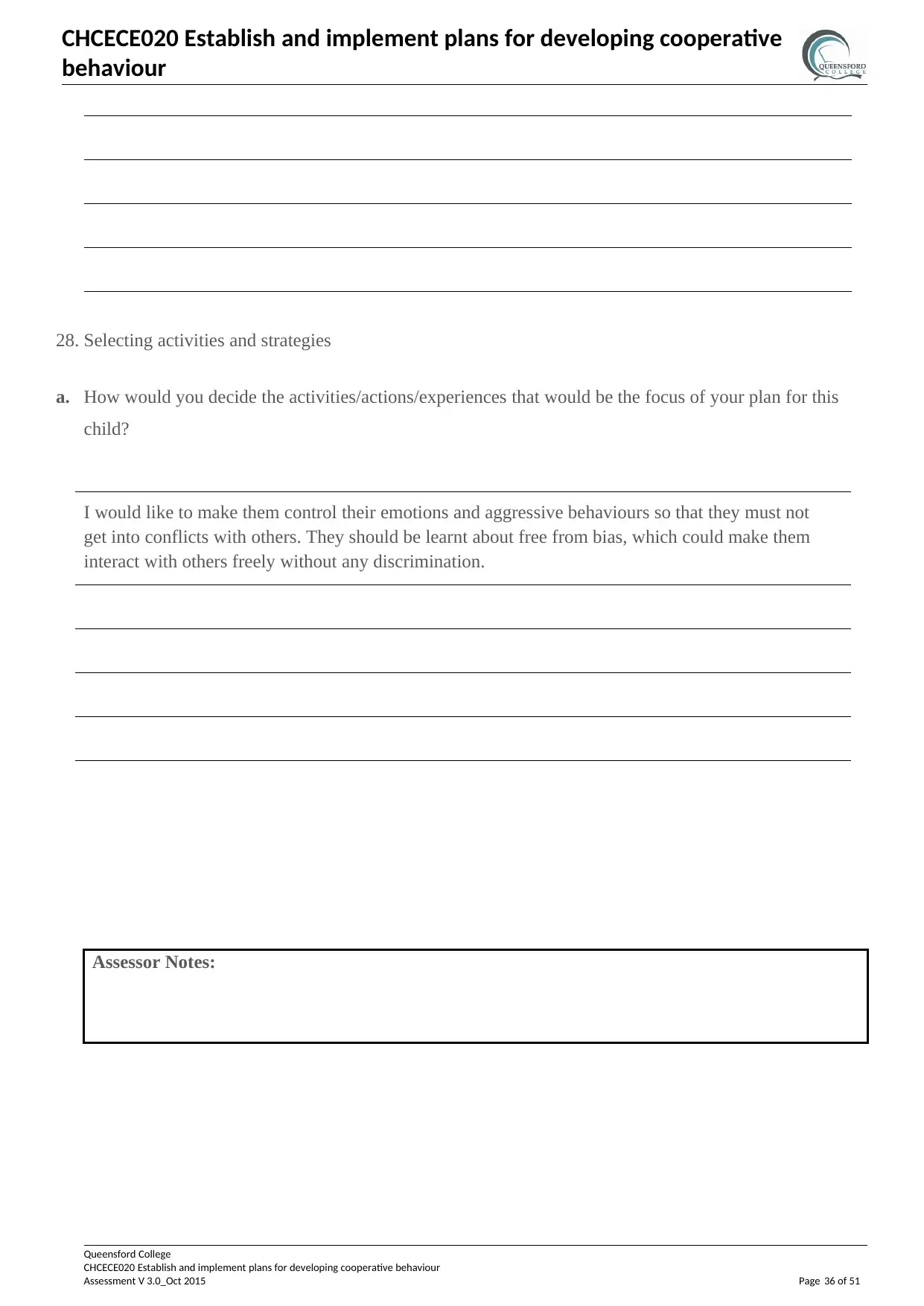
CHCECE020 Establish and implement plans for developing cooperative
behaviour
28. Selecting activities and strategies
a. How would you decide the activities/actions/experiences that would be the focus of your plan for this
child?
I would like to make them control their emotions and aggressive behaviours so that they must not
get into conflicts with others. They should be learnt about free from bias, which could make them
interact with others freely without any discrimination.
Assessor Notes:
Queensford College
CHCECE020 Establish and implement plans for developing cooperative behaviour
Assessment V 3.0_Oct 2015 Page 36 of 51
behaviour
28. Selecting activities and strategies
a. How would you decide the activities/actions/experiences that would be the focus of your plan for this
child?
I would like to make them control their emotions and aggressive behaviours so that they must not
get into conflicts with others. They should be learnt about free from bias, which could make them
interact with others freely without any discrimination.
Assessor Notes:
Queensford College
CHCECE020 Establish and implement plans for developing cooperative behaviour
Assessment V 3.0_Oct 2015 Page 36 of 51
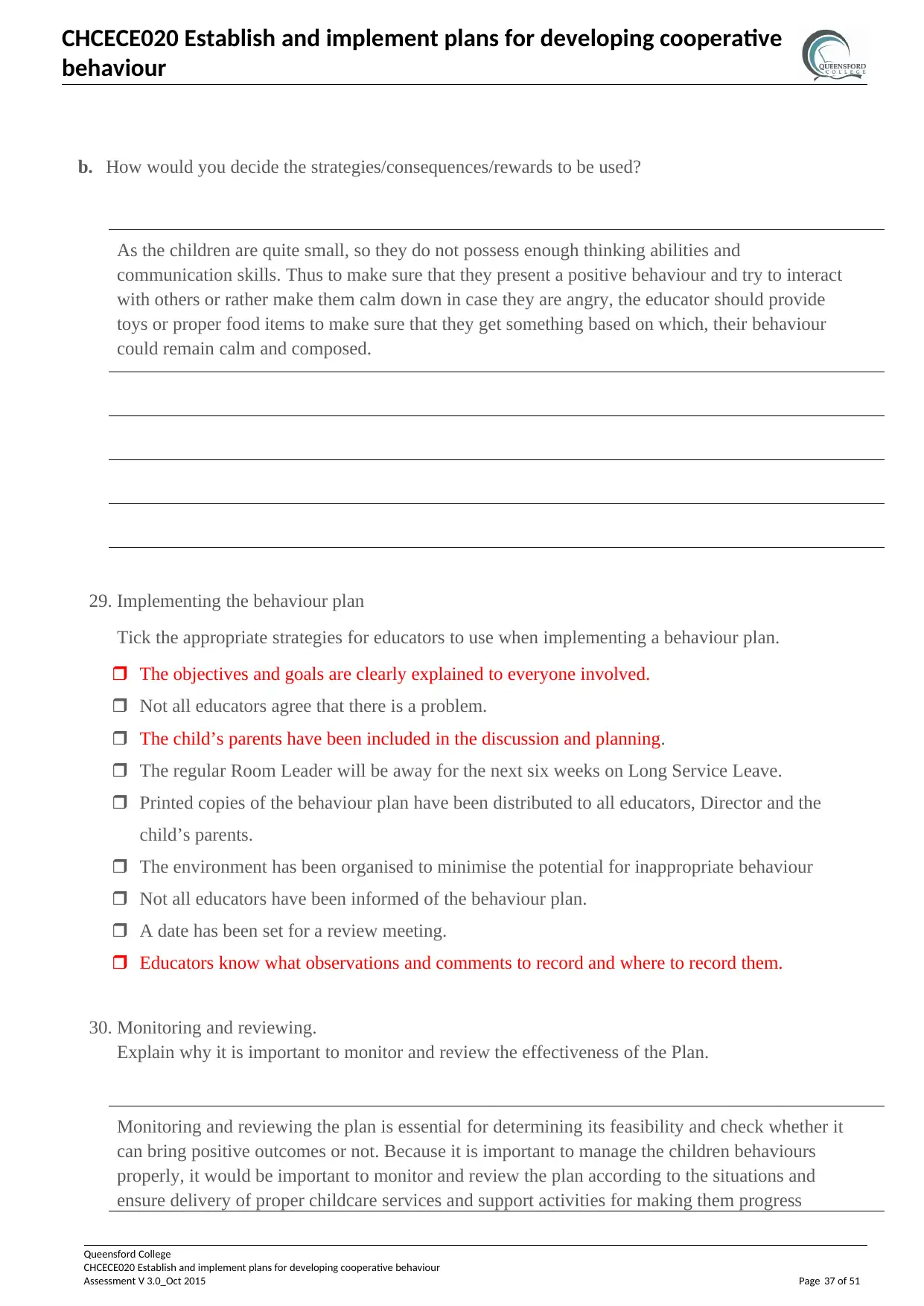
CHCECE020 Establish and implement plans for developing cooperative
behaviour
b. How would you decide the strategies/consequences/rewards to be used?
As the children are quite small, so they do not possess enough thinking abilities and
communication skills. Thus to make sure that they present a positive behaviour and try to interact
with others or rather make them calm down in case they are angry, the educator should provide
toys or proper food items to make sure that they get something based on which, their behaviour
could remain calm and composed.
29. Implementing the behaviour plan
Tick the appropriate strategies for educators to use when implementing a behaviour plan.
The objectives and goals are clearly explained to everyone involved.
Not all educators agree that there is a problem.
The child’s parents have been included in the discussion and planning.
The regular Room Leader will be away for the next six weeks on Long Service Leave.
Printed copies of the behaviour plan have been distributed to all educators, Director and the
child’s parents.
The environment has been organised to minimise the potential for inappropriate behaviour
Not all educators have been informed of the behaviour plan.
A date has been set for a review meeting.
Educators know what observations and comments to record and where to record them.
30. Monitoring and reviewing.
Explain why it is important to monitor and review the effectiveness of the Plan.
Monitoring and reviewing the plan is essential for determining its feasibility and check whether it
can bring positive outcomes or not. Because it is important to manage the children behaviours
properly, it would be important to monitor and review the plan according to the situations and
ensure delivery of proper childcare services and support activities for making them progress
Queensford College
CHCECE020 Establish and implement plans for developing cooperative behaviour
Assessment V 3.0_Oct 2015 Page 37 of 51
behaviour
b. How would you decide the strategies/consequences/rewards to be used?
As the children are quite small, so they do not possess enough thinking abilities and
communication skills. Thus to make sure that they present a positive behaviour and try to interact
with others or rather make them calm down in case they are angry, the educator should provide
toys or proper food items to make sure that they get something based on which, their behaviour
could remain calm and composed.
29. Implementing the behaviour plan
Tick the appropriate strategies for educators to use when implementing a behaviour plan.
The objectives and goals are clearly explained to everyone involved.
Not all educators agree that there is a problem.
The child’s parents have been included in the discussion and planning.
The regular Room Leader will be away for the next six weeks on Long Service Leave.
Printed copies of the behaviour plan have been distributed to all educators, Director and the
child’s parents.
The environment has been organised to minimise the potential for inappropriate behaviour
Not all educators have been informed of the behaviour plan.
A date has been set for a review meeting.
Educators know what observations and comments to record and where to record them.
30. Monitoring and reviewing.
Explain why it is important to monitor and review the effectiveness of the Plan.
Monitoring and reviewing the plan is essential for determining its feasibility and check whether it
can bring positive outcomes or not. Because it is important to manage the children behaviours
properly, it would be important to monitor and review the plan according to the situations and
ensure delivery of proper childcare services and support activities for making them progress
Queensford College
CHCECE020 Establish and implement plans for developing cooperative behaviour
Assessment V 3.0_Oct 2015 Page 37 of 51
Paraphrase This Document
Need a fresh take? Get an instant paraphrase of this document with our AI Paraphraser
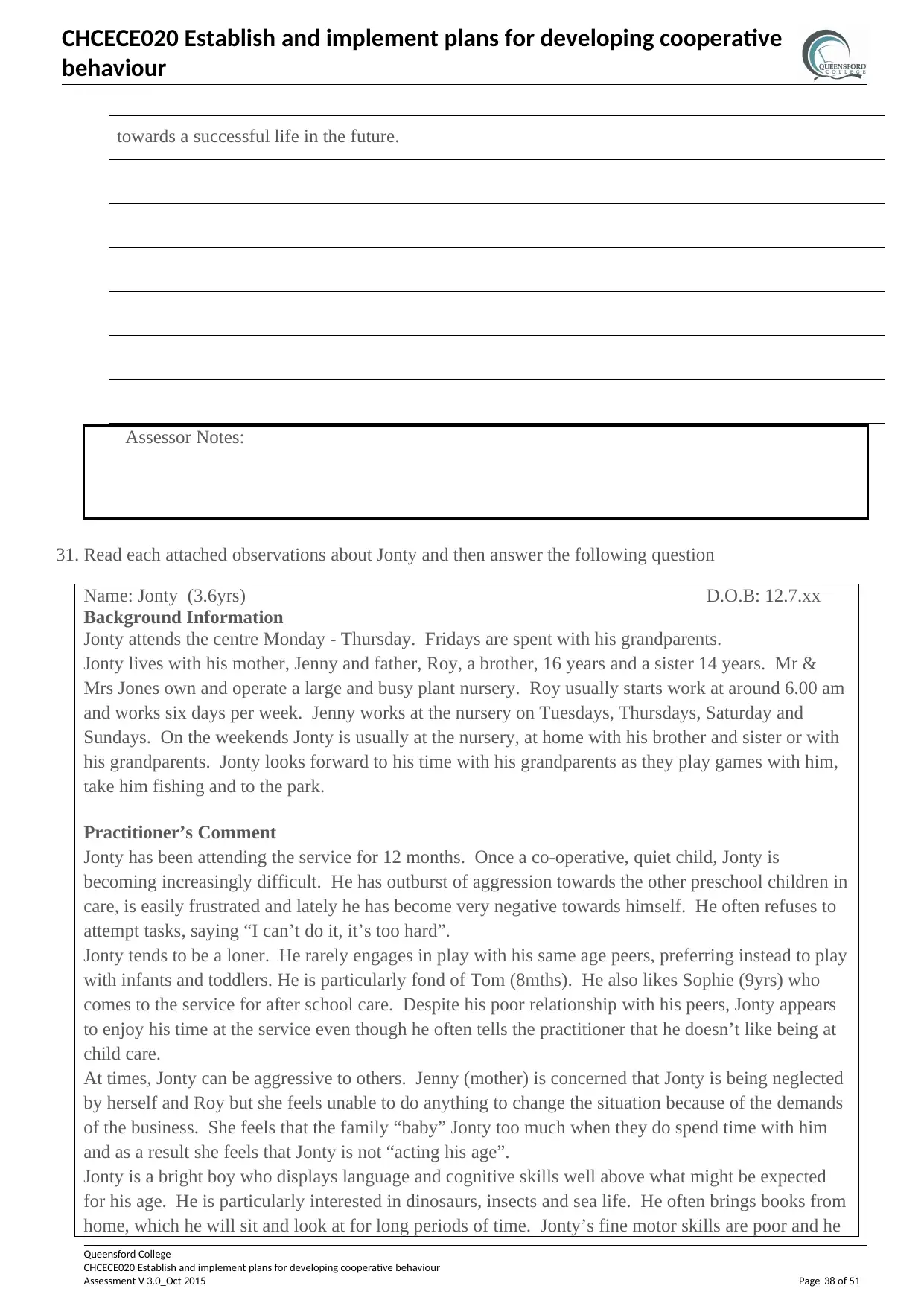
CHCECE020 Establish and implement plans for developing cooperative
behaviour
towards a successful life in the future.
Assessor Notes:
31. Read each attached observations about Jonty and then answer the following question
Name: Jonty (3.6yrs) D.O.B: 12.7.xx
Background Information
Jonty attends the centre Monday - Thursday. Fridays are spent with his grandparents.
Jonty lives with his mother, Jenny and father, Roy, a brother, 16 years and a sister 14 years. Mr &
Mrs Jones own and operate a large and busy plant nursery. Roy usually starts work at around 6.00 am
and works six days per week. Jenny works at the nursery on Tuesdays, Thursdays, Saturday and
Sundays. On the weekends Jonty is usually at the nursery, at home with his brother and sister or with
his grandparents. Jonty looks forward to his time with his grandparents as they play games with him,
take him fishing and to the park.
Practitioner’s Comment
Jonty has been attending the service for 12 months. Once a co-operative, quiet child, Jonty is
becoming increasingly difficult. He has outburst of aggression towards the other preschool children in
care, is easily frustrated and lately he has become very negative towards himself. He often refuses to
attempt tasks, saying “I can’t do it, it’s too hard”.
Jonty tends to be a loner. He rarely engages in play with his same age peers, preferring instead to play
with infants and toddlers. He is particularly fond of Tom (8mths). He also likes Sophie (9yrs) who
comes to the service for after school care. Despite his poor relationship with his peers, Jonty appears
to enjoy his time at the service even though he often tells the practitioner that he doesn’t like being at
child care.
At times, Jonty can be aggressive to others. Jenny (mother) is concerned that Jonty is being neglected
by herself and Roy but she feels unable to do anything to change the situation because of the demands
of the business. She feels that the family “baby” Jonty too much when they do spend time with him
and as a result she feels that Jonty is not “acting his age”.
Jonty is a bright boy who displays language and cognitive skills well above what might be expected
for his age. He is particularly interested in dinosaurs, insects and sea life. He often brings books from
home, which he will sit and look at for long periods of time. Jonty’s fine motor skills are poor and he
Queensford College
CHCECE020 Establish and implement plans for developing cooperative behaviour
Assessment V 3.0_Oct 2015 Page 38 of 51
behaviour
towards a successful life in the future.
Assessor Notes:
31. Read each attached observations about Jonty and then answer the following question
Name: Jonty (3.6yrs) D.O.B: 12.7.xx
Background Information
Jonty attends the centre Monday - Thursday. Fridays are spent with his grandparents.
Jonty lives with his mother, Jenny and father, Roy, a brother, 16 years and a sister 14 years. Mr &
Mrs Jones own and operate a large and busy plant nursery. Roy usually starts work at around 6.00 am
and works six days per week. Jenny works at the nursery on Tuesdays, Thursdays, Saturday and
Sundays. On the weekends Jonty is usually at the nursery, at home with his brother and sister or with
his grandparents. Jonty looks forward to his time with his grandparents as they play games with him,
take him fishing and to the park.
Practitioner’s Comment
Jonty has been attending the service for 12 months. Once a co-operative, quiet child, Jonty is
becoming increasingly difficult. He has outburst of aggression towards the other preschool children in
care, is easily frustrated and lately he has become very negative towards himself. He often refuses to
attempt tasks, saying “I can’t do it, it’s too hard”.
Jonty tends to be a loner. He rarely engages in play with his same age peers, preferring instead to play
with infants and toddlers. He is particularly fond of Tom (8mths). He also likes Sophie (9yrs) who
comes to the service for after school care. Despite his poor relationship with his peers, Jonty appears
to enjoy his time at the service even though he often tells the practitioner that he doesn’t like being at
child care.
At times, Jonty can be aggressive to others. Jenny (mother) is concerned that Jonty is being neglected
by herself and Roy but she feels unable to do anything to change the situation because of the demands
of the business. She feels that the family “baby” Jonty too much when they do spend time with him
and as a result she feels that Jonty is not “acting his age”.
Jonty is a bright boy who displays language and cognitive skills well above what might be expected
for his age. He is particularly interested in dinosaurs, insects and sea life. He often brings books from
home, which he will sit and look at for long periods of time. Jonty’s fine motor skills are poor and he
Queensford College
CHCECE020 Establish and implement plans for developing cooperative behaviour
Assessment V 3.0_Oct 2015 Page 38 of 51
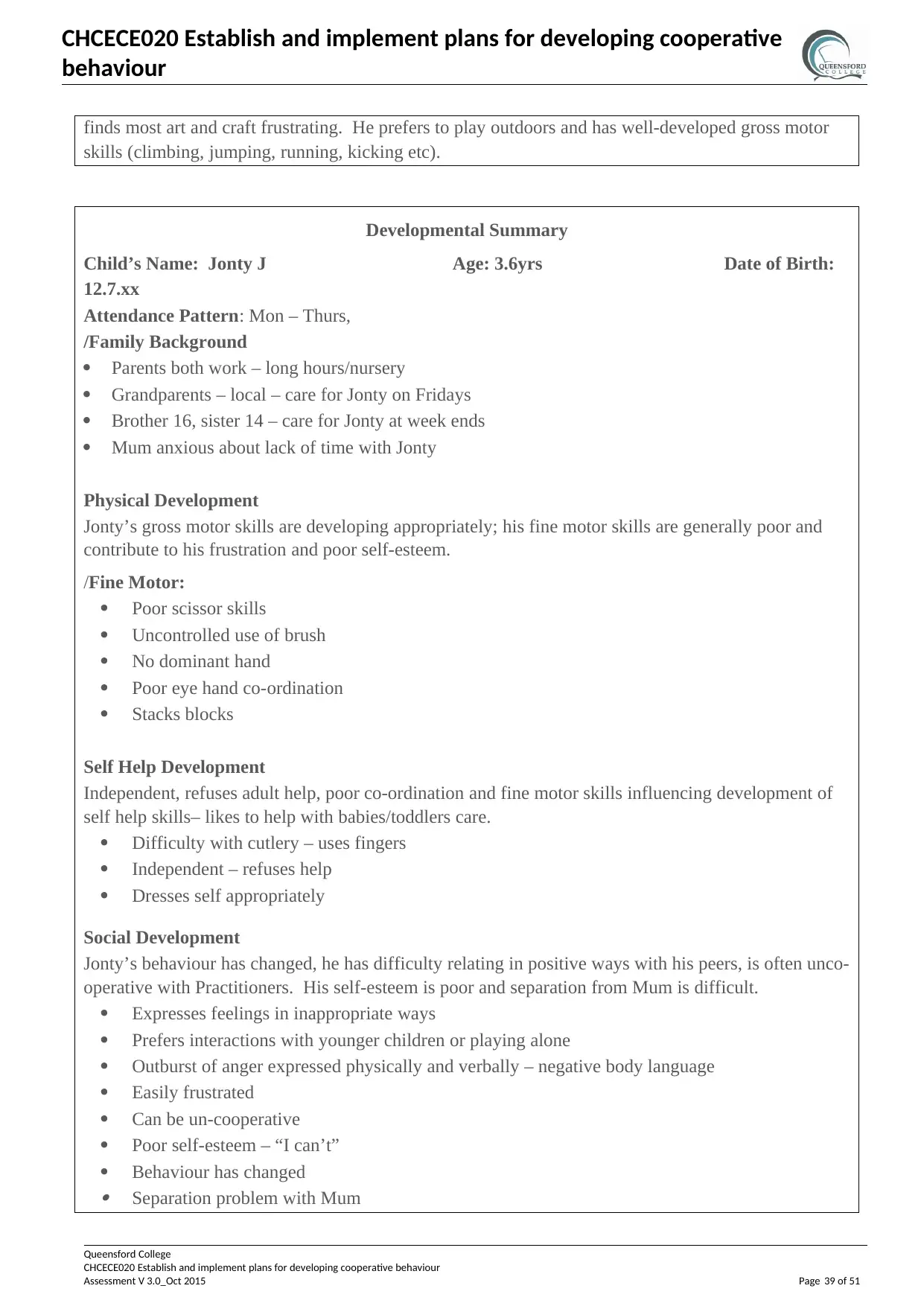
CHCECE020 Establish and implement plans for developing cooperative
behaviour
finds most art and craft frustrating. He prefers to play outdoors and has well-developed gross motor
skills (climbing, jumping, running, kicking etc).
Developmental Summary
Child’s Name: Jonty J Age: 3.6yrs Date of Birth:
12.7.xx
Attendance Pattern: Mon – Thurs,
/Family Background
Parents both work – long hours/nursery
Grandparents – local – care for Jonty on Fridays
Brother 16, sister 14 – care for Jonty at week ends
Mum anxious about lack of time with Jonty
Physical Development
Jonty’s gross motor skills are developing appropriately; his fine motor skills are generally poor and
contribute to his frustration and poor self-esteem.
/Fine Motor:
Poor scissor skills
Uncontrolled use of brush
No dominant hand
Poor eye hand co-ordination
Stacks blocks
Self Help Development
Independent, refuses adult help, poor co-ordination and fine motor skills influencing development of
self help skills– likes to help with babies/toddlers care.
Difficulty with cutlery – uses fingers
Independent – refuses help
Dresses self appropriately
Social Development
Jonty’s behaviour has changed, he has difficulty relating in positive ways with his peers, is often unco-
operative with Practitioners. His self-esteem is poor and separation from Mum is difficult.
Expresses feelings in inappropriate ways
Prefers interactions with younger children or playing alone
Outburst of anger expressed physically and verbally – negative body language
Easily frustrated
Can be un-cooperative
Poor self-esteem – “I can’t”
Behaviour has changed Separation problem with Mum
Queensford College
CHCECE020 Establish and implement plans for developing cooperative behaviour
Assessment V 3.0_Oct 2015 Page 39 of 51
behaviour
finds most art and craft frustrating. He prefers to play outdoors and has well-developed gross motor
skills (climbing, jumping, running, kicking etc).
Developmental Summary
Child’s Name: Jonty J Age: 3.6yrs Date of Birth:
12.7.xx
Attendance Pattern: Mon – Thurs,
/Family Background
Parents both work – long hours/nursery
Grandparents – local – care for Jonty on Fridays
Brother 16, sister 14 – care for Jonty at week ends
Mum anxious about lack of time with Jonty
Physical Development
Jonty’s gross motor skills are developing appropriately; his fine motor skills are generally poor and
contribute to his frustration and poor self-esteem.
/Fine Motor:
Poor scissor skills
Uncontrolled use of brush
No dominant hand
Poor eye hand co-ordination
Stacks blocks
Self Help Development
Independent, refuses adult help, poor co-ordination and fine motor skills influencing development of
self help skills– likes to help with babies/toddlers care.
Difficulty with cutlery – uses fingers
Independent – refuses help
Dresses self appropriately
Social Development
Jonty’s behaviour has changed, he has difficulty relating in positive ways with his peers, is often unco-
operative with Practitioners. His self-esteem is poor and separation from Mum is difficult.
Expresses feelings in inappropriate ways
Prefers interactions with younger children or playing alone
Outburst of anger expressed physically and verbally – negative body language
Easily frustrated
Can be un-cooperative
Poor self-esteem – “I can’t”
Behaviour has changed Separation problem with Mum
Queensford College
CHCECE020 Establish and implement plans for developing cooperative behaviour
Assessment V 3.0_Oct 2015 Page 39 of 51
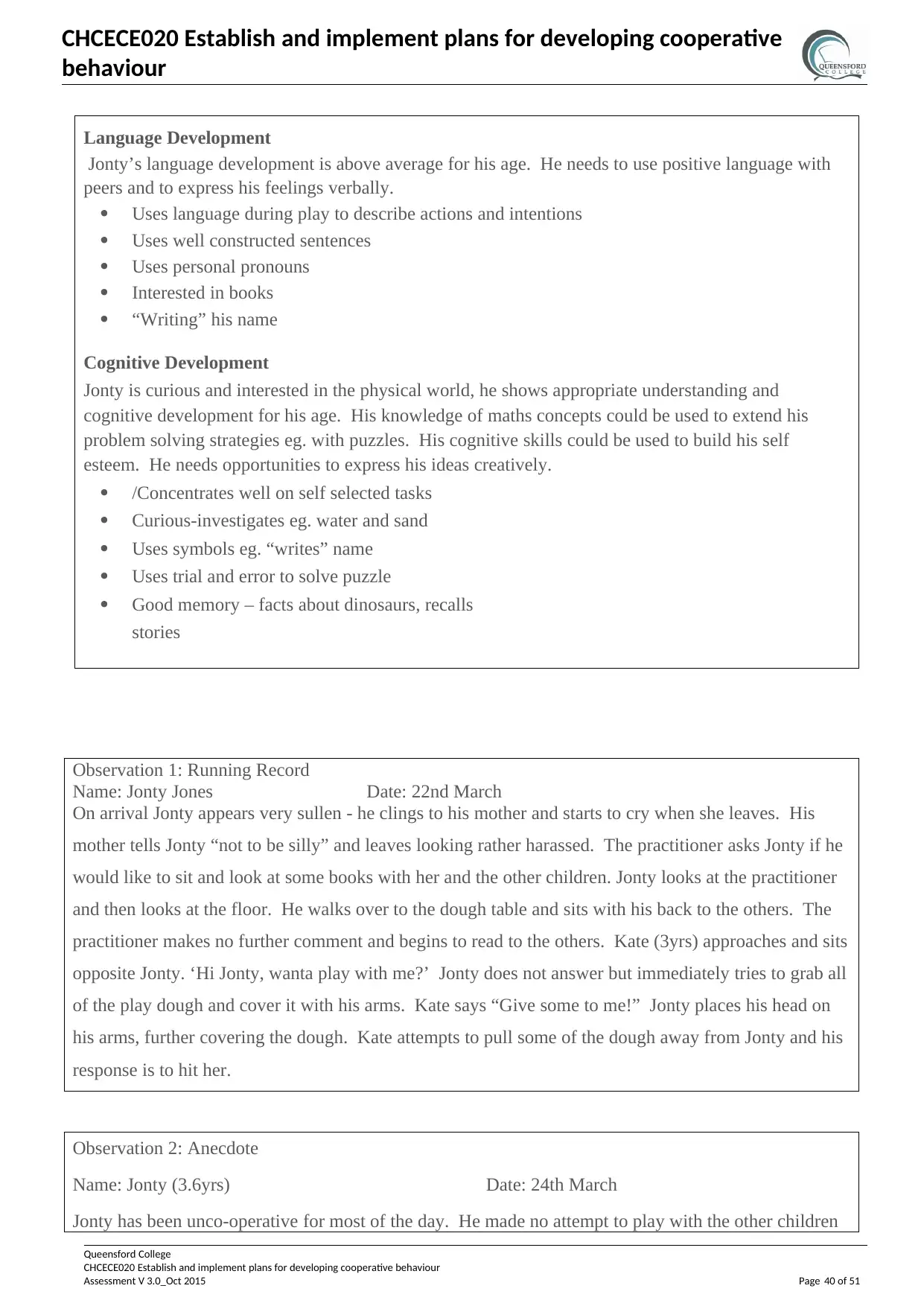
CHCECE020 Establish and implement plans for developing cooperative
behaviour
Language Development
Jonty’s language development is above average for his age. He needs to use positive language with
peers and to express his feelings verbally.
Uses language during play to describe actions and intentions
Uses well constructed sentences
Uses personal pronouns
Interested in books
“Writing” his name
Cognitive Development
Jonty is curious and interested in the physical world, he shows appropriate understanding and
cognitive development for his age. His knowledge of maths concepts could be used to extend his
problem solving strategies eg. with puzzles. His cognitive skills could be used to build his self
esteem. He needs opportunities to express his ideas creatively.
/Concentrates well on self selected tasks
Curious-investigates eg. water and sand
Uses symbols eg. “writes” name
Uses trial and error to solve puzzle
Good memory – facts about dinosaurs, recalls
stories
Observation 1: Running Record
Name: Jonty Jones Date: 22nd March
On arrival Jonty appears very sullen - he clings to his mother and starts to cry when she leaves. His
mother tells Jonty “not to be silly” and leaves looking rather harassed. The practitioner asks Jonty if he
would like to sit and look at some books with her and the other children. Jonty looks at the practitioner
and then looks at the floor. He walks over to the dough table and sits with his back to the others. The
practitioner makes no further comment and begins to read to the others. Kate (3yrs) approaches and sits
opposite Jonty. ‘Hi Jonty, wanta play with me?’ Jonty does not answer but immediately tries to grab all
of the play dough and cover it with his arms. Kate says “Give some to me!” Jonty places his head on
his arms, further covering the dough. Kate attempts to pull some of the dough away from Jonty and his
response is to hit her.
Observation 2: Anecdote
Name: Jonty (3.6yrs) Date: 24th March
Jonty has been unco-operative for most of the day. He made no attempt to play with the other children
Queensford College
CHCECE020 Establish and implement plans for developing cooperative behaviour
Assessment V 3.0_Oct 2015 Page 40 of 51
behaviour
Language Development
Jonty’s language development is above average for his age. He needs to use positive language with
peers and to express his feelings verbally.
Uses language during play to describe actions and intentions
Uses well constructed sentences
Uses personal pronouns
Interested in books
“Writing” his name
Cognitive Development
Jonty is curious and interested in the physical world, he shows appropriate understanding and
cognitive development for his age. His knowledge of maths concepts could be used to extend his
problem solving strategies eg. with puzzles. His cognitive skills could be used to build his self
esteem. He needs opportunities to express his ideas creatively.
/Concentrates well on self selected tasks
Curious-investigates eg. water and sand
Uses symbols eg. “writes” name
Uses trial and error to solve puzzle
Good memory – facts about dinosaurs, recalls
stories
Observation 1: Running Record
Name: Jonty Jones Date: 22nd March
On arrival Jonty appears very sullen - he clings to his mother and starts to cry when she leaves. His
mother tells Jonty “not to be silly” and leaves looking rather harassed. The practitioner asks Jonty if he
would like to sit and look at some books with her and the other children. Jonty looks at the practitioner
and then looks at the floor. He walks over to the dough table and sits with his back to the others. The
practitioner makes no further comment and begins to read to the others. Kate (3yrs) approaches and sits
opposite Jonty. ‘Hi Jonty, wanta play with me?’ Jonty does not answer but immediately tries to grab all
of the play dough and cover it with his arms. Kate says “Give some to me!” Jonty places his head on
his arms, further covering the dough. Kate attempts to pull some of the dough away from Jonty and his
response is to hit her.
Observation 2: Anecdote
Name: Jonty (3.6yrs) Date: 24th March
Jonty has been unco-operative for most of the day. He made no attempt to play with the other children
Queensford College
CHCECE020 Establish and implement plans for developing cooperative behaviour
Assessment V 3.0_Oct 2015 Page 40 of 51
Secure Best Marks with AI Grader
Need help grading? Try our AI Grader for instant feedback on your assignments.
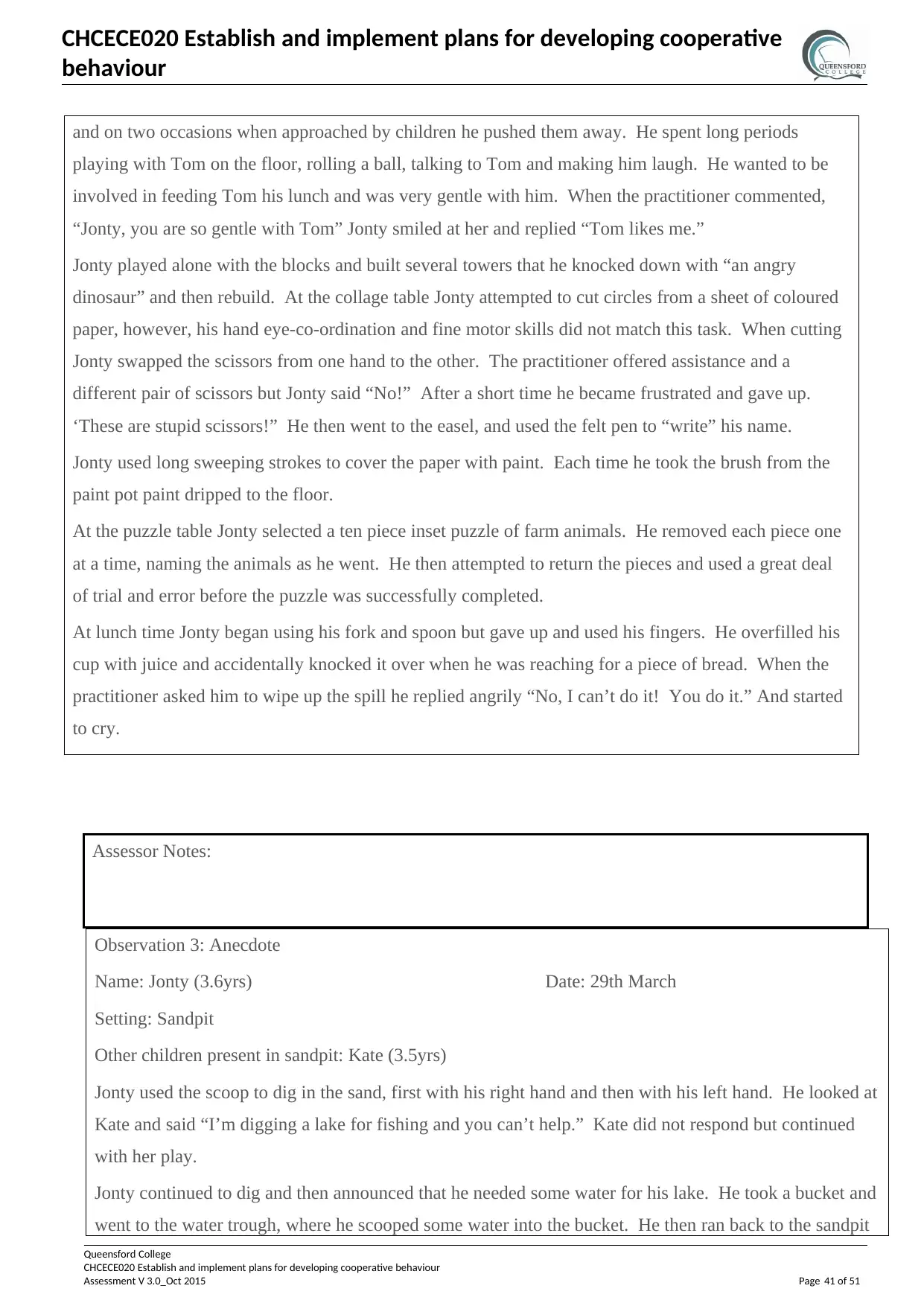
CHCECE020 Establish and implement plans for developing cooperative
behaviour
and on two occasions when approached by children he pushed them away. He spent long periods
playing with Tom on the floor, rolling a ball, talking to Tom and making him laugh. He wanted to be
involved in feeding Tom his lunch and was very gentle with him. When the practitioner commented,
“Jonty, you are so gentle with Tom” Jonty smiled at her and replied “Tom likes me.”
Jonty played alone with the blocks and built several towers that he knocked down with “an angry
dinosaur” and then rebuild. At the collage table Jonty attempted to cut circles from a sheet of coloured
paper, however, his hand eye-co-ordination and fine motor skills did not match this task. When cutting
Jonty swapped the scissors from one hand to the other. The practitioner offered assistance and a
different pair of scissors but Jonty said “No!” After a short time he became frustrated and gave up.
‘These are stupid scissors!” He then went to the easel, and used the felt pen to “write” his name.
Jonty used long sweeping strokes to cover the paper with paint. Each time he took the brush from the
paint pot paint dripped to the floor.
At the puzzle table Jonty selected a ten piece inset puzzle of farm animals. He removed each piece one
at a time, naming the animals as he went. He then attempted to return the pieces and used a great deal
of trial and error before the puzzle was successfully completed.
At lunch time Jonty began using his fork and spoon but gave up and used his fingers. He overfilled his
cup with juice and accidentally knocked it over when he was reaching for a piece of bread. When the
practitioner asked him to wipe up the spill he replied angrily “No, I can’t do it! You do it.” And started
to cry.
Assessor Notes:
Observation 3: Anecdote
Name: Jonty (3.6yrs) Date: 29th March
Setting: Sandpit
Other children present in sandpit: Kate (3.5yrs)
Jonty used the scoop to dig in the sand, first with his right hand and then with his left hand. He looked at
Kate and said “I’m digging a lake for fishing and you can’t help.” Kate did not respond but continued
with her play.
Jonty continued to dig and then announced that he needed some water for his lake. He took a bucket and
went to the water trough, where he scooped some water into the bucket. He then ran back to the sandpit
Queensford College
CHCECE020 Establish and implement plans for developing cooperative behaviour
Assessment V 3.0_Oct 2015 Page 41 of 51
behaviour
and on two occasions when approached by children he pushed them away. He spent long periods
playing with Tom on the floor, rolling a ball, talking to Tom and making him laugh. He wanted to be
involved in feeding Tom his lunch and was very gentle with him. When the practitioner commented,
“Jonty, you are so gentle with Tom” Jonty smiled at her and replied “Tom likes me.”
Jonty played alone with the blocks and built several towers that he knocked down with “an angry
dinosaur” and then rebuild. At the collage table Jonty attempted to cut circles from a sheet of coloured
paper, however, his hand eye-co-ordination and fine motor skills did not match this task. When cutting
Jonty swapped the scissors from one hand to the other. The practitioner offered assistance and a
different pair of scissors but Jonty said “No!” After a short time he became frustrated and gave up.
‘These are stupid scissors!” He then went to the easel, and used the felt pen to “write” his name.
Jonty used long sweeping strokes to cover the paper with paint. Each time he took the brush from the
paint pot paint dripped to the floor.
At the puzzle table Jonty selected a ten piece inset puzzle of farm animals. He removed each piece one
at a time, naming the animals as he went. He then attempted to return the pieces and used a great deal
of trial and error before the puzzle was successfully completed.
At lunch time Jonty began using his fork and spoon but gave up and used his fingers. He overfilled his
cup with juice and accidentally knocked it over when he was reaching for a piece of bread. When the
practitioner asked him to wipe up the spill he replied angrily “No, I can’t do it! You do it.” And started
to cry.
Assessor Notes:
Observation 3: Anecdote
Name: Jonty (3.6yrs) Date: 29th March
Setting: Sandpit
Other children present in sandpit: Kate (3.5yrs)
Jonty used the scoop to dig in the sand, first with his right hand and then with his left hand. He looked at
Kate and said “I’m digging a lake for fishing and you can’t help.” Kate did not respond but continued
with her play.
Jonty continued to dig and then announced that he needed some water for his lake. He took a bucket and
went to the water trough, where he scooped some water into the bucket. He then ran back to the sandpit
Queensford College
CHCECE020 Establish and implement plans for developing cooperative behaviour
Assessment V 3.0_Oct 2015 Page 41 of 51
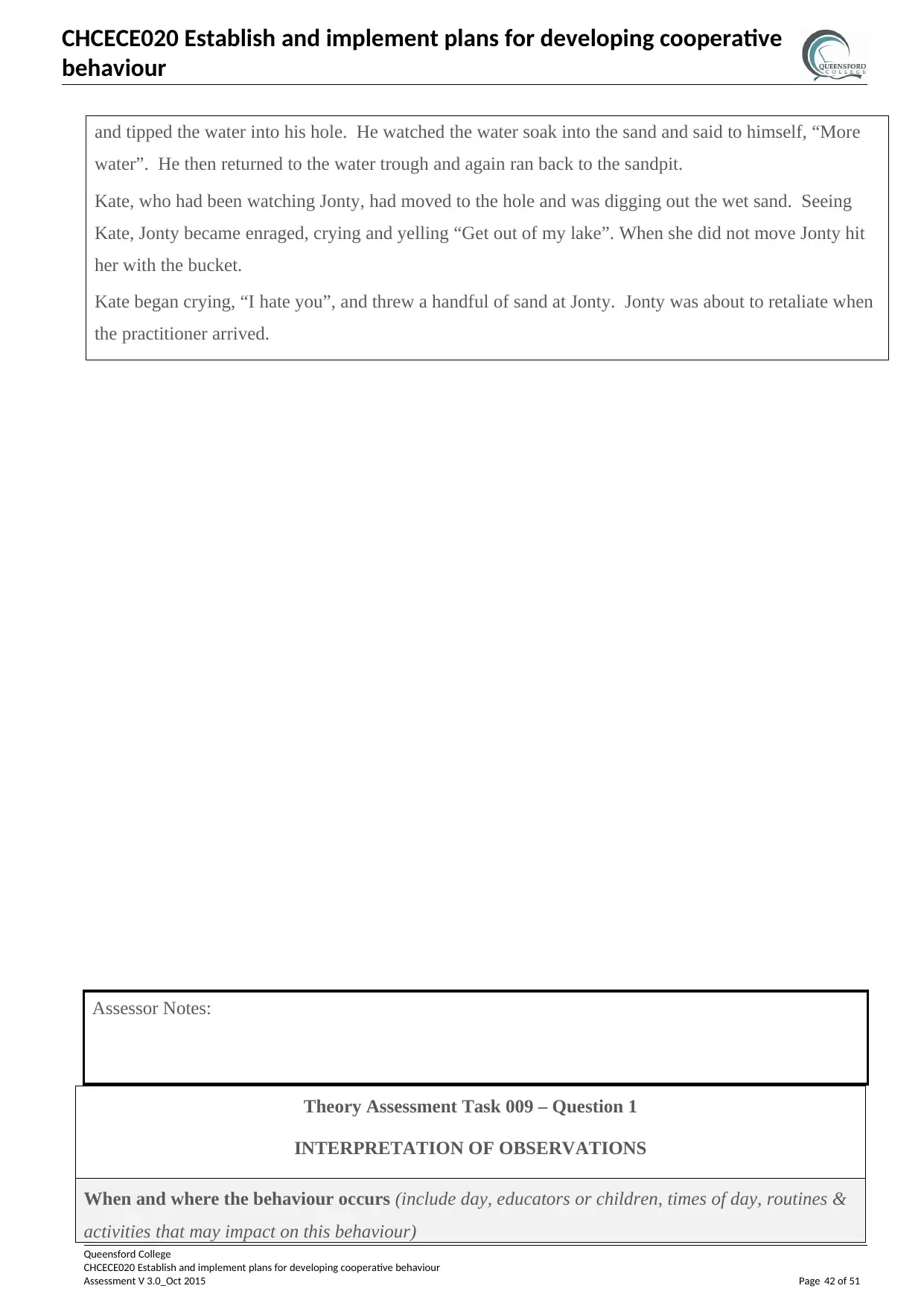
CHCECE020 Establish and implement plans for developing cooperative
behaviour
and tipped the water into his hole. He watched the water soak into the sand and said to himself, “More
water”. He then returned to the water trough and again ran back to the sandpit.
Kate, who had been watching Jonty, had moved to the hole and was digging out the wet sand. Seeing
Kate, Jonty became enraged, crying and yelling “Get out of my lake”. When she did not move Jonty hit
her with the bucket.
Kate began crying, “I hate you”, and threw a handful of sand at Jonty. Jonty was about to retaliate when
the practitioner arrived.
Assessor Notes:
Theory Assessment Task 009 – Question 1
INTERPRETATION OF OBSERVATIONS
When and where the behaviour occurs (include day, educators or children, times of day, routines &
activities that may impact on this behaviour)
Queensford College
CHCECE020 Establish and implement plans for developing cooperative behaviour
Assessment V 3.0_Oct 2015 Page 42 of 51
behaviour
and tipped the water into his hole. He watched the water soak into the sand and said to himself, “More
water”. He then returned to the water trough and again ran back to the sandpit.
Kate, who had been watching Jonty, had moved to the hole and was digging out the wet sand. Seeing
Kate, Jonty became enraged, crying and yelling “Get out of my lake”. When she did not move Jonty hit
her with the bucket.
Kate began crying, “I hate you”, and threw a handful of sand at Jonty. Jonty was about to retaliate when
the practitioner arrived.
Assessor Notes:
Theory Assessment Task 009 – Question 1
INTERPRETATION OF OBSERVATIONS
When and where the behaviour occurs (include day, educators or children, times of day, routines &
activities that may impact on this behaviour)
Queensford College
CHCECE020 Establish and implement plans for developing cooperative behaviour
Assessment V 3.0_Oct 2015 Page 42 of 51
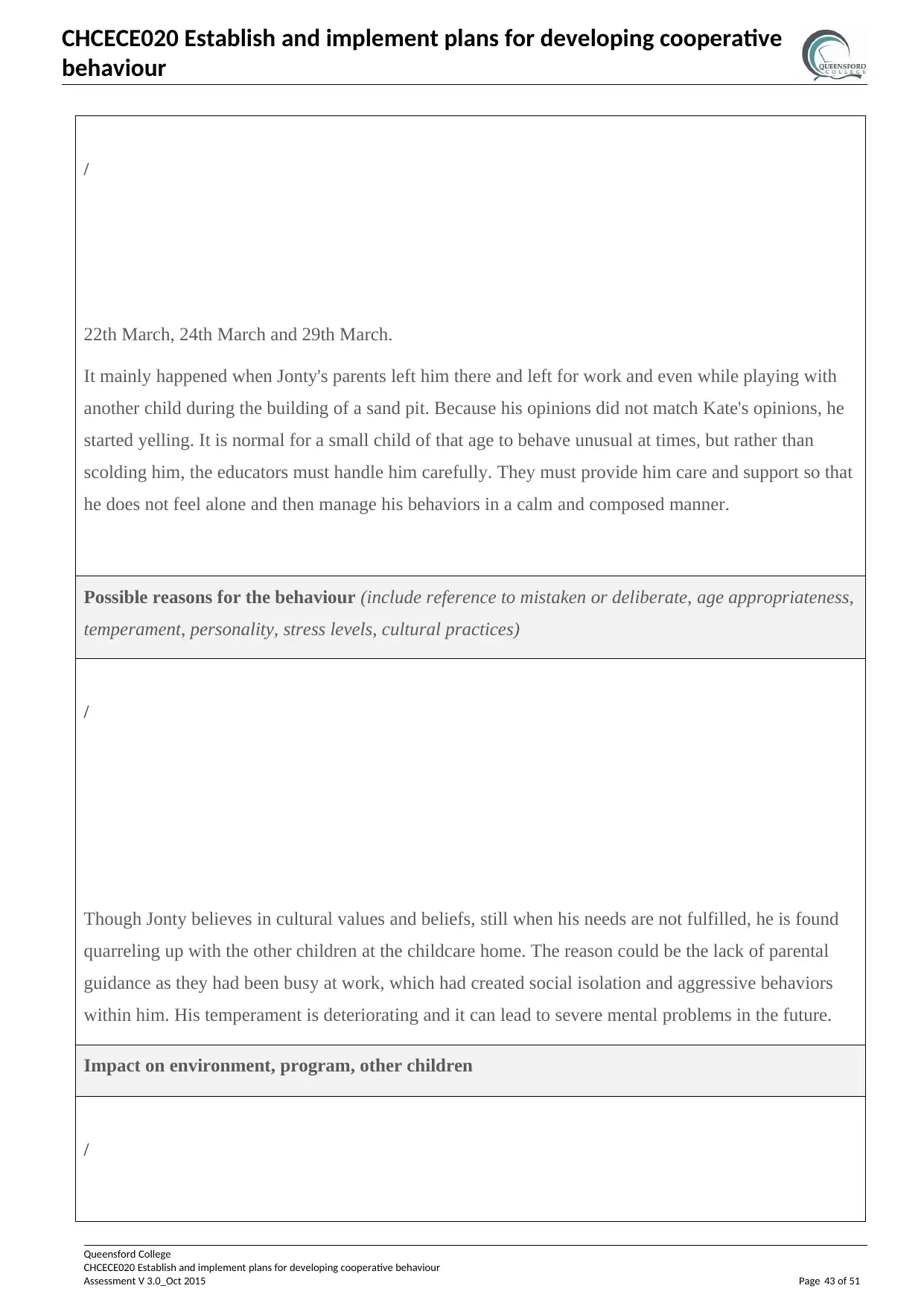
CHCECE020 Establish and implement plans for developing cooperative
behaviour
/
22th March, 24th March and 29th March.
It mainly happened when Jonty's parents left him there and left for work and even while playing with
another child during the building of a sand pit. Because his opinions did not match Kate's opinions, he
started yelling. It is normal for a small child of that age to behave unusual at times, but rather than
scolding him, the educators must handle him carefully. They must provide him care and support so that
he does not feel alone and then manage his behaviors in a calm and composed manner.
Possible reasons for the behaviour (include reference to mistaken or deliberate, age appropriateness,
temperament, personality, stress levels, cultural practices)
/
Though Jonty believes in cultural values and beliefs, still when his needs are not fulfilled, he is found
quarreling up with the other children at the childcare home. The reason could be the lack of parental
guidance as they had been busy at work, which had created social isolation and aggressive behaviors
within him. His temperament is deteriorating and it can lead to severe mental problems in the future.
Impact on environment, program, other children
/
Queensford College
CHCECE020 Establish and implement plans for developing cooperative behaviour
Assessment V 3.0_Oct 2015 Page 43 of 51
behaviour
/
22th March, 24th March and 29th March.
It mainly happened when Jonty's parents left him there and left for work and even while playing with
another child during the building of a sand pit. Because his opinions did not match Kate's opinions, he
started yelling. It is normal for a small child of that age to behave unusual at times, but rather than
scolding him, the educators must handle him carefully. They must provide him care and support so that
he does not feel alone and then manage his behaviors in a calm and composed manner.
Possible reasons for the behaviour (include reference to mistaken or deliberate, age appropriateness,
temperament, personality, stress levels, cultural practices)
/
Though Jonty believes in cultural values and beliefs, still when his needs are not fulfilled, he is found
quarreling up with the other children at the childcare home. The reason could be the lack of parental
guidance as they had been busy at work, which had created social isolation and aggressive behaviors
within him. His temperament is deteriorating and it can lead to severe mental problems in the future.
Impact on environment, program, other children
/
Queensford College
CHCECE020 Establish and implement plans for developing cooperative behaviour
Assessment V 3.0_Oct 2015 Page 43 of 51
Paraphrase This Document
Need a fresh take? Get an instant paraphrase of this document with our AI Paraphraser
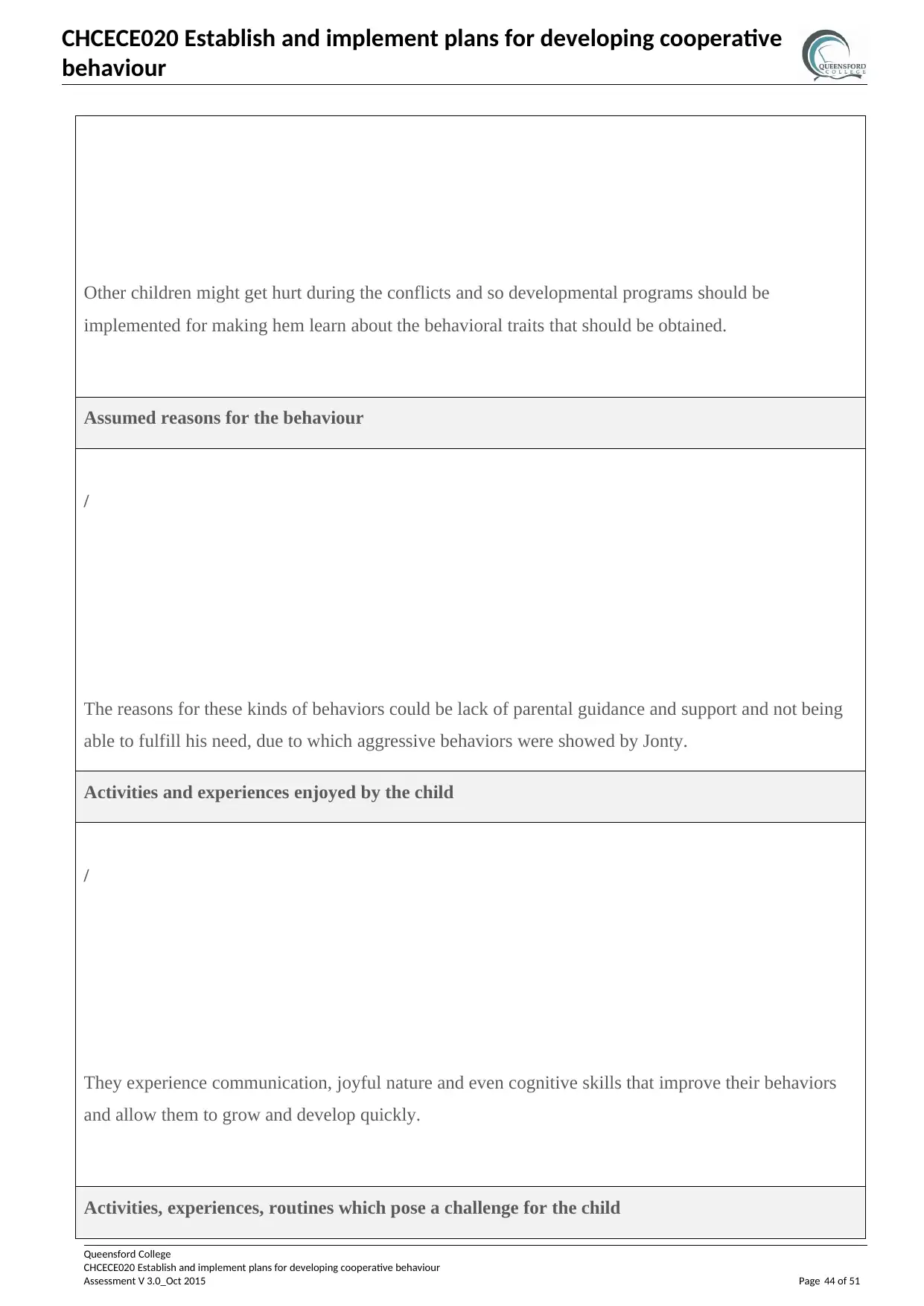
CHCECE020 Establish and implement plans for developing cooperative
behaviour
Other children might get hurt during the conflicts and so developmental programs should be
implemented for making hem learn about the behavioral traits that should be obtained.
Assumed reasons for the behaviour
/
The reasons for these kinds of behaviors could be lack of parental guidance and support and not being
able to fulfill his need, due to which aggressive behaviors were showed by Jonty.
Activities and experiences enjoyed by the child
/
They experience communication, joyful nature and even cognitive skills that improve their behaviors
and allow them to grow and develop quickly.
Activities, experiences, routines which pose a challenge for the child
Queensford College
CHCECE020 Establish and implement plans for developing cooperative behaviour
Assessment V 3.0_Oct 2015 Page 44 of 51
behaviour
Other children might get hurt during the conflicts and so developmental programs should be
implemented for making hem learn about the behavioral traits that should be obtained.
Assumed reasons for the behaviour
/
The reasons for these kinds of behaviors could be lack of parental guidance and support and not being
able to fulfill his need, due to which aggressive behaviors were showed by Jonty.
Activities and experiences enjoyed by the child
/
They experience communication, joyful nature and even cognitive skills that improve their behaviors
and allow them to grow and develop quickly.
Activities, experiences, routines which pose a challenge for the child
Queensford College
CHCECE020 Establish and implement plans for developing cooperative behaviour
Assessment V 3.0_Oct 2015 Page 44 of 51
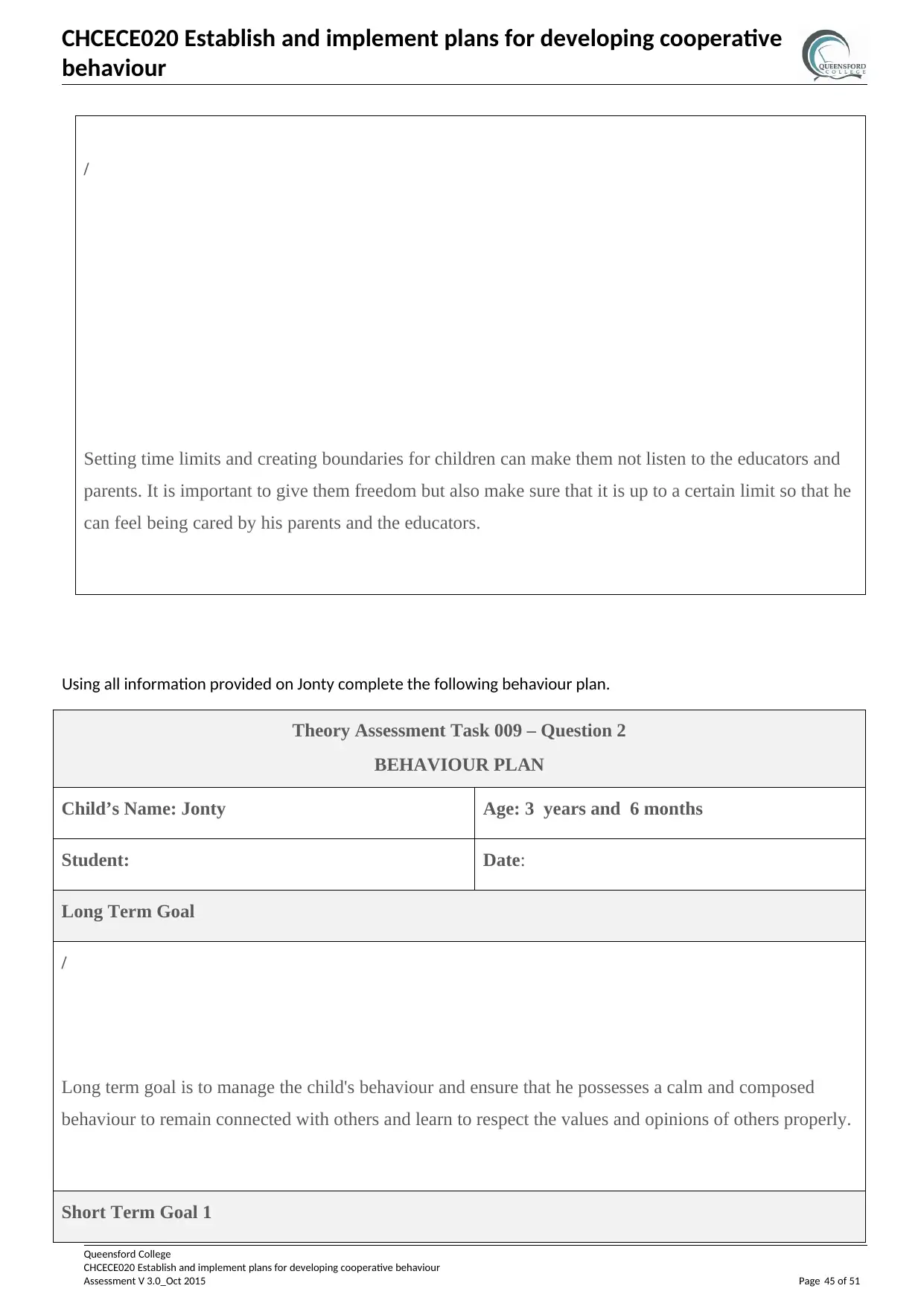
CHCECE020 Establish and implement plans for developing cooperative
behaviour
/
Setting time limits and creating boundaries for children can make them not listen to the educators and
parents. It is important to give them freedom but also make sure that it is up to a certain limit so that he
can feel being cared by his parents and the educators.
Using all information provided on Jonty complete the following behaviour plan.
Theory Assessment Task 009 – Question 2
BEHAVIOUR PLAN
Child’s Name: Jonty Age: 3 years and 6 months
Student: Date:
Long Term Goal
/
Long term goal is to manage the child's behaviour and ensure that he possesses a calm and composed
behaviour to remain connected with others and learn to respect the values and opinions of others properly.
Short Term Goal 1
Queensford College
CHCECE020 Establish and implement plans for developing cooperative behaviour
Assessment V 3.0_Oct 2015 Page 45 of 51
behaviour
/
Setting time limits and creating boundaries for children can make them not listen to the educators and
parents. It is important to give them freedom but also make sure that it is up to a certain limit so that he
can feel being cared by his parents and the educators.
Using all information provided on Jonty complete the following behaviour plan.
Theory Assessment Task 009 – Question 2
BEHAVIOUR PLAN
Child’s Name: Jonty Age: 3 years and 6 months
Student: Date:
Long Term Goal
/
Long term goal is to manage the child's behaviour and ensure that he possesses a calm and composed
behaviour to remain connected with others and learn to respect the values and opinions of others properly.
Short Term Goal 1
Queensford College
CHCECE020 Establish and implement plans for developing cooperative behaviour
Assessment V 3.0_Oct 2015 Page 45 of 51
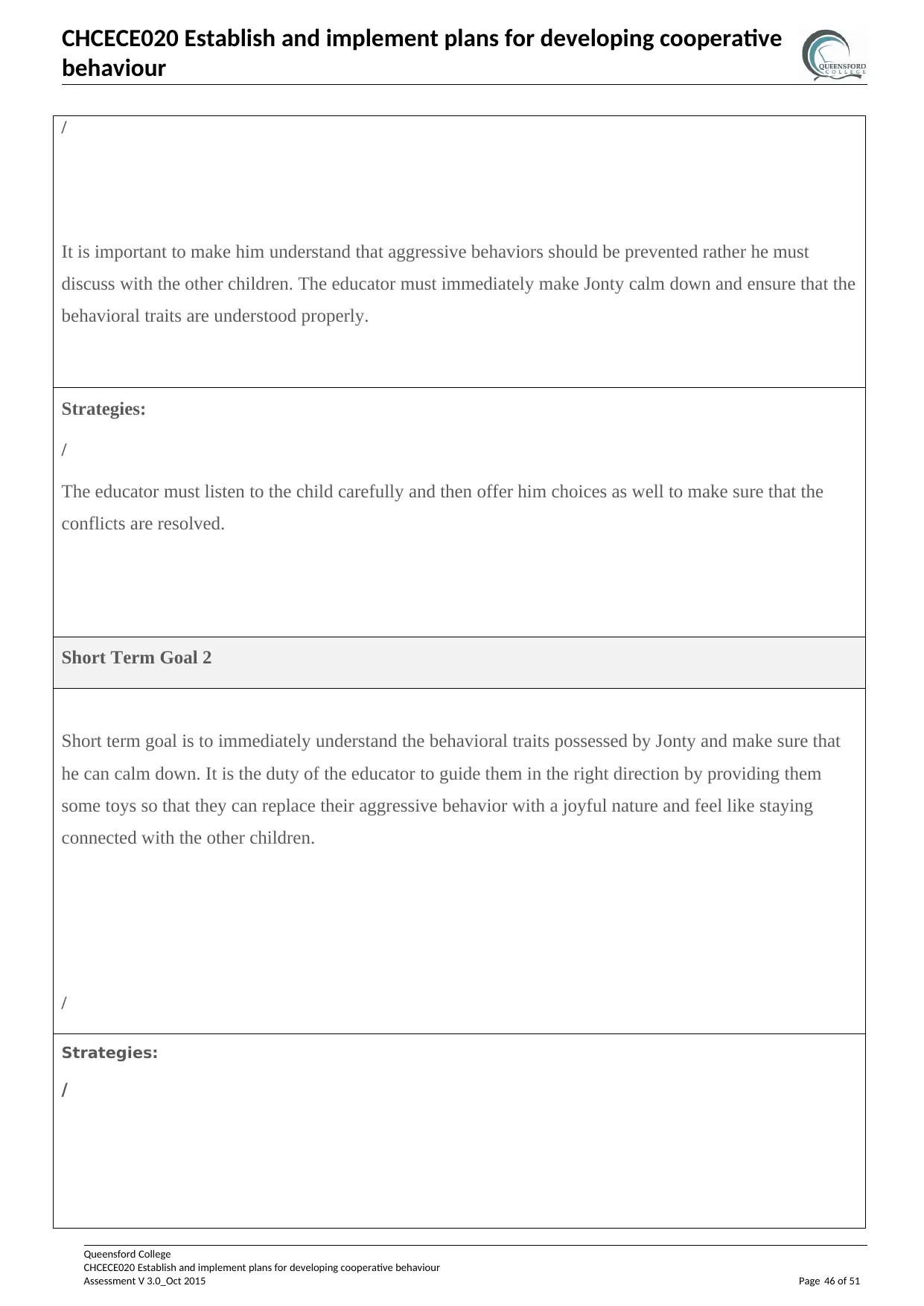
CHCECE020 Establish and implement plans for developing cooperative
behaviour
/
It is important to make him understand that aggressive behaviors should be prevented rather he must
discuss with the other children. The educator must immediately make Jonty calm down and ensure that the
behavioral traits are understood properly.
Strategies:
/
The educator must listen to the child carefully and then offer him choices as well to make sure that the
conflicts are resolved.
Short Term Goal 2
Short term goal is to immediately understand the behavioral traits possessed by Jonty and make sure that
he can calm down. It is the duty of the educator to guide them in the right direction by providing them
some toys so that they can replace their aggressive behavior with a joyful nature and feel like staying
connected with the other children.
/
Strategies:
/
Queensford College
CHCECE020 Establish and implement plans for developing cooperative behaviour
Assessment V 3.0_Oct 2015 Page 46 of 51
behaviour
/
It is important to make him understand that aggressive behaviors should be prevented rather he must
discuss with the other children. The educator must immediately make Jonty calm down and ensure that the
behavioral traits are understood properly.
Strategies:
/
The educator must listen to the child carefully and then offer him choices as well to make sure that the
conflicts are resolved.
Short Term Goal 2
Short term goal is to immediately understand the behavioral traits possessed by Jonty and make sure that
he can calm down. It is the duty of the educator to guide them in the right direction by providing them
some toys so that they can replace their aggressive behavior with a joyful nature and feel like staying
connected with the other children.
/
Strategies:
/
Queensford College
CHCECE020 Establish and implement plans for developing cooperative behaviour
Assessment V 3.0_Oct 2015 Page 46 of 51
Secure Best Marks with AI Grader
Need help grading? Try our AI Grader for instant feedback on your assignments.
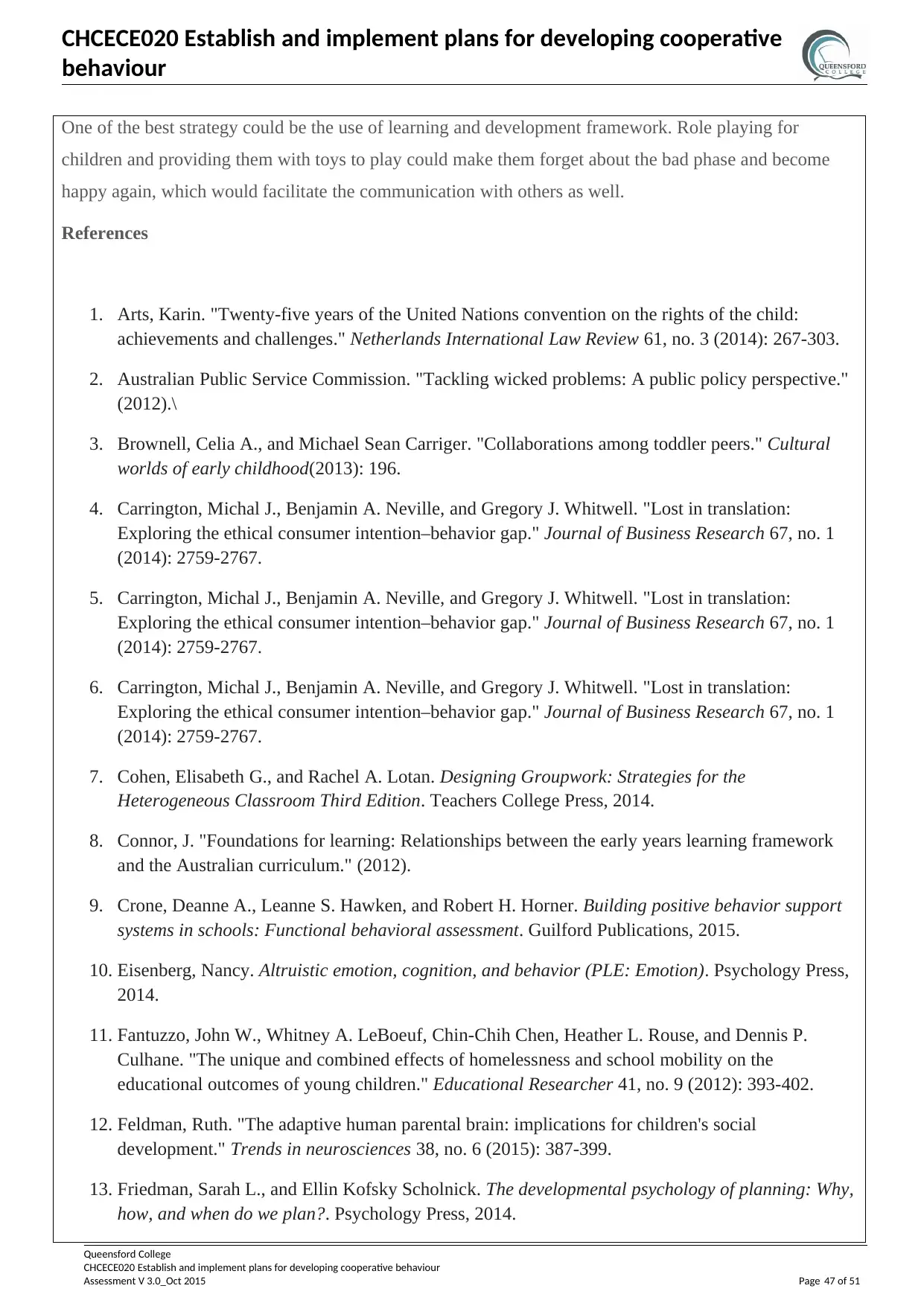
CHCECE020 Establish and implement plans for developing cooperative
behaviour
One of the best strategy could be the use of learning and development framework. Role playing for
children and providing them with toys to play could make them forget about the bad phase and become
happy again, which would facilitate the communication with others as well.
References
1. Arts, Karin. "Twenty-five years of the United Nations convention on the rights of the child:
achievements and challenges." Netherlands International Law Review 61, no. 3 (2014): 267-303.
2. Australian Public Service Commission. "Tackling wicked problems: A public policy perspective."
(2012).\
3. Brownell, Celia A., and Michael Sean Carriger. "Collaborations among toddler peers." Cultural
worlds of early childhood(2013): 196.
4. Carrington, Michal J., Benjamin A. Neville, and Gregory J. Whitwell. "Lost in translation:
Exploring the ethical consumer intention–behavior gap." Journal of Business Research 67, no. 1
(2014): 2759-2767.
5. Carrington, Michal J., Benjamin A. Neville, and Gregory J. Whitwell. "Lost in translation:
Exploring the ethical consumer intention–behavior gap." Journal of Business Research 67, no. 1
(2014): 2759-2767.
6. Carrington, Michal J., Benjamin A. Neville, and Gregory J. Whitwell. "Lost in translation:
Exploring the ethical consumer intention–behavior gap." Journal of Business Research 67, no. 1
(2014): 2759-2767.
7. Cohen, Elisabeth G., and Rachel A. Lotan. Designing Groupwork: Strategies for the
Heterogeneous Classroom Third Edition. Teachers College Press, 2014.
8. Connor, J. "Foundations for learning: Relationships between the early years learning framework
and the Australian curriculum." (2012).
9. Crone, Deanne A., Leanne S. Hawken, and Robert H. Horner. Building positive behavior support
systems in schools: Functional behavioral assessment. Guilford Publications, 2015.
10. Eisenberg, Nancy. Altruistic emotion, cognition, and behavior (PLE: Emotion). Psychology Press,
2014.
11. Fantuzzo, John W., Whitney A. LeBoeuf, Chin-Chih Chen, Heather L. Rouse, and Dennis P.
Culhane. "The unique and combined effects of homelessness and school mobility on the
educational outcomes of young children." Educational Researcher 41, no. 9 (2012): 393-402.
12. Feldman, Ruth. "The adaptive human parental brain: implications for children's social
development." Trends in neurosciences 38, no. 6 (2015): 387-399.
13. Friedman, Sarah L., and Ellin Kofsky Scholnick. The developmental psychology of planning: Why,
how, and when do we plan?. Psychology Press, 2014.
Queensford College
CHCECE020 Establish and implement plans for developing cooperative behaviour
Assessment V 3.0_Oct 2015 Page 47 of 51
behaviour
One of the best strategy could be the use of learning and development framework. Role playing for
children and providing them with toys to play could make them forget about the bad phase and become
happy again, which would facilitate the communication with others as well.
References
1. Arts, Karin. "Twenty-five years of the United Nations convention on the rights of the child:
achievements and challenges." Netherlands International Law Review 61, no. 3 (2014): 267-303.
2. Australian Public Service Commission. "Tackling wicked problems: A public policy perspective."
(2012).\
3. Brownell, Celia A., and Michael Sean Carriger. "Collaborations among toddler peers." Cultural
worlds of early childhood(2013): 196.
4. Carrington, Michal J., Benjamin A. Neville, and Gregory J. Whitwell. "Lost in translation:
Exploring the ethical consumer intention–behavior gap." Journal of Business Research 67, no. 1
(2014): 2759-2767.
5. Carrington, Michal J., Benjamin A. Neville, and Gregory J. Whitwell. "Lost in translation:
Exploring the ethical consumer intention–behavior gap." Journal of Business Research 67, no. 1
(2014): 2759-2767.
6. Carrington, Michal J., Benjamin A. Neville, and Gregory J. Whitwell. "Lost in translation:
Exploring the ethical consumer intention–behavior gap." Journal of Business Research 67, no. 1
(2014): 2759-2767.
7. Cohen, Elisabeth G., and Rachel A. Lotan. Designing Groupwork: Strategies for the
Heterogeneous Classroom Third Edition. Teachers College Press, 2014.
8. Connor, J. "Foundations for learning: Relationships between the early years learning framework
and the Australian curriculum." (2012).
9. Crone, Deanne A., Leanne S. Hawken, and Robert H. Horner. Building positive behavior support
systems in schools: Functional behavioral assessment. Guilford Publications, 2015.
10. Eisenberg, Nancy. Altruistic emotion, cognition, and behavior (PLE: Emotion). Psychology Press,
2014.
11. Fantuzzo, John W., Whitney A. LeBoeuf, Chin-Chih Chen, Heather L. Rouse, and Dennis P.
Culhane. "The unique and combined effects of homelessness and school mobility on the
educational outcomes of young children." Educational Researcher 41, no. 9 (2012): 393-402.
12. Feldman, Ruth. "The adaptive human parental brain: implications for children's social
development." Trends in neurosciences 38, no. 6 (2015): 387-399.
13. Friedman, Sarah L., and Ellin Kofsky Scholnick. The developmental psychology of planning: Why,
how, and when do we plan?. Psychology Press, 2014.
Queensford College
CHCECE020 Establish and implement plans for developing cooperative behaviour
Assessment V 3.0_Oct 2015 Page 47 of 51
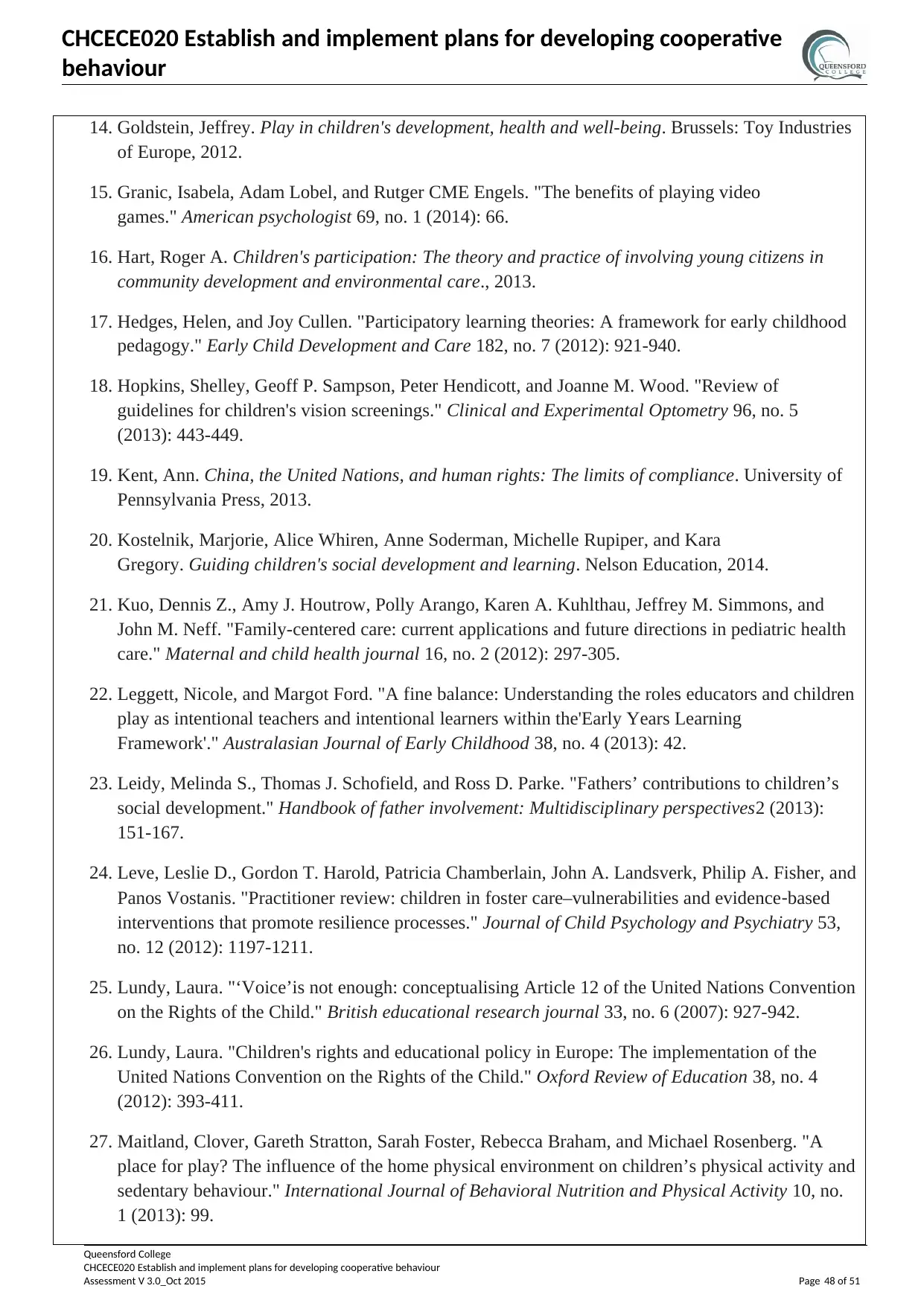
CHCECE020 Establish and implement plans for developing cooperative
behaviour
14. Goldstein, Jeffrey. Play in children's development, health and well-being. Brussels: Toy Industries
of Europe, 2012.
15. Granic, Isabela, Adam Lobel, and Rutger CME Engels. "The benefits of playing video
games." American psychologist 69, no. 1 (2014): 66.
16. Hart, Roger A. Children's participation: The theory and practice of involving young citizens in
community development and environmental care., 2013.
17. Hedges, Helen, and Joy Cullen. "Participatory learning theories: A framework for early childhood
pedagogy." Early Child Development and Care 182, no. 7 (2012): 921-940.
18. Hopkins, Shelley, Geoff P. Sampson, Peter Hendicott, and Joanne M. Wood. "Review of
guidelines for children's vision screenings." Clinical and Experimental Optometry 96, no. 5
(2013): 443-449.
19. Kent, Ann. China, the United Nations, and human rights: The limits of compliance. University of
Pennsylvania Press, 2013.
20. Kostelnik, Marjorie, Alice Whiren, Anne Soderman, Michelle Rupiper, and Kara
Gregory. Guiding children's social development and learning. Nelson Education, 2014.
21. Kuo, Dennis Z., Amy J. Houtrow, Polly Arango, Karen A. Kuhlthau, Jeffrey M. Simmons, and
John M. Neff. "Family-centered care: current applications and future directions in pediatric health
care." Maternal and child health journal 16, no. 2 (2012): 297-305.
22. Leggett, Nicole, and Margot Ford. "A fine balance: Understanding the roles educators and children
play as intentional teachers and intentional learners within the'Early Years Learning
Framework'." Australasian Journal of Early Childhood 38, no. 4 (2013): 42.
23. Leidy, Melinda S., Thomas J. Schofield, and Ross D. Parke. "Fathers’ contributions to children’s
social development." Handbook of father involvement: Multidisciplinary perspectives2 (2013):
151-167.
24. Leve, Leslie D., Gordon T. Harold, Patricia Chamberlain, John A. Landsverk, Philip A. Fisher, and
Panos Vostanis. "Practitioner review: children in foster care–vulnerabilities and evidence‐based
interventions that promote resilience processes." Journal of Child Psychology and Psychiatry 53,
no. 12 (2012): 1197-1211.
25. Lundy, Laura. "‘Voice’is not enough: conceptualising Article 12 of the United Nations Convention
on the Rights of the Child." British educational research journal 33, no. 6 (2007): 927-942.
26. Lundy, Laura. "Children's rights and educational policy in Europe: The implementation of the
United Nations Convention on the Rights of the Child." Oxford Review of Education 38, no. 4
(2012): 393-411.
27. Maitland, Clover, Gareth Stratton, Sarah Foster, Rebecca Braham, and Michael Rosenberg. "A
place for play? The influence of the home physical environment on children’s physical activity and
sedentary behaviour." International Journal of Behavioral Nutrition and Physical Activity 10, no.
1 (2013): 99.
Queensford College
CHCECE020 Establish and implement plans for developing cooperative behaviour
Assessment V 3.0_Oct 2015 Page 48 of 51
behaviour
14. Goldstein, Jeffrey. Play in children's development, health and well-being. Brussels: Toy Industries
of Europe, 2012.
15. Granic, Isabela, Adam Lobel, and Rutger CME Engels. "The benefits of playing video
games." American psychologist 69, no. 1 (2014): 66.
16. Hart, Roger A. Children's participation: The theory and practice of involving young citizens in
community development and environmental care., 2013.
17. Hedges, Helen, and Joy Cullen. "Participatory learning theories: A framework for early childhood
pedagogy." Early Child Development and Care 182, no. 7 (2012): 921-940.
18. Hopkins, Shelley, Geoff P. Sampson, Peter Hendicott, and Joanne M. Wood. "Review of
guidelines for children's vision screenings." Clinical and Experimental Optometry 96, no. 5
(2013): 443-449.
19. Kent, Ann. China, the United Nations, and human rights: The limits of compliance. University of
Pennsylvania Press, 2013.
20. Kostelnik, Marjorie, Alice Whiren, Anne Soderman, Michelle Rupiper, and Kara
Gregory. Guiding children's social development and learning. Nelson Education, 2014.
21. Kuo, Dennis Z., Amy J. Houtrow, Polly Arango, Karen A. Kuhlthau, Jeffrey M. Simmons, and
John M. Neff. "Family-centered care: current applications and future directions in pediatric health
care." Maternal and child health journal 16, no. 2 (2012): 297-305.
22. Leggett, Nicole, and Margot Ford. "A fine balance: Understanding the roles educators and children
play as intentional teachers and intentional learners within the'Early Years Learning
Framework'." Australasian Journal of Early Childhood 38, no. 4 (2013): 42.
23. Leidy, Melinda S., Thomas J. Schofield, and Ross D. Parke. "Fathers’ contributions to children’s
social development." Handbook of father involvement: Multidisciplinary perspectives2 (2013):
151-167.
24. Leve, Leslie D., Gordon T. Harold, Patricia Chamberlain, John A. Landsverk, Philip A. Fisher, and
Panos Vostanis. "Practitioner review: children in foster care–vulnerabilities and evidence‐based
interventions that promote resilience processes." Journal of Child Psychology and Psychiatry 53,
no. 12 (2012): 1197-1211.
25. Lundy, Laura. "‘Voice’is not enough: conceptualising Article 12 of the United Nations Convention
on the Rights of the Child." British educational research journal 33, no. 6 (2007): 927-942.
26. Lundy, Laura. "Children's rights and educational policy in Europe: The implementation of the
United Nations Convention on the Rights of the Child." Oxford Review of Education 38, no. 4
(2012): 393-411.
27. Maitland, Clover, Gareth Stratton, Sarah Foster, Rebecca Braham, and Michael Rosenberg. "A
place for play? The influence of the home physical environment on children’s physical activity and
sedentary behaviour." International Journal of Behavioral Nutrition and Physical Activity 10, no.
1 (2013): 99.
Queensford College
CHCECE020 Establish and implement plans for developing cooperative behaviour
Assessment V 3.0_Oct 2015 Page 48 of 51
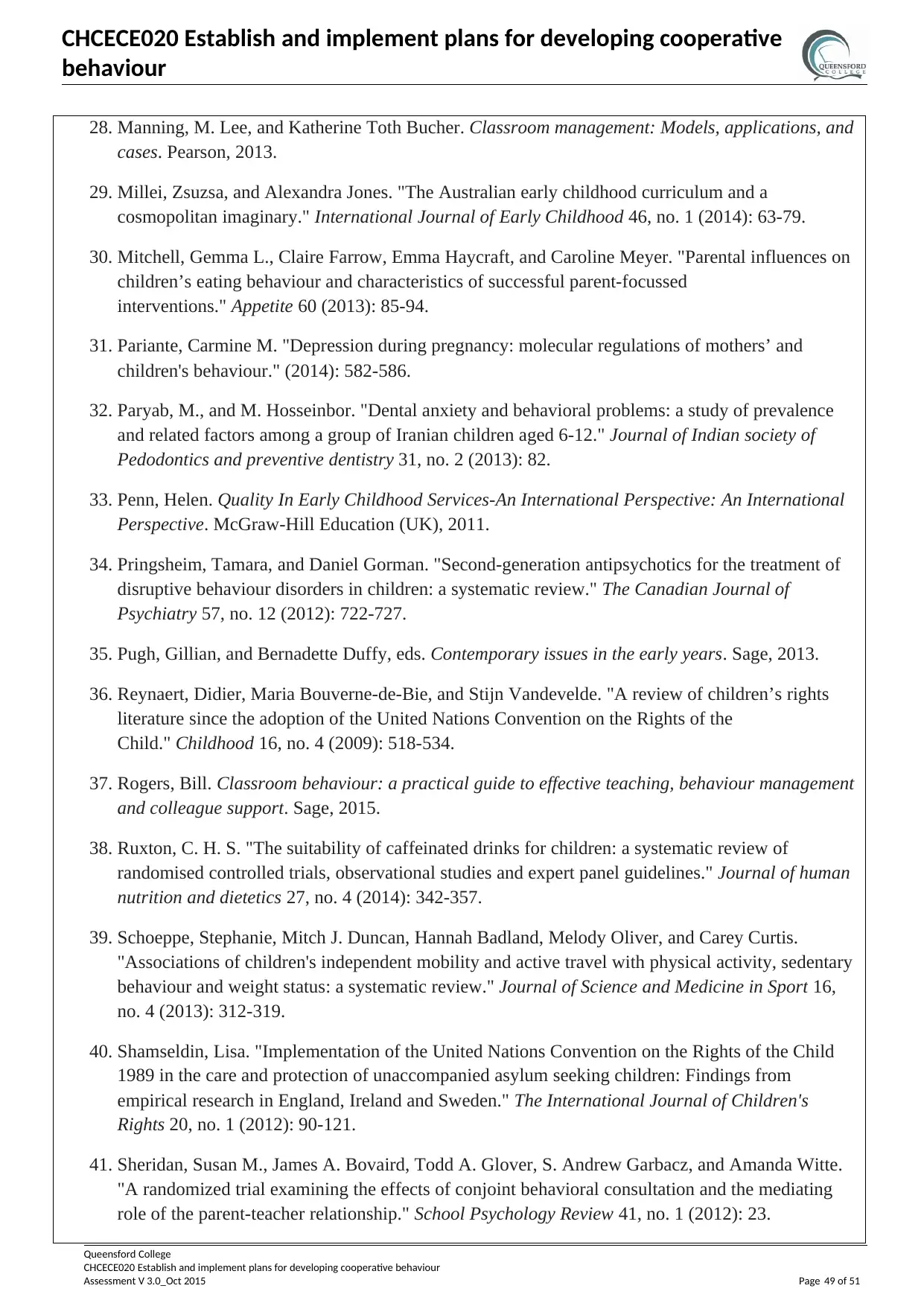
CHCECE020 Establish and implement plans for developing cooperative
behaviour
28. Manning, M. Lee, and Katherine Toth Bucher. Classroom management: Models, applications, and
cases. Pearson, 2013.
29. Millei, Zsuzsa, and Alexandra Jones. "The Australian early childhood curriculum and a
cosmopolitan imaginary." International Journal of Early Childhood 46, no. 1 (2014): 63-79.
30. Mitchell, Gemma L., Claire Farrow, Emma Haycraft, and Caroline Meyer. "Parental influences on
children’s eating behaviour and characteristics of successful parent-focussed
interventions." Appetite 60 (2013): 85-94.
31. Pariante, Carmine M. "Depression during pregnancy: molecular regulations of mothers’ and
children's behaviour." (2014): 582-586.
32. Paryab, M., and M. Hosseinbor. "Dental anxiety and behavioral problems: a study of prevalence
and related factors among a group of Iranian children aged 6-12." Journal of Indian society of
Pedodontics and preventive dentistry 31, no. 2 (2013): 82.
33. Penn, Helen. Quality In Early Childhood Services-An International Perspective: An International
Perspective. McGraw-Hill Education (UK), 2011.
34. Pringsheim, Tamara, and Daniel Gorman. "Second-generation antipsychotics for the treatment of
disruptive behaviour disorders in children: a systematic review." The Canadian Journal of
Psychiatry 57, no. 12 (2012): 722-727.
35. Pugh, Gillian, and Bernadette Duffy, eds. Contemporary issues in the early years. Sage, 2013.
36. Reynaert, Didier, Maria Bouverne-de-Bie, and Stijn Vandevelde. "A review of children’s rights
literature since the adoption of the United Nations Convention on the Rights of the
Child." Childhood 16, no. 4 (2009): 518-534.
37. Rogers, Bill. Classroom behaviour: a practical guide to effective teaching, behaviour management
and colleague support. Sage, 2015.
38. Ruxton, C. H. S. "The suitability of caffeinated drinks for children: a systematic review of
randomised controlled trials, observational studies and expert panel guidelines." Journal of human
nutrition and dietetics 27, no. 4 (2014): 342-357.
39. Schoeppe, Stephanie, Mitch J. Duncan, Hannah Badland, Melody Oliver, and Carey Curtis.
"Associations of children's independent mobility and active travel with physical activity, sedentary
behaviour and weight status: a systematic review." Journal of Science and Medicine in Sport 16,
no. 4 (2013): 312-319.
40. Shamseldin, Lisa. "Implementation of the United Nations Convention on the Rights of the Child
1989 in the care and protection of unaccompanied asylum seeking children: Findings from
empirical research in England, Ireland and Sweden." The International Journal of Children's
Rights 20, no. 1 (2012): 90-121.
41. Sheridan, Susan M., James A. Bovaird, Todd A. Glover, S. Andrew Garbacz, and Amanda Witte.
"A randomized trial examining the effects of conjoint behavioral consultation and the mediating
role of the parent-teacher relationship." School Psychology Review 41, no. 1 (2012): 23.
Queensford College
CHCECE020 Establish and implement plans for developing cooperative behaviour
Assessment V 3.0_Oct 2015 Page 49 of 51
behaviour
28. Manning, M. Lee, and Katherine Toth Bucher. Classroom management: Models, applications, and
cases. Pearson, 2013.
29. Millei, Zsuzsa, and Alexandra Jones. "The Australian early childhood curriculum and a
cosmopolitan imaginary." International Journal of Early Childhood 46, no. 1 (2014): 63-79.
30. Mitchell, Gemma L., Claire Farrow, Emma Haycraft, and Caroline Meyer. "Parental influences on
children’s eating behaviour and characteristics of successful parent-focussed
interventions." Appetite 60 (2013): 85-94.
31. Pariante, Carmine M. "Depression during pregnancy: molecular regulations of mothers’ and
children's behaviour." (2014): 582-586.
32. Paryab, M., and M. Hosseinbor. "Dental anxiety and behavioral problems: a study of prevalence
and related factors among a group of Iranian children aged 6-12." Journal of Indian society of
Pedodontics and preventive dentistry 31, no. 2 (2013): 82.
33. Penn, Helen. Quality In Early Childhood Services-An International Perspective: An International
Perspective. McGraw-Hill Education (UK), 2011.
34. Pringsheim, Tamara, and Daniel Gorman. "Second-generation antipsychotics for the treatment of
disruptive behaviour disorders in children: a systematic review." The Canadian Journal of
Psychiatry 57, no. 12 (2012): 722-727.
35. Pugh, Gillian, and Bernadette Duffy, eds. Contemporary issues in the early years. Sage, 2013.
36. Reynaert, Didier, Maria Bouverne-de-Bie, and Stijn Vandevelde. "A review of children’s rights
literature since the adoption of the United Nations Convention on the Rights of the
Child." Childhood 16, no. 4 (2009): 518-534.
37. Rogers, Bill. Classroom behaviour: a practical guide to effective teaching, behaviour management
and colleague support. Sage, 2015.
38. Ruxton, C. H. S. "The suitability of caffeinated drinks for children: a systematic review of
randomised controlled trials, observational studies and expert panel guidelines." Journal of human
nutrition and dietetics 27, no. 4 (2014): 342-357.
39. Schoeppe, Stephanie, Mitch J. Duncan, Hannah Badland, Melody Oliver, and Carey Curtis.
"Associations of children's independent mobility and active travel with physical activity, sedentary
behaviour and weight status: a systematic review." Journal of Science and Medicine in Sport 16,
no. 4 (2013): 312-319.
40. Shamseldin, Lisa. "Implementation of the United Nations Convention on the Rights of the Child
1989 in the care and protection of unaccompanied asylum seeking children: Findings from
empirical research in England, Ireland and Sweden." The International Journal of Children's
Rights 20, no. 1 (2012): 90-121.
41. Sheridan, Susan M., James A. Bovaird, Todd A. Glover, S. Andrew Garbacz, and Amanda Witte.
"A randomized trial examining the effects of conjoint behavioral consultation and the mediating
role of the parent-teacher relationship." School Psychology Review 41, no. 1 (2012): 23.
Queensford College
CHCECE020 Establish and implement plans for developing cooperative behaviour
Assessment V 3.0_Oct 2015 Page 49 of 51
Paraphrase This Document
Need a fresh take? Get an instant paraphrase of this document with our AI Paraphraser
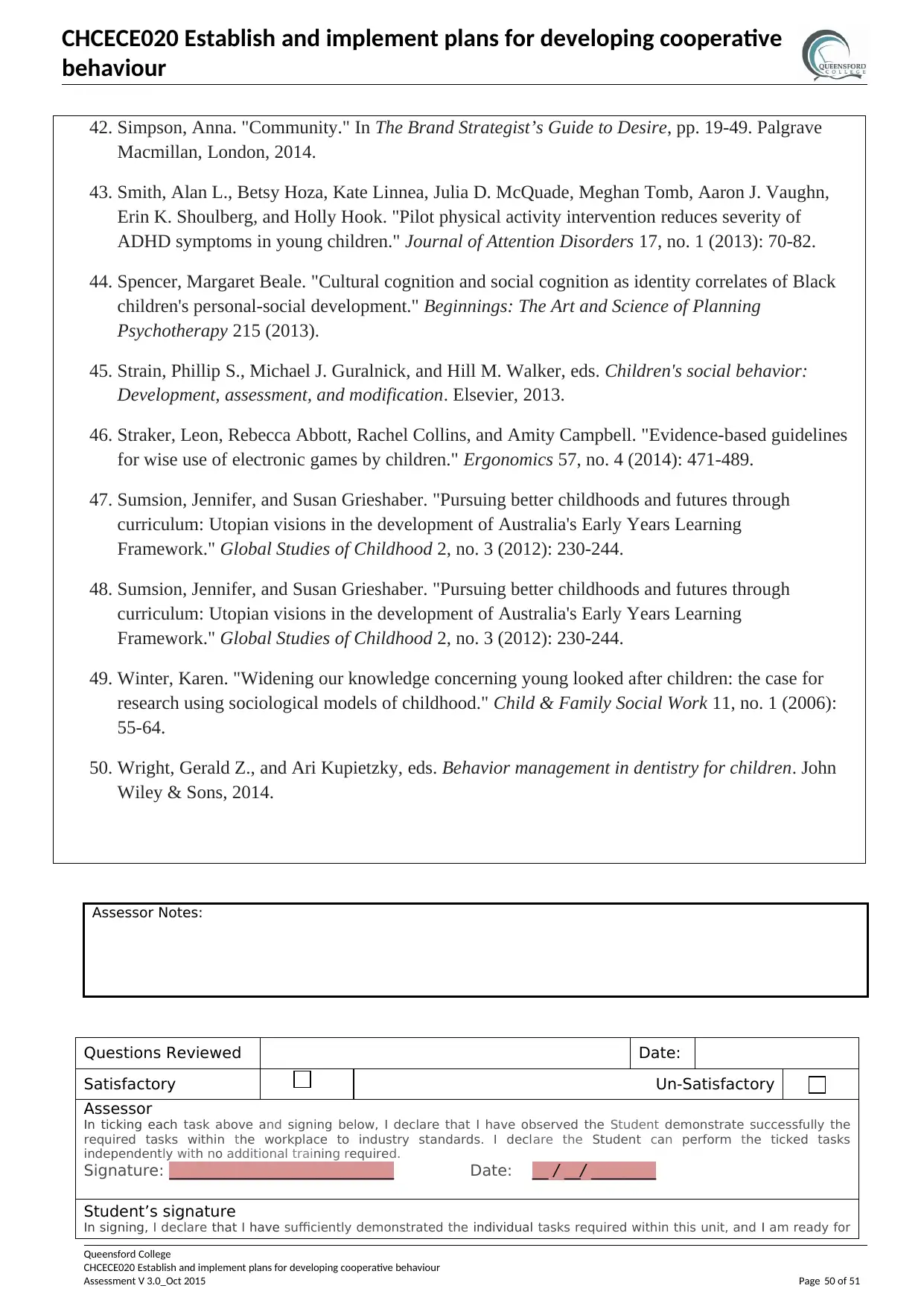
CHCECE020 Establish and implement plans for developing cooperative
behaviour
42. Simpson, Anna. "Community." In The Brand Strategist’s Guide to Desire, pp. 19-49. Palgrave
Macmillan, London, 2014.
43. Smith, Alan L., Betsy Hoza, Kate Linnea, Julia D. McQuade, Meghan Tomb, Aaron J. Vaughn,
Erin K. Shoulberg, and Holly Hook. "Pilot physical activity intervention reduces severity of
ADHD symptoms in young children." Journal of Attention Disorders 17, no. 1 (2013): 70-82.
44. Spencer, Margaret Beale. "Cultural cognition and social cognition as identity correlates of Black
children's personal-social development." Beginnings: The Art and Science of Planning
Psychotherapy 215 (2013).
45. Strain, Phillip S., Michael J. Guralnick, and Hill M. Walker, eds. Children's social behavior:
Development, assessment, and modification. Elsevier, 2013.
46. Straker, Leon, Rebecca Abbott, Rachel Collins, and Amity Campbell. "Evidence-based guidelines
for wise use of electronic games by children." Ergonomics 57, no. 4 (2014): 471-489.
47. Sumsion, Jennifer, and Susan Grieshaber. "Pursuing better childhoods and futures through
curriculum: Utopian visions in the development of Australia's Early Years Learning
Framework." Global Studies of Childhood 2, no. 3 (2012): 230-244.
48. Sumsion, Jennifer, and Susan Grieshaber. "Pursuing better childhoods and futures through
curriculum: Utopian visions in the development of Australia's Early Years Learning
Framework." Global Studies of Childhood 2, no. 3 (2012): 230-244.
49. Winter, Karen. "Widening our knowledge concerning young looked after children: the case for
research using sociological models of childhood." Child & Family Social Work 11, no. 1 (2006):
55-64.
50. Wright, Gerald Z., and Ari Kupietzky, eds. Behavior management in dentistry for children. John
Wiley & Sons, 2014.
Assessor Notes:
Questions Reviewed Date:
Satisfactory Un-Satisfactory
Assessor
In ticking each task above and signing below, I declare that I have observed the Student demonstrate successfully the
required tasks within the workplace to industry standards. I declare the Student can perform the ticked tasks
independently with no additional training required.
Signature: _____________________________ Date: __ / __/ ________
Student’s signature
In signing, I declare that I have sufficiently demonstrated the individual tasks required within this unit, and I am ready for
Queensford College
CHCECE020 Establish and implement plans for developing cooperative behaviour
Assessment V 3.0_Oct 2015 Page 50 of 51
behaviour
42. Simpson, Anna. "Community." In The Brand Strategist’s Guide to Desire, pp. 19-49. Palgrave
Macmillan, London, 2014.
43. Smith, Alan L., Betsy Hoza, Kate Linnea, Julia D. McQuade, Meghan Tomb, Aaron J. Vaughn,
Erin K. Shoulberg, and Holly Hook. "Pilot physical activity intervention reduces severity of
ADHD symptoms in young children." Journal of Attention Disorders 17, no. 1 (2013): 70-82.
44. Spencer, Margaret Beale. "Cultural cognition and social cognition as identity correlates of Black
children's personal-social development." Beginnings: The Art and Science of Planning
Psychotherapy 215 (2013).
45. Strain, Phillip S., Michael J. Guralnick, and Hill M. Walker, eds. Children's social behavior:
Development, assessment, and modification. Elsevier, 2013.
46. Straker, Leon, Rebecca Abbott, Rachel Collins, and Amity Campbell. "Evidence-based guidelines
for wise use of electronic games by children." Ergonomics 57, no. 4 (2014): 471-489.
47. Sumsion, Jennifer, and Susan Grieshaber. "Pursuing better childhoods and futures through
curriculum: Utopian visions in the development of Australia's Early Years Learning
Framework." Global Studies of Childhood 2, no. 3 (2012): 230-244.
48. Sumsion, Jennifer, and Susan Grieshaber. "Pursuing better childhoods and futures through
curriculum: Utopian visions in the development of Australia's Early Years Learning
Framework." Global Studies of Childhood 2, no. 3 (2012): 230-244.
49. Winter, Karen. "Widening our knowledge concerning young looked after children: the case for
research using sociological models of childhood." Child & Family Social Work 11, no. 1 (2006):
55-64.
50. Wright, Gerald Z., and Ari Kupietzky, eds. Behavior management in dentistry for children. John
Wiley & Sons, 2014.
Assessor Notes:
Questions Reviewed Date:
Satisfactory Un-Satisfactory
Assessor
In ticking each task above and signing below, I declare that I have observed the Student demonstrate successfully the
required tasks within the workplace to industry standards. I declare the Student can perform the ticked tasks
independently with no additional training required.
Signature: _____________________________ Date: __ / __/ ________
Student’s signature
In signing, I declare that I have sufficiently demonstrated the individual tasks required within this unit, and I am ready for
Queensford College
CHCECE020 Establish and implement plans for developing cooperative behaviour
Assessment V 3.0_Oct 2015 Page 50 of 51
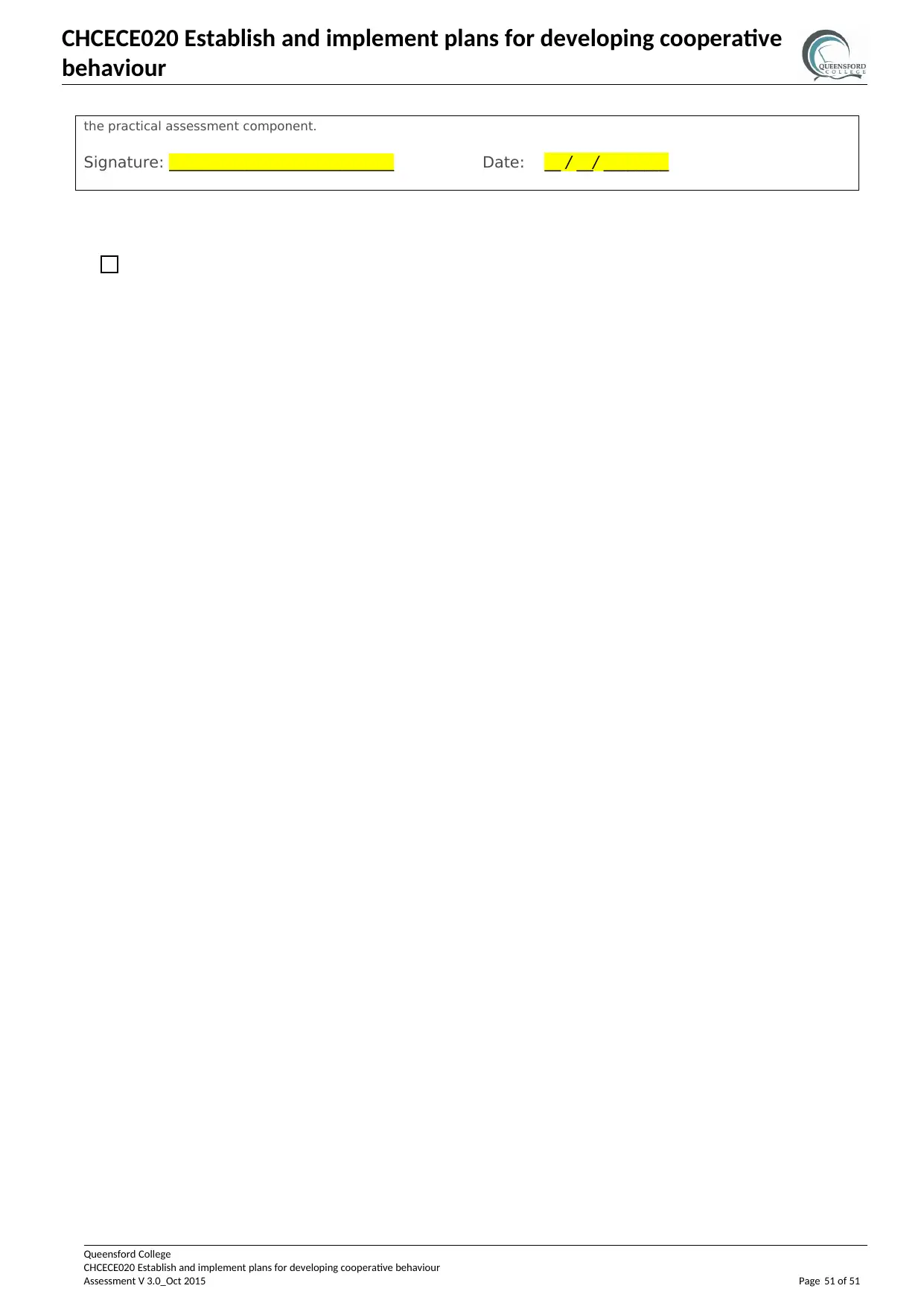
CHCECE020 Establish and implement plans for developing cooperative
behaviour
the practical assessment component.
Signature: _____________________________ Date: __ / __/ ________
Queensford College
CHCECE020 Establish and implement plans for developing cooperative behaviour
Assessment V 3.0_Oct 2015 Page 51 of 51
behaviour
the practical assessment component.
Signature: _____________________________ Date: __ / __/ ________
Queensford College
CHCECE020 Establish and implement plans for developing cooperative behaviour
Assessment V 3.0_Oct 2015 Page 51 of 51
1 out of 51
Related Documents
Your All-in-One AI-Powered Toolkit for Academic Success.
+13062052269
info@desklib.com
Available 24*7 on WhatsApp / Email
![[object Object]](/_next/static/media/star-bottom.7253800d.svg)
Unlock your academic potential
© 2024 | Zucol Services PVT LTD | All rights reserved.





